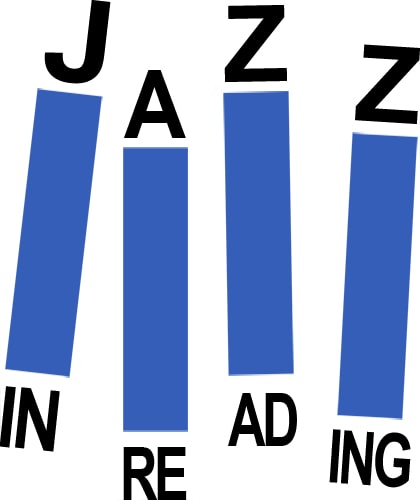Reviews of Past Gigs
Jazz at Progress | The Alex Hitchcock Quartet
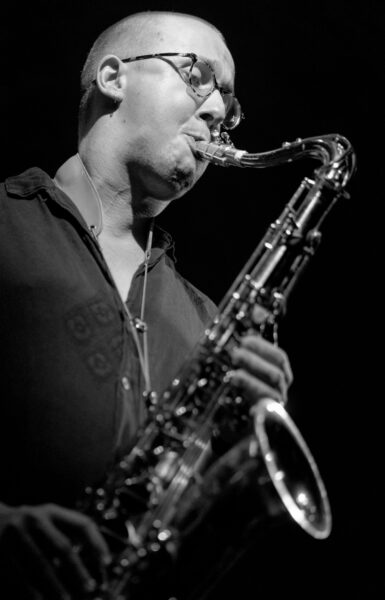
Progress Theatre, Reading, Friday 2 January 2026
Alex Hitchcock tenor sax
Will Barry piano
Freddie Jensen bass
James Maddren drums
A warm festive welcome from a full house greeted Alex Hitchcock and his fellow musicians as they took to the stage on 2 January to open a new year of Jazz at Progress. It brought back memories of Hitchcock’s first appearance as a band leader at Progress in September 2017. Then as now, Bob Draper promoted the gig and served as MC. ‘This is going to be a special evening,’ he announced on that occasion. ‘This young man really impressed me when I saw him playing a short while ago and I thought, “We must have him play at Reading”. Ladies and gentlemen, he’ll have you on the edge of your seats … Alex Hitchcock!’
Alex lived up to the promise and more, enthralling the audience with his virtuosity and the range of his musical imagination and capturing their hearts with the quiet, self-effacing qualities of his stage manner.
His career took off at a pace and by the time of his next visit to Progress in 2022, with a brilliant quartet featuring the remarkable drumming of Myele Manzanza, he was firmly established as one of the leading players/composers on the contemporary jazz scene, having notched up a clutch of nominations for his compositions and recordings in the Novello and Parliamentary Jazz awards, as well as winning the Peter Whittingham Award in 2018 and a major prize at the 2019 Umbria Jazz Festival.
Wider horizons beckoned and in 2023 Alex relocated to further hone his skills in the ultimate testing ground of the jazz world – New York. Since his return home last summer he has packed-in an astonishing amount of activity in a very short space of time: the launch of a new album, ‘Letters from Afar’ at Ronnie Scott’s, three appearances in a variety of formats at the EFG London Jazz Festival as well as (would you believe?) flights to the other side of the world to play at the Wellington Jazz Festival, New Zealand and the Melbourne Jazz Festival, Australia with Myele Manzanza and the international band LVDF … not to mention gigs in Portugal. It’s a measure of the man that he accepted Bob’s invitation to play at Reading, good fortune that he was free and a source of great pride to us all at Jazz at Progress that we’ve borne witness over the years to a flourishing talent of world class stature.
And what a great band Alex assembled for the date – kindred souls in the form of Will Barry, the ‘wizard of the keyboard’, the mighty Freddie Jensen on bass and the masterful James Maddren on drums.
The Progress Theatre is a near-perfect listening environment; whether a band is playing at full throttle or in a gentle whisper, you can discern every sound and immerse yourself in its beauty. ‘Timelessness’, a composition by South African composer and multi-instrumentalist, the late Bheki Mseleku, made an ideal choice to open the gig; a joyful evocation of the sunlit expanses of his South African homeland, spiced with the vitality of the townships, but tinged with the sadness of exile and loss.
‘Units’, the first of six Hitchcock original compositions, immediately put me in mind of Stan Tracey’s classic number ‘Starless and Bible Black’ from his celebrated ‘Under Milk Wood Jazz Suite’. It had similar qualities of stillness and calm, with Hitchcock’s breathy sustained notes and Will Barry’s delicate touch achieving a tremendous emotional effect.
Wayne Shorter’s ‘Toy Tune’ came from the album ‘ETC’, recorded in the fruitful period of the mid-sixties when the saxophonist had just joined Miles Davis and was also recording prolifically under his own name for Blue Note. For reasons best known to Blue Note executives it gathered dust in the label’s vault for fifteen years until its eventual release in 1980. ‘Toy Tune’ is an absolute gem, spacious and airy, a number that gathers an irresistible momentum punctuated by James Maddren’s explosive percussion.
The final number of the first set offered Alex Hitchcock with the opportunity to present his own humorous take on the appointment of Kathleen Corradi as the ‘Rat Tzar’, New York’s first Director of Rodent Migration, a notable event which took place at about the time he arrived in the ‘Big Apple’ in 2023. Will Barry excelled in his role as King Rat.
As one member of the audience commented as he made his way to the bar at the interval, ‘This music takes you into a dream world’. Little did he, or any of us, know what was in store for the second set; forty-five minutes of sublime, timeless invention. With no title announcements to influence your imagination, you literally followed your ear. Yes, you could sense structure and cohesion, but for the most part the music was freely expressed, improvised and utterly compelling. Perhaps a selection of words and phrases that I noted at the time will convey some impression of how it felt to be immersed in this process of creation:
A maelstrom of sound; sweeping; undulating; jarring; haunting; soulful; the mournful dirge conjured by Freddie Jensen on a single string of his bass; exotic hand drumming; a crisp drum roll that would set a New Orleans street parade in motion; reflective; restful; exquisite; floating; telepathic understanding between the musicians; no hint of competition; driving beat; reaching for the sky!
I departed from the evening with a profound feeling that Alex Hitchcock and his fellow musicians had touched the deepest roots of humanity, expressing the reality of the world as they see it, while offering a vision of hope of how it could be. What better way could there be of starting a new year!
As ever, our thanks to the Progress team for their warm hospitality and continued support for Jazz at Progress.
For the record, after the gig Alex was kind enough to give me the titles of the four pieces that made up the second set: ‘With Love’/ ‘Pull of Line’/ ‘Bright White Light’ and ‘Rio’.
Review posted here by kind permission of Trevor Bannister
Janette Mason – Rewired | December 2025
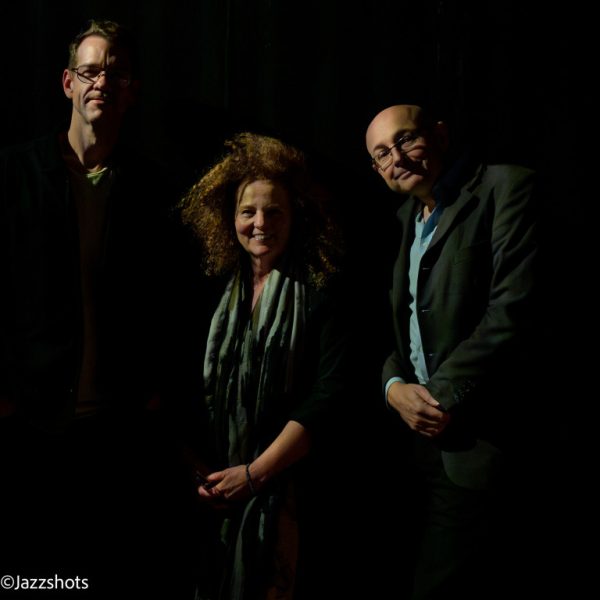
Progress Theatre, Reading Friday 5 December 2025
Janette Mason keyboard | Tom Mason bass | Eric Ford drums
On a filthy night of rain, wind and cold to match anything we have suffered recently, the loyal devotees of Jazz at Progress turned up in force to welcome Janette Mason and her trio to the Progress Theatre for a performance of her much anticipated ‘ReWired’ project. They were not to be disappointed. Janette, a nominee for Best Jazz Instrumentalist in the prestigious 2025 Parliamentary Jazz Awards, is a force of nature whose warmth, creative energy and invention lifts spirits to the heights and leaves everyone with a buzzing feeling of wellbeing.
Janette opened this celebration of her life and musical career in show-stopping form with a tantalising rendition of the Zombies smash hit ‘She’s Not There’. Did 1964, the year of its release, carry any special personal significance I wondered? Growing up in in a musical household steeped in a love for jazz and the Great American Songbook, Janette took to the piano under her mother’s guiding eye and was soon drawing inspiration from the likes of Erroll Garner and Oscar Peterson. Echoes of both found there way into the next two numbers – Garner’s mischievious, ‘now-it’s- here/now-it’s-gone’ way of toying with the melody of Rodgers and Hart’s classic ‘Bewitched, Bothered and Bewildered’ and the delicate touch coupled with powerhouse swing of Oscar Peterson in ‘Do Nothin’ Till You Hear From Me’. But most of all it was Janette’s own unique approach to playing, a prodigious free-flowing technique coupled with a deep feeling for the music, that impressed, along with the superb support of her long-term associates Tom Mason and Eric Ford.
The advent of punk and synth-pop captured Janette’s imagination in the late 1970’s and took her musical interests in a new direction with visits to the Marquee in the appropriate gear of the day. Gary Numan’s foundation shaking ‘Cars’ vividly recalled those heady days of safety pins and early electronic wizardry.
‘Mae’s Song’, paid a fitting tribute to Janette’s late mother. Once a professional musician herself, touring the dance halls and variety theatres of the nation as a member of the groundbreaking all-female band led by trumpeter Gracie Cole, she exerted an enduring influence on her daughter’s career which found full expression in this beautifully reflective piece.
Janette discovered David Bowie via a visit to the cinema to watch ’The Man Who Fell to Earth’. Little did she realise, or even dare to imagine, that one day she would audition for Bowie’s legendary producer, Tony Visconti and become the keyboard player in his band Holy, Holy. A sharp intake of breath from the audience accompanied the instantly recognisable opening notes of ‘Ashes to Ashes’, a brilliantly conceived and wonderfully meandering tribute to the great David Bowie.
The ReWired project is a true coming-together of kindred spirits, musically and in heart, mind and soul. The extraordinary rapport between the musicians was at its most palpable during Lane Del Ray’s ‘Video Games’ which rounded off the first set. Tom Mason’s sublime bass lines fused with Eric Ford’s percussion to add rich tonal colouring to Janette’s dream-like inventions at the keyboard. Perfect!
The intimacy of the Progress Theatre provided the perfect setting for Janette’s solo outing which opened the second set and Noel Gallagher’s ‘Don’t Look Back in Anger’, the perfect choice of number; a backward glance to the time she spent as keyboardist with the super-group Oasis. However thrilling it must have been to perform at the world’s great venues in front of audiences numbering tens of thousands, on this little stage she could feel comfortably at home, stretch out and see where her imagination might take her. And the spellbound audience could feel part of the magical creative process we call jazz.
Eric Ford’s studious demeanour belies the ‘fire in his soul’ as a percussionist. It’s an adage borrowed from the distant days of swing bands, but Eric really ‘set the pots boiling’, especially so on David Bowie’s ‘John I’m Only Dancing’. What’s more, you have the feeling that he’s holding power in reserve, which makes his playing even more exciting … and yet, he never overwhelms the ensemble or overstays his welcome.
An exquisite interpretation of ‘The Man with the Child in His Eyes’, written by Kate Bush at the tender age of thirteen, led seamlessly into Janette’s own heartfelt message of hope, ‘Prayer for the Planet’.
It was great to see that George Shearing figured in Janette’s ‘Pantheon’ of early jazz influences. The blind, British-born pianist found success in the USA with a richly harmonic approach to playing that earned him a huge following, plus the award of a Knighthood from Her Majesty Queen Elizabeth II in 2006. Janette took ‘Lullaby of Birdland’ at a pace, swapping the melodic line with Tom Mason’s bass to tremendous effect and setting up a groove that transported the number from its 1950s origins to the full-on blast of the twenty-first century.
Interestingly, Derek Johnson, reviewing the release of ‘Eleanor Rigby’ as a single for NME in 1966, commented that ‘it lacked the immediate appeal of “Yellow Submarine” but possessed lasting value’.
He was spot on with his judgement and in the eloquent hands of Janette Mason and company one could see why.
Janette’s celebration of her life and musical career ended with a rolled-into-one rocking finale and encore – a pulsating, exhilarating, breathtaking, ‘Sweet Dreams (Are Made of This)’ – a smash hit for the Eurythmics (Annie Lennox and Dave Stewart) in 1983. WOW!
As ever, our thanks to the Progress house team for their warm hospitality, especially welcome on such an inclement night, and to Rich and Joe in the ‘broom cupboard’ for the excellent quality of the sound and lighting.
Review posted here by kind permission of Trevor Bannister
Photo by Steve Foster @jazzshots (Instagram & FB)
The Freddie Gavita Quartet in Homage to Freddie Hubbard – November 2025
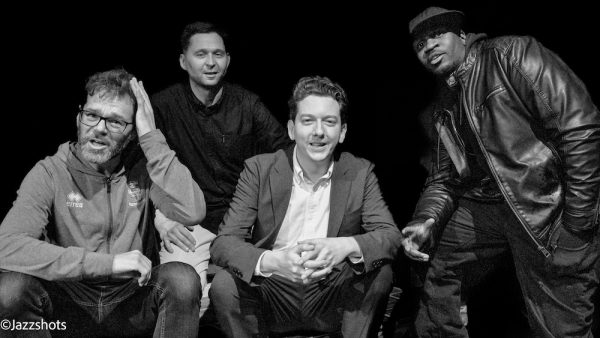
Progress Theatre, Reading Friday 7 November 2025
Freddie Gavita trumpet & flugelhorn
Tom Cawley keys
Daniel Casimir bass
Mez Clough drums
“By far and away the most awesome technician ever to play jazz trumpet” – jazz trumpeter and writer John McNeil’s assessment of Freddie Hubbard. His namesake explored Hubbard’s music and his progress as a composer and performer.
The quartet opened with an early Hubbard composition, ‘Birdlike’ – a fast, typical bop blues. Freddie’s fluent trumpet improvisation followed the theme, and then solos from keyboards, and bass, before the players exchanged choruses.
Freddie suggested the next piece, ‘Osie Mae’, was a kind of audition for Hubbard at this early stage of his career. A relaxed groove, it put you in mind of the funky minor, medium tempo numbers of Art Blakey’s 1960s bands. Tom Cawley’s solo at times recalled Bobby Timmon’s driving improvisations with that band.
Moving from his home town Indianapolis to New York, Hubbard had connected with leading jazz artists, and was recommended to be signed by Blue Note records. From this period came the first ballad of the evening, Hoagy Carmichael and Johnny Mercer’s beautiful ‘Skylark’. A short piano intro led us into the trumpet theme statement, played over an effective ‘broken swing’ rhythm section. Among fine solos, a very expressive Daniel Casimir solo stood out.
Another ballad, Coots & Gillespie’s ‘You Go to My Head’, followed, but interpreted here at a brisk tempo. The original Bill Evans recording featured a “weird” introduction, which was echoed here in a free collective improvisation. Mez Clough’s focussed and colourful drum solo came after contributions from keyboard and trumpet.
Herbie Hancock wrote just the first four bars of his ‘One Finger Snap’, leaving the rest as chord symbols. Hubbard’s original solo on these chords then came to be the standard melody. Freddie invented an intricate solo, on repeated motifs, developing logically through the chord structure. Tom followed Freddie with bell-like chords to start his own solo. A crisp drum solo, exploring the kit, handed the lead back to trumpet. Behind a constant rhythm, a held note neatly took us into the catchy opening figures of Hancock’s ‘Cantaloupe Island’. After a trumpet solo from Freddie, the first set closed with the brief staccato motif from the tune.
Hubbard appeared again on Wayne Shorter’s ‘Witch Hunt’ – a deceptively simple tune, based on a short three-note figure. In the ensemble, the band skilfully varied the dynamics, and brought out the ‘punches’ expertly. Freddie’s solo toyed with trills, shakes, and percussive lines. The keyboard solo started in a relaxed mood and moved into more rhythmically complex areas. It’s beautiful to hear, as in Tom’s, a solo conclude with a restatement of a few bars of the melody.
‘Up Jumped Spring’ is probably one of the most famous jazz waltzes – and surely one of the prettiest. Freddie switched to flugelhorn for this one. All the players created lyrical interpretations in their solos, but Daniel Casimir gave an outstanding improvisation, which seemed to have the rise and fall of speech.
Hubbard left Blue Note records and signed in 1970 to the CTI label. ‘First Light’ marked a change of style to a more rock-jazz feel, so popular in that decade. Another example of collective introduction (described by Freddie as “a seventies mess around”) led us into this piece. Distortion, echo, and electronic effects on keyboard set up an authentic atmosphere. A funky piano vamp was followed by the minor theme, based, typically for this period, on a few notes. Freddie, returning to trumpet, soloed first, followed by keyboards and bass. The number concluded with a neat transition into an excerpt from the melody of Hubbard’s ‘Little Sunflower’.
Several jazz musicians have composed tributes to the great innovator John Coltrane. (The previous Jazz in Reading concert included Elvin Jones’s). Hubbard’s ‘Dear John’ is based on the notoriously difficult chord sequence of Coltrane’s ‘Giant Steps’. Freddie’s flugel solo had a warm lyrical feeling, and the bass improvisation moved round the complicated structure so smoothly.
Returning, for the final number, to the CTI era, Freddie chose ‘Red Clay’. Starting with another “seventies mess around”, it launched with a drum intro, joined by keyboards, bass and then trumpet. Another funky number, electronics effects from piano, ‘free’ ensemble – perhaps reminiscent of Miles Davis ‘Bitches Brew’ recorded the year before? On this final piece, we again enjoyed the virtuoso solo and ensemble playing of all the band.
An almost full theatre had clearly enjoyed the concert immensely, reflected in the enthusiastic applause as Freddie and the band left the stage.
Many thanks to the hard work of the Jazz in Reading team, Bob, Jim, Paul and Trevor, for keeping live Jazz at the Progress thriving in Reading!
Grateful appreciation to our kind hosts, the volunteers at the Progress Theatre, who provide the sound, lighting, and hospitality to support these fine concerts.
Review posted here by kind permission of Clive Downs
Photo by Steve Foster @jazzshots (Instagram & FB)
Chris Biscoe’s Profiles Quartet – October 2025
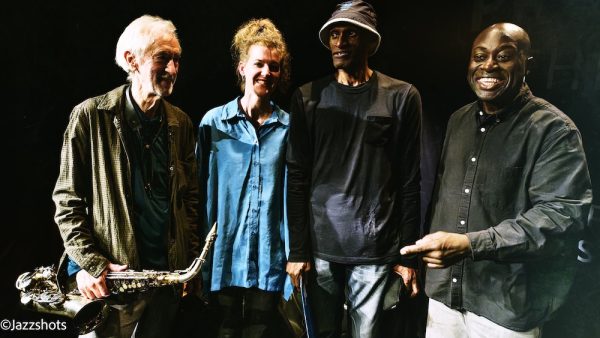
Progress Theatre, Reading Friday 10 October 2025
Chris Biscoe alto saxophone & alto clarinet, Alcyona Mick piano
Larry Bartley bass, Winston Clifford, drums.
A truly inspired performance by the latest edition of Chris Biscoe’s Profiles Quartet, on its first public outing, launched a new season of Jazz at Progress on Friday 10 October. With the leader’s creativity and freedom of expression and Larry Bartley’s majestic bass maintaining the continuity of earlier Profiles’ projects, newcomers Alcyona Mick and Winston Clifford, added a new and hugely exciting dimension to the mix. One might describe the band as ‘custom made’ to explore the wiles and whims, rage and defiance, love and friendship, plus all manner of idiosyncrasies, immortalised in the legion of jazz compositions dedicated to people and even a ‘toilet trained cat’.
Winston Clfford’s crisp drum roll opened the curtain on the very personal world inhabited by Thelonious Monk and his seemingly off-kilter portrait of his niece Jackie Smith. ‘Jackie-ing’, catches you unaware. How can so much be going on with what seems to be such a simple little tune? Logic tells you that nothing should fit together. But it does and before long Monk’s wry humour and the warmth of his swinging heartbeat, expressed so brilliantly by the four members of the band, has completely won you over.
In complete contrast to the cliff-hanging suspense of ‘Jackie-iing’, ‘Magic Meg’, from the pen of Biscoe’s good friend and associate Pete Hurt, swung like the clappers in a joyous romp reminiscent of Sonny Rollins’ ‘St Thomas’.
The alto clarinet is an instrument of graceful beauty with a sound to match. In the hands of Chris Biscoe it has an emotive force that brings tears to the eyes, perfectly fitting to Charles Mingus’ elegy to Lester Young, ‘Goodbye Pork Pie Hat’.
Mandy Rice Davies, a characterful figure in the notorious Profumo Affair of 1963, coined a phrase which has since taken its way into regular usage as well as the Oxford Book of Quotations . When told in court that Lord Astor denied her claim that they had ‘slept together’, she replied, ‘Well he would, wouldn’t he!’ Taking inspiration from her defiance, Chris reshaped Monk’s classic ‘Well You Needn’t’ to ‘Well He Would’, with Alcyona Mick’s sharply defined keyboard figures aimed directly at the ‘Establishment’ of that, and any other day.
In ‘Blues for Terenzi’, Chris Biscoe summoned an extraordinary range of sounds on the alto clarinet to pay a deeply moving tribute to one of his ‘favourite musicians’, the late Danilol Terenzi and the tune’s composer Mike Westbrook. Winston Clifford’s delicate hand-drumming and Larry Bartley’s sublime bass underpinned the feeling of quiet contemplation.
The reflective qualities of ‘Blues for Terenzi’ segued seamlessly into ‘Dear John C’, to close the first set with Elvin Jones’ passionate tribute to his erstwhile leader and inspirational force, John Coltrane. Steve Foster’s fantastic images, to be found in the Gallery capture the intensity of the moment far better than any words I can express.
The enduring legacy of Eric Dolphy lived on in the choice of the first three tunes in the second set*, each portraying a different facet of his complex musical personality. Dolphy, the composer and leader, was represented by ‘Miss Ann’, a free-flowing joyride featuring the compelling piano of Alcyone Mick and explosive percussion of Winston Clifford. ‘Mendacity’, attributed to drummer/Civil Rights activist, Max Roah and recorded with a vocal on his ’Percussion Bitter Sweet’ album, explored very different, unsettling territory, which I can best liken to Billie Holiday’s ‘Strange Fruit’. Chris Biscoe’s range of incredible tonal effects, the interplay between piano and bass, and the sensitive support of Winston Clifford, combined to produce a performance of stunning emotional power.
To round off the tribute to Eric Dolphy, the band faithfully replicated the dark, sardonic humour of Charles Mingus’ recording of ‘Fables of Faubus’ from 1960, in which Dolphy played a leading role. One could sense the power of Mingus’ voice as he vented his rage against the iniquities of American society represented by the notorious Orval Faubus, one-time Governor of Arkansas.
The blues/gospel tinged ‘Pussy Cat Dues’ left one in no doubt that Charles Mingus may rent and rage, but the real boss of his household was the ‘well trained’ cat which sat on a lavatory seat to have its picture taken for the cover of ‘The Charles Mingus CAT-alog To Toilet Train Your Cat’. More here
At the conclusion of ‘Sweet Pea’, Chris Biscoe’s evocation of Billy Strayhorn, I noted one word, ‘Superb’
A full-spirited ‘Monk’s Dream’ brought the concert full circle with a return to Thelonious Monk for the seemingly final number of the evening. But no, with an enthusiastic audience clamouring for more and time in hand, Chris obliged with an encore. Not the usual fare of a rousing blues or familiar standard, but an extended and spellbinding presentation of Charles Mingus’ tribute to Charlie Parker, ’Reincarnation of a Lovebird’. What a privilege to be privy to such a magnificent and totally unexpected performance!
Our thanks to Stuart McCubbin and his team of volunteers who provide such welcoming hospitality at the Progress Theatre and to Rich Saunders and his assistant for the excellent quality of sound and lighting.
Anyone interested in becoming a volunteer should contact info@jazzinreading.com Your help will be greatly appreciated!
And finally a footnote … At the beginning of the second set Chris Biscoe briefly left the stage to recover his glasses from the dressing room. A quick off the mark Winston Clifford filled the vacuum by holding three fingers in the air. ‘There are only three types of drummers,’ he announced. ‘Those that can count and those that can’t!’
Review posted here by kind permission of Trevor Bannister
Photo by Steve Foster @jazzshots (Instagram & FB)
Emily Masser Quartet – June 2025
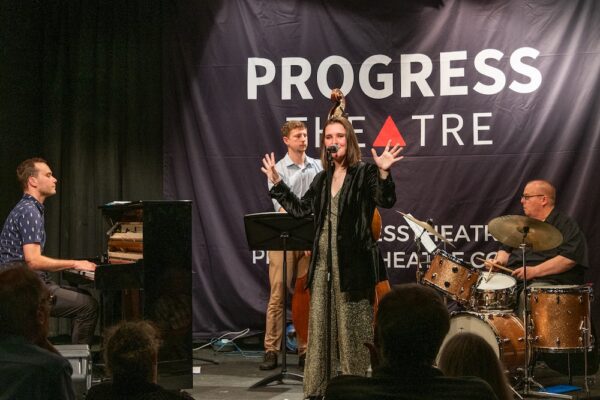
Progress Theatre, Reading Friday 27 June 2025
Emily Masser vocals, Matyas Gayer piano, James Owston bass, Mark Taylor drums
The remarkable Emily Masser has an irresistible stage presence which held the Jazz at Progress audience utterly captivated on Friday 27 June from the first moment of her appearance to her departure amid rapturous applause; two hours and thirteen songs later.
Perhaps it’s no surprise. One has the feeling that Emily was born to perform. The offspring of a musical family – her father is saxophonist and jazz educator Dean Masser – Emily had mastered almost every instrument in sight by her teenage years, before concentrating her recent studies at Guildhall School of Music on singing and saxophone. But there are some qualities that you can’t learn at ‘school’ and here lies the essence of Emily’s appeal. She simply exudes with personality – joyful enthusiasm, the candour of her home town of Wigan, generosity and a work ethic that leaves you breathless. How could you not be bowled over by this talented young lady of just twenty-one years.
Even the record-breaking temperatures couldn’t curb Emily’s enthusiasm and she set a breakneck tempo to launch the evening with a Latin-tinged ‘Old Devil Moon’, the Burton Lane/ Yip Harburg favourite from the hit Broadway show ‘Finian’s Rainbow’. She negotiated the lyrics perfectly and with crystalline clarity, adding an exciting scat chorus before handing the mantle to her sublime rhythm section. Hungarian born, Matyas Gayer, whose career has included periods of study in Austria as well as work on the New York jazz scene, is an elegantly inventive pianist in the tradition of Hank Jones and Tommy Flanagan, with a distinctive touch that immediately captures the imagination. James Owston, a finalist in the 2018 BBC Young Jazz Musician of the Year Competition, is no stranger to Progress audiences, having performed with Xhosa Cole, Clark Tracey and Gaz Hughes. His playing simply becomes more compelling on each visit. Mark Taylor, dep for the advertised Steve Brown, brought his wealth of experience from twenty-five years playing in New York with such legends as Monty Alexander and Kenny Barron, to keep things tightly swinging from the drum chair.
Emily followed through with another straight-ahead swinger in the form of Lerner and Lowe’s ‘Almost Like Being in Love’, before using her own lyrics to transform Bobby Timmon’s soulful classic ‘Dat Dere’ into a dedication to close friends, her second family. It worked beautifully, retaining the feel of the original tune, while expressing the emotions and good humour of a treasured relationship.
‘The Boy Next Door’ evoked images of the great Judy Garland in the heyday of her early movie career in ‘Meet Me in St Louis’. The changes in time from 3/4 to 4/4 kept everyone on their toes.
Could there have been a better choice of song for an evening of almost insufferable heat than Jobin’s ‘Double Rainbow’? Oh, how we long for the sound and touch of the gentle rainfall that its lyrics conjure and which Emily expressed so perfectly with the ‘mystical’ support of the rhythm section.
‘My One and Only Love’ has long been a favourite of jazz musicians since it was first recorded in 1953, notably the 1963 collaboration between John Coltrane and vocalist Johnny Hartman. Played at walking pace, it featured the exquisite bass of James Owston.
As a prelude to the closing tune of the first set, Emily sought a vote from the audience – would we like Jobin’s ‘No More Blues’, to be sung in English or as ‘Chega de Saudade’ in Portugues. A resounding show of hands voted for Portuguese, to which Emly retorted, ‘It doesn’t really make any difference, because I make up the words anyway.’ Not true. She took the song at a brisk pace in flawless Portuguese, followed by a scat chorus which gave her full creative rein to invent any words or sounds she liked. A joyous ending to the first set.
I have to admit that I’ve never been a great fan of vocalese. While I could respect the skill and invention involved in the vocal gymnastics practiced by such performers as Jon Hendricks and Annie Ross in putting words to ‘previously existing instrumental tunes or recorded solos’ (thanks to writer Brian Priestley for that quote), it all seemed a bit too clever by half for my taste. Having said that, I’m pleased that Emily Masser has taken steps to revive what had become a lost art and found her 21st century interpretation of the Gershwins’ classic ‘The Man I Love’ both exhilarating and good humoured. With references to student grants and the need for a little car – ‘a Mercedes Benz or a Jaguar’, it was bang up to date and good fun, not to mention dazzling solos from the guys in the rhythm section.
‘East of the Sun (and West of the Moon)’ continued this playful mood as a lilting bossa nova, while Matyas Gayer cut through the ‘pea soup’ with his gorgeous introduction to ‘A Foggy Day (in London Town)’, clearing the way for a sensational scat outing from Emily, backed by Mark Taylor in full flight.
The applause gave way to poignant silence as Emly announced that the next song, ‘I’ll Be Seeing You’, had a special place in her heart as she had sung it at her mother’s funeral four years ago. Its simplicity fully conveyed the feelings of loss that she must have experienced on that occasion – and almost certainly still does – but it also offered hope for the future, for those we love are always with us.
In the later stages of each gig at Progress it’s customary for the band leader to personally thank the MC who booked the evening as well extending a generic thank you to the Progress Theatre House Team. Being the person that she is, Emily Masser took things a little further, by thanking everybody, BY NAME!
With the clock moving rapidly towards 10 o’clock and ‘gong home time’ Emily invited us to ‘Take a Little Time to Smile’, a delightfully uplifting song from the pen of the great Peggy Lee, which just about summed up a joyous evening of jazz at its very best.
But did we want an encore? Of course we did and the quartet duly obliged with a Gershwin number beloved of all jam sessions, ‘Oh, Lady Be Good’.
Emily Masser is a young lady with a great career ahead of her. We wish her every success with the future
We should like to thank Stuart McCubbin and his team of Progress volunteers for looking after our safety and comfort on a very, very, very hot evening and for all the unseen backstage work that goes into the successful presentation of Jazz at Progress
And finally, we should also like to thank Hickies Music Store of Reading & Tiverton for the hire of the piano for this occasion.
Please Note
Emily Masser will be appearing at the Swanage Jazz Festival along with Alex Clarke on Sunday 13 July. She will then be walking to her next gig at the Pizza Express, Dean Street, London on Friday 18 July in support of Nigel Price’s Grassroots Charity – a charity, as it ‘says on the tin’, that supports the grassroots of UK jazz and helps to keep the music alive.
Get more details and donate here
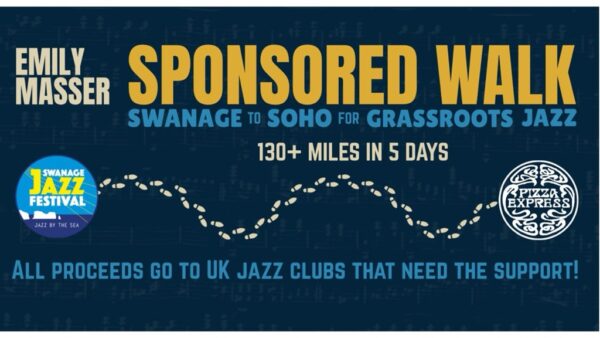
Review posted here by kind permission of Trevor Bannister
Photo Colin Swain
John Horler Trio: A Portrait of Bill Evans – May 2025
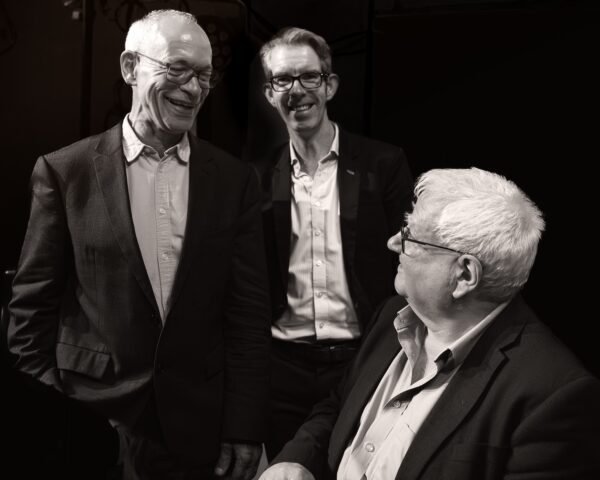
Progress Theatre, Reading Friday 16 May
John Horler piano, Alec Dankworth bass Ronnie Jones drums
Bill Evans’ approach to the piano, with its ‘moonlight’ quality and purity of sound, could touch otherwise impenetrable depths of human emotion. Indeed, as John Horler recalled with ebullient good humour, he was so overcome with a mix of excitement and emotion when he heard Evans ‘live’ for the first time at Ronnie Scott’s ‘Old Place’ sixty years ago, that he fainted. ‘I was a sixteen- or seventeen-year-old student at the Royal Academy,’ he told the near full-house at the Progress Theatre on Friday 16 May, ‘and my brother Dave had to carry me out of the club and up the steps to Gerrard Street. “I think you’ve had enough,” he said.’
Fortunately for us, John Horler hadn’t ‘had enough’. From that moment he embraced the unique musical language and inspirational force of Bill Evans to become one of the most expressive musicians on the jazz scene. It was an absolute delight to welcome him back to Jazz at Progress, where he made such an impression three years ago, to play the music he loves in the company of kindred spirits Alec Dankworth and Ronnie Jones.
This three-year interlude has seen the trio play two ‘sold out’ shows at Ronnie Scott’s; and also perform live on BBC Radio 3’s In Tune. It is fair to say their return to the Progress Theatre was eagerly anticipated – and did it deliver!
‘Re: The Person I Knew’, a warmly affectionate tribute to Evans’ Riverside Record label producer, Orrin Keepnews, opened the evening to captivating effect, followed by the mischievious charm of ‘Alice in Wonderland’.
The glorious interplay already in evidence between the musicians found full expression in a beautifully evocative, almost heart-stopping, interpretation of ‘When I Fall in Love’; a masterpiece of timing, concluded by a perfectly placed TING by Ronnie Jones, using his wedding ring to delicately strike his cymbal.
‘Funkallero’ brought a compete change of mood and atmosphere with the hard-driving staccato rhythms one associates with Bud Powell’s ‘Un Poco Loco’, an early influence on Bill Evans’ jazz career. An intense bass solo from Alec Dankworth paved the way for a nail-biting exchange of ‘4s’ featuring the subtly energetic brushwork of Ronnie Jones.
‘How My Heart Sings’, a composition by Earl Zindars, a composer and jazz educator with whom Evans became friends when they were serving in a military band during the Korean War, held the double attraction of a distinctive melody combined with alternating time signatures.
The poignant beauty of ‘Blue in Green’, Bill Evans’ uncredited contribution to Miles Davis’s classic ‘Kind of Blue’ album, brought a gasp of recognition from the audience as soon as John Horler coaxed the first note from his piano keyboard. Time simply stood still as he made the tune entirely his own, more than ably supported by Alec Dankworth and Ronnie Jones. This was a performance of the highest order!
With the approach of the interval Horler ‘summoned the troops to action’ with an unaccompanied tour de force improvisation. Alec Dankworth duly fell into line with his singing bass, while Ronnie Jones swapped his wire brushes for sticks to launch a full-scale attack on ‘My Romance’, a swinging close to an exhilarating first set which set feet tapping and seats rocking.
After a well-earned interval and welcome refreshment, the second set opened with ‘Elsa’, another composition from the pen of Earl Zindars which appeared on Bill Evans’ ‘Explorations’ album of 1961.
Taken at walking pace, it once again demonstrated the extraordinary interplay between the musicians, and their ability to listen to each other.
In a further break with piano trio orthodoxy, Alec Dankworth took the lead with stunning effect on Irving Berlin’s evergreen ‘How Deep is the Ocean’, a number which revived the veteran songwriter’s career when it was first introduced on radio in 1932. I’ve enjoyed the pleasure of listening to Alec’s bass innumerable times over the years in a variety of settings, but I don’t think that I have ever heard him play with such poise, assurance, sensitivity and creativity as on this occasion. John Horler fulfilled his accompanying role to perfection and as one had come to expect, Ronnie Jones added exactly the right percussive effects at exactly the right moments from his customised bijou ‘bop’ drum kit; with its bongo-like maple-hooped tom toms (and snare), plus 16” bass drum and sizzling cymbals – instruments he played with a suite of sticks, mallets and brushes… and often his hands.
No portrait of Bill Evans would be complete without ‘Waltz for Debby’, an enduring favourite with audiences and the nearest Bill Evans came to writing a ‘hit’ song. As Evans afficionados blessed with good hearing would have noted (this writer not included), John Horler augmented his interpretation with an excerpt from ‘Turn Out the Stars’.
As for ‘Peace Piece’, which flowed seamlessly into ‘Some Other Time’, Horler conjured keyboard magic to spine-tingling effect. He is a truly world-class exponent of his instrument.
Before John Horler and his fellow musicians took their final bow, (a moment captured brilliantly by house photographer Steve Foster on display in the Gallery elsewhere on the Jazz in Reading website) they set the pots boiling with ‘Nardis’ – another Evans’ composition credited to Miles Davis – and rounded off a 5-STAR performance with Tadd Dameron’s bebop anthem ‘If You Could See Me Now’.
The audience left the theatre with smiles on their faces and warmth in their hearts, having enjoyed an evening that not only paid tribute to the genius of Bill Evans, but reminded us of the world class talent we have in our midst in the person of John Horler. My advice to jazz club promoters is to book this group – NOW!
Our thanks also to the team at Progress Theatre headed by Stuart McCubbin and to the excellent service of Hickie’s Music Store of Reading and Tiverton for the hire of the piano.
Review posted here by kind permission of Trevor Bannister
Photo by Steve Foster @jazzshots (Instagram & FB)
John Law’s Re-Creations ‘Many Moons’ Tour – April 2025
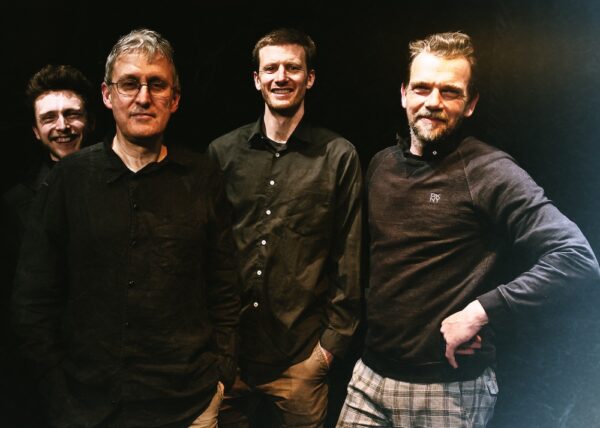
Progress Theatre, Reading Friday 4 April 2025
John Law piano & keyboard, Sam Crockett soprano & tenor saxophones, Henrik Jensen bass, Alex Goodyear drums
An effervescent arrangement of ‘Let’s Face the Music and Dance’, with a compelling ‘running’ bass line shared between John Law’s left hand at the piano and Henrik Jensen’s double bass, lit the touch paper for a brilliant evening of jazz by John Law’s Re-Creations at Progress on Friday 4 April. This was music that immediately touched the heart, the mind and the soul.
In complete contrast to the Irving Berlin classic, with its evocation of the Fred Astaire and Ginger Rogers’ dancing partnership, ‘O sole mio’, being ‘tried out’ ahead of the quartet’s forthcoming European tour, inevitably summoned images of Cornetto ice creams. But not for long, John Law worked his magic to transform this sentimental ballad into a funky Latin/calypso groove. Everyone had a ball and the piece must surely have earned a permanent place in the band’s repertoire. Alex Goodyears’s hand-drumming was a particular joy.
Sam Crockett swapped tenor sax for soprano to capture the bittersweet emotions and ultimate elation of ‘Bella Ciao’ (‘Beautiful Goodbye’), a song said to have been adopted by the women working in the paddy fields of northern Italy in the late 19th century, in their protest against harsh working conditions.
With barely a pause for breath John Law expressed the full range of his fertile imagination in a sublime re-creation of Sergei Rachmaninoff‘s ‘Sonata in G minor for Cello and Piano’. Rich in colour, texture and melodic invention, it held the audience spellbound. Amongst its many high spots: Sam Crockett’s breathy, almost inaudible opening to his tenor solo, Henrik Jensen’s singing bass and Alex Goodyear’s percussive contributions to the tonal palette.
The band delivered a knock-out blow to bring the first set to an explosive conclusion with the theme tune to ‘Rocky III’, a massive hit for Survivor in 1982. But what was the title? I knew it. It was on the tip-of-my-tongue. But what was it? Come on … what was it? As rapturous applause for the band faded and the audience made its way to the bar, the penny finally dropped … ‘Eye of the Tiger’. Of course!!!
Having posed one conundrum, John Law set another tantalizing challenge to open the second set. The audience sat in awed silence as Law wove layer upon layer of pulsing improvisation around a theme which Sam Crockett ultimately revealed as ‘The House of the Rising Sun’ in a declamatory statement on his tenor sax. As the shock waves of this surprise reverberated around the auditorium, the band sprang another, launching into ‘Smoke on the Water’ as an excursion into the realms of heavy-metal/free form jazz, with Alex Goodyear in ferocious form on the drums.
The restless soul of Miles Davis would have approved of John Law’s re-creation of ‘So What’, the opening track of Miles’ groundbreaking album ‘Kind of Blue’ from 1959. It captured the spirit of the original with the subtle use of electronics and the cool, pared-to-the-bone tenor of Sam Crockett and added a new dimension to the hypnotic quality of the tune’s distinctive call-and-response exchange between piano and bass.
Though not fully credited at the time with his contribution, ‘Kind of Blue’ bore the clear influence of the legendary pianist Bill Evans, who was himself influenced by the French impressionist composers of the late 19th and early 20th centuries, including Maurice Ravel. It was therefore fitting that John Law should follow ‘So What’ with the beautifully reflective ‘Pavane for a Dead Princess’ (‘Pavane pour une Infante Défunte’), composed by Ravel as a student in 1899. Magic!
One word will suffice to describe the party atmosphere conjured by yet another surprise item, Mama Mia’ –WHOA’ .
‘You and the Night and the Music’, a near forgotten song by Arthus Schwarz from the totally forgotten 1934 Broadway musical, ‘Revenge with Music’, rounded off the evening in thrilling fashion and brought the concert full circle with a welcome reprise of the ‘running’ bass line used to such great effect on ‘Let’s Face the Music ….’. It has remained firmly fixed in my mind ever since.
What a great evening and while the audience may have lacked numbers, it more than made up for it with its generous spirit and enthusiasm. We wish John Law’s Re-Creations every success with their tour of Germany and the Netherlands which will be well under way by the time this review is posted.
As ever, our thanks to the Progress volunteer stewards and Front of House team for their warm hospitality and to Rich Saunders for the excellent sound and lighting. Thanks also to Hickies Music Store of Reading and Tiverton, for the hire of the piano.
Review posted here by kind permission of Trevor Bannister
Photo by Steve Foster @jazzshots (Instagram & FB)
Empirical – February 2025
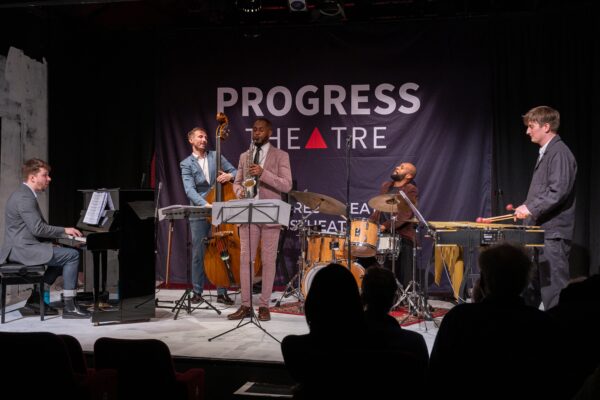
Progress Theatre, Reading Friday 21 February 2025
Nathaniel Facey alto sax, Jonny Mansfield vibes
Will Barry piano, Tom Farmer bass, Shaney Forbes drums
Multi-award winning Empirical made a very welcome return to Jazz in Reading on Friday 21 February, after an interval of nine years, with an enthralling evening of inspired jazz. The band’s inception in 2007, bringing together the multifarious writing and improvisation talents of Nathaniel Facey, Lewis Wright, Tom Farmer and Shaney Forbes, made an immediate impression on the jazz scene with its collective approach to creating jazz. It cast a backward glance to the fundamental roots of the music, capturing the exuberance and freedom of spirit of those early days at the turn of the twentieth century, but with a level of sophistication, virtuoso performance and breadth of expression that the pioneers of New Orleans could never have imagined in their wildest dreams. It’s an utterly compelling process of creation; a mix of respect for formal structure combined with the spontaneity of improvisation that effortlessly draws the audience into its orbit. We could all share in that thrilling feeling of stepping into the unknown and seeing where the music might take us.
With Jonny Mansfield now occupying the vibes ‘chair’ vacated by Lewis Wright, who recently moved to the States and the addition of Will Barry on piano, Empirical now has a new look and fresh sounds to explore, while remaining true to the philosophy that brought it into being.
Nathaniel Facey’s earth-shattering alto saxophone emerging from the dreamlike background of Tom Farmer’s ‘The Naitoku’ provided the ‘wondrous beginning’ to the evening. My mind immediately rolled back to a date in the late 1960s when I had the good fortune to hear the great Joe Harriott in person. Facey has the same qualities of poise, energy and creative power that so impressed me with Joe, and with a glorious sound that literally filled every space of the Progress auditorium.
Those qualities were on further display in Facey’s daring a cappella introduction to ‘Gazzelloni’, Eric Dolphy’s dedication to his flute teacher, featured on the classic Blue Note album ‘Out to Lunch’, recorded in 1964. Facey conjured an incredible range of sounds from his instrument – from the delicacy of the flute to out-of-this-world harmonics. Having held the audience totally spellbound, he summoned the band into action and Will Barry launched into a flight of restless invention ahead of a fiery exchange between Facey and drummer Shaney Forbes. A moment of stunned silence followed the abrupt ending before the audience broke into a huge round of applause.
‘Giants’, an extract from a newly composed suite by Shaney Forbes, and literally ‘hot’ from the recording studio, gave us a taste of the prospective delights to be found on Empirical’s next album, scheduled for release later this year. Set to the exotic rhythms of Forbes’ tumbling drums, it had a curiously enigmatic feel to it as each musician revealed his own vision of what a ‘Giant’ might be.
All too soon, the first set concluded with ‘As the Eagle’, Nathaniel Facey’s majestic impression of an eagle soaring from its mountain top eyrie. We felt as one with this creature in its flight through the infinite open space of the sky.
The second set opened with Nathaniel Facey’s dramatic depiction of a mythical dragon, The Grocklum’. The wide range of its unpredictable moods, successively portrayed by the earthy groove of Will Barry’s piano and Jonny Mansfield’s dazzling four-mallet outing on his vibraphone, built to a ferocious climax with Facey’s alto spitting sheets of flame fuelled by Forbes’ insistent percussion. WOW!
The exquisite, ever-changing tone colours and textures of Tom Farmer’s achingly beautiful ‘Wonder is the Feeling’, perfectly captured that moment in our lives when, for the first time, we open our minds to all the possibilities that life and the world have to offer.
Remaining in this realm of profound thought, Shaney Forbes’ used ‘Lambs to the Slaughter’ to pose the question of whether we are able to exercise our minds creatively for the common good, or are we indeed destined simply to become ‘lambs for the slaughter’. Jonny Mansfield set the debate in motion with a simple and highly effective repeated motif, underpinned by the cello-like bowed bass of Tom Farmer. Against this background grew a conversation of steadily increasing intensity between the instruments – restless piano, delicate vibes, wailing saxophone. As it grew towards a crescendo of sound and excitement, Tom Farmer released the tension with a perfectly placed bass break, a breathing space before the final ‘bash’ and a revelatory drum solo by Shaney Forbes. It added up to an astonishing performance of collective music-making.
The coda, Forbes’ ‘Garden of Beginnings’, provided further affirmation that such creative processes as jazz can offer a hopeful future for our deeply troubled world.
Empirical deal with some serious themes through their music, but please don’t think this makes it difficult to listen to. It’s full of life, colour and knife-edge excitement and has an appeal that’s impossible to resist. The band take their music seriously, but not themselves. They had great fun on stage dealing with the ‘house poltergeist’ which first sent Jonny Mansfield’s carefully placed music scores flying and later broke apart a mic stand just as Shaney Forbes was about to make an announcement. Empirical is a band to catch as it continues its ‘Wonder is the Beginning’ tour with dates in Stamford, Birmingham, Derby and Winchester.
As ever our thanks to the volunteers of the Progress Theatre for their warm hospitality and for the excellent quality of sound and lighting.
Review posted here by kind permission of Trevor Bannister
Photo by Steve Foster @jazzshots (Instagram & FB)
The Jazz Champions – January 2025
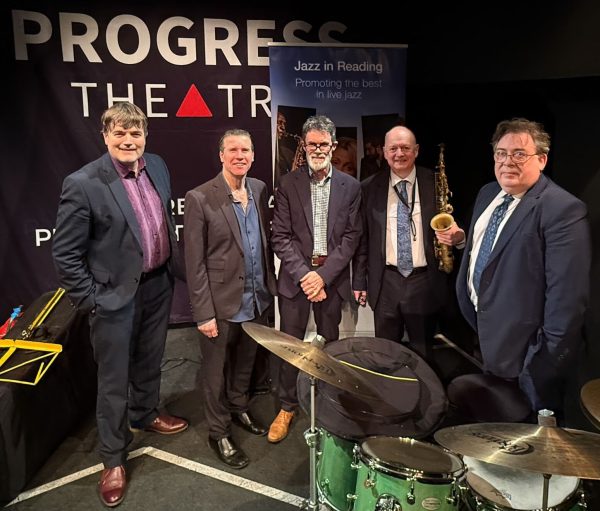
Progress Theatre, Reading Friday 3 January 2025
Alan Barnes alto saxophone & clarinet, Simon Allen soprano & tenor saxophones, Dave Newton piano, Andy Cleyndert bass, Clark Tracey drums.
It’s hard to imagine a better way to celebrate a new year of Jazz at Progress than in the company of the Jazz Champions – Simon Allen, Alan Barnes, Dave Newton, Andy Cleyndert and Clark Tracey – five musicians at the top of their game who relish the challenge of playing together and the opportunity to pay fulsome tribute to the Champions of earlier generations, like Bobby Wellins, Stan Tracey, Roy Haynes, Bobby Watson and Chick Corea whose music they expressed with passion and inspired invention.
The band hit full stride with the opening number, ‘See You CB’ by the legendary Scots’ saxophonist Bobby Wellins which set heads swaying, feet tapping and entire rows of seats rocking with its full-throated ensemble sound and insistent beat.
Though Roy Haynes, who sadly died on 12 November 2025 at the remarkable age of ninety-nine, was best known for the timeless joys of his drumming and musicianship, he was also an accomplished composer. Three numbers dedicated to his memory captured the unique qualities of his music in what jazz writer Brian Priestley aptly described as ‘a feeling of continual surprise combined with absolute relaxation’.
Tracey’s crisp drum intro, set the scene for ‘Long Wharf’, an evocation of Haynes’ birthplace in Boston, drawn for his 1956 album, ‘Out of the Afternoon’.
The gentle, feathery tones of Alan Barnes alto contrasted beautifully with the muscular approach of Simon Allen’s tenor, prompted by the magic touch of Dave Newton at the keyboard. Cleyndert and Tracey kept the ‘pots boiling’ in the rhythm section.
Dave Newton was at his enigmatic best on ‘Snap Crackle’, Haynes’ onomatopoeic nickname, denoting the distinctive sound of his snare drum, which fairly bristled with unexpected rhythmic twists and turns. Dave’s long-term partner in crime, Alan Barnes, added to the air of mystery with a magnificent clarinet solo.
‘Hagnes’, the final piece in the Haynes’ tribute, was originally recorded in Sweden way back in 1954. Tracey’s opening fusillade of drumming led the way on to a roller-coaster of mounting excitement, firmly anchored to the ground by Andy Cleyndert’s sublime bass lines.
I’m pleased to say that saxophonist and composer Bobby Watson is alive and well and as active as ever on the US jazz scene. He made his mark early in his career as Musical Director of Art Blakey’s Jazz Messengers from 1977 to 1981, for whom he composed ‘A Bitta Bittadose’. The band followed Cleyndert’s rich-toned call-to-action and dug into an earthy blues-groove to close the first set in spectacular fashion amid rapturous applause and shouts of ‘YEAH’ from the audience.
True to the spirit of the festive season, the second set opened with a touch of pantomime when MC Jim Wade looked to one side of the stage for the band’s entry, only for them to appear on the other when his back was turned. ‘They’re behind you,’ called out one wag in the audience.
‘The Rainbow at the Five Mile Road’, the first of two pieces dedicated to Clark Tracey’s inspirational father, Stan, came from the 1969 album ‘Free an’ One‘ when Stan was exploring the world of ‘free’ improvisation in the company of Peter King on alto, Dave Green bass and Bryan Spring drums. This interpretation was no less adventurous in the wistful, reflective mood suggested by the title; the subtle interplay between the musicians was something to especially savour.
‘Euphony’ cast an affectionate backward glance to 1952 and the first recording of a Stan Tracey original, by an eight-piece ensemble with Stan on piano, led by the then teenage wunderkind Victor Feldman. A bright, breezy number, similar in style and bouncy charm to Clifford Brown’s ‘Joyspring’, it gave everyone the chance to relax and stretch out at rather more length than permitted by the 2 minutes and 36 seconds of the 78-rpm recording.
The superb rhythm section of Andy Cleyndert and Clark Tracey came into its own in support of Dave Newton as he took a headlong dive into the challenge of Chick Corea’s ‘Matrix’. An improvisation of astonishing complexity, power and rhythmic drive held the audience absolutely spellbound and provided the launching pad for roof-lifting solos from Simon Allen and Alan Barnes. WOW!
If you will forgive a flight of fancy, ‘Remind Me In Three’, a Latin-based original by Clark Tracey, couldn’t help but make me ponder the uncertainties of our current weather patterns. I bathed in the glow of endless summer evoked by Alan Barnes’ poised alto, only for Simon Allen to summon the storm clouds with his soaring soprano. By good fortune, Dave Newton was on hand to restore calm, order and the welcome return of glowing of sunshine.
When Clark Tracey picked up his brushes ahead of announcing the final number, I thought that we may be set for a gentle ballad to close an evening of otherwise white-hot excitement. How wrong could I be! Clark can generate as much power with brushes as he can with sticks, as he ably demonstrated on ‘Kitty’ an out-and-out swinger from Harry Edison to round off a magnificent gig.
All praise to the Jazz Champions, the brainchild of the fertile imagination of Clark Tracey; champions in their own right as individual musicians and in the broader sense of championing past heroes and the cause of jazz for the future.
Thanks also to the Progress Front of House team and to Rich and Joe in the lighting and sound box, all whom of whom helped to get the new year of Jazz at Progress off to an unforgettable start.
Review posted here by kind permission of Trevor Bannister
Soultime! Play the Music of Bobby Timmons – December 2024
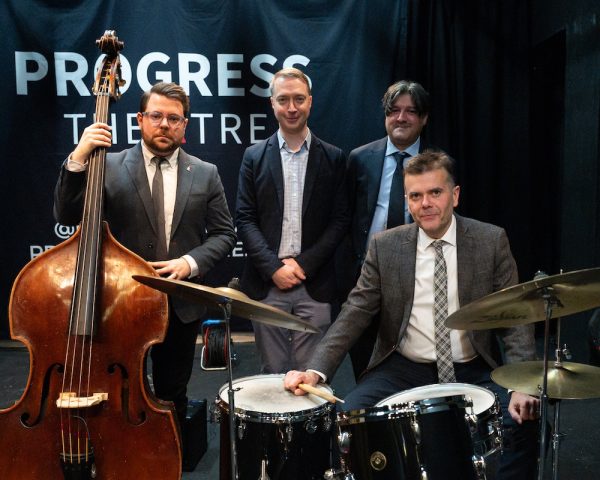
Progress Theatre, Reading Friday 13 December 2024
Steve Fishwick trumpet & flugelhorn, Leon Greening piano, Matyas Hofecker bass, Matt Home drums.
Way back in the 1980s, Al Haig, a pioneer of modern jazz who played piano with Charlie Parker, Dizzy Gillespie and Stan Getz amongst many greats of the music, made a telling remark on a visit to London which still rings true today. ‘What I don’t understand,’ he said, ‘is why we never hear British guys in New York. There’s so much talent here – and no one knows your names.’
He could have been talking about pianist Leon Greening, whose remarkable home-grown talents deserve the recognition of a world stage. The emotional depth of his playing and nail-biting flights of invention are simply astonishing. He grabs the listeners’ attention at his first touch of the keyboard and never lets it go.
How apt that Greening’s latest project, Soultime!, a joint venture with the perfect foil of Steve Fishwick’s pure toned trumpet and flugelhorn and a powerhouse rhythm section of Matyas Hofecker and Matt Home, should pay tribute to Bobby Timmons, whose influence helped to shape his earliest efforts at the keyboard.
Greening recalls that at the age of about ten, his father, himself an accomplished jazz musician, set him to learn Timmons’ iconic composition ‘Moanin’’ as a test piece. Eager to impress, young Leon rose to the challenge and passed with flying colours. From that moment on he delved through his father’s extensive record collection to discover more treasures from the Timmons’ canon and to embrace the full range of his work; as a pianist and side-man with the likes of Cannonball Adderley and Art Blakey, as a leader of his own trio with Ron Carter on bass and Al ‘Tootie’ Heath on drums and as a composer and arranger.
Timmons, he realised, occupied a unique place in jazz in the late 1950s, infusing his blues/gospel-soaked background with the hard bop of the day to help create something new in the form of ‘soul jazz’. It made the music more accessible to a wider audience without compromising its integrity. A rangy figure, he could use his exceptionally long fingers to great effect at the keyboard. Tragically, Timmons fell prey to the scourge of drug/alcohol abuse that devastated so many musicians of his generation and died of cirrhosis of the liver at the age of thirty-eight in 1974.
The palpable spirit of Bobby Timmons set the evening alight with the declamatory ‘This Here’, a hit for Bobby on an album under his own name in 1960 and also for Cannonball Adderley with his classic album ‘In San Francisco’.
If ‘This Here’ was exactly the sort of number one would expect from an exponent of ‘soul’, Timmons’ intriguing arrangement of ‘Autumn Leaves’ added a further dimension to the meaning of the word. This was deeply soulful; an elegy to loss, expressed with heart wrenching beauty by the members of Soultime!
Steve Fishwick switched to the mellow tones of his flugelhorn to ride over a colourful melee of sounds and rhythms conjured by his colleagues on ‘Booker’s Bossa’, a composition by bassist Walter Booker taken from Timmon’s 1967 big band outing ‘Got To Get It’.
Like the legendary Erroll Garner, Leon Greening has the gift of leading the audience (and maybe also his fellow musicians?) through a tantalising labyrinth of side routes and blind alleys before he reveals the full splendour of the melody he wants to play. Some tunes lend themselves perfectly to this guessing game, Victor Herbert’s ‘(I Don’t Stand) a Ghost of a Chance With You’ is one such, which Bobby Timmons recorded on his ‘Easy Does It’ album. Well done to the lady who identified it correctly when Leon invited suggestions from the audience. Nor should we forget a beautiful bass solo from Matyas Hofecker.
As a footnote to this song and further evidence of jazz musicians’ aptitude for deconstructing and the rebuilding both word and musical patterns, the late-Eddie Thompson, a noted British pianist used to announce it as ‘I Won’t Chance a Stand with a Ghost Like You’.
Another Timmons’ classic ‘So Tired’ was anything but; a brilliant, supercharged tour de force exposition of keyboard artistry from Leon Greening, with everyone ‘manning the pumps’ in support.
With barely a pause for breath the quartet launched into ‘Joy Ride’, a helter-skelter of a number with thrilling exchanges between the respective musicians topped by an outing for Matt Home on the drums, all of which took us to a well-earned interval.
‘Dat Dere’, which first made its appearance as the opening track on Cannonball Adderley’s ‘Them Dirty Blues’ album, set the tone for the second set with an irresistible stamp of authority. It’s earthy power just sweeps you along. Amongst its many delights, Hofecker’s extended bass solo and the precision of Matt Home’s drumming.
Does anyone remember Too Many Girls, I wonder, a Broadway musical from 1938 with songs by Rodgers and Hart? The show died, but thankfully at least one of its songs, ‘I Didn’t Know What Time It Was’ survived and has stood the test of time with numerous recordings by Ella Fitzgerald and Frank Sinatra amongst many other great artists. Steve Fishwick’s trumpet expressed the elegance of the melody against a blues-tinged background featuring the dazzling piano of Leon Greening.
A loping bass introduction gave just enough time for the audience to adjust their seat belts before the band hit ‘Soul Time’, an out-and-out swinger in 3/4 time that shook the rafters.
We entered calmer waters with ‘Malice Towards None’ a beautifully reflective piece featuring the long sinuous lines of Steve Fishwick on flugel horn, composed by Tom McIntosh with whom Timmons worked on the ‘Born To Be Blue’ album.
Another swinger in the form of ‘One Mo’, led inexorably to the climactic finale of a magnificent and truly heartfelt tribute to Bobby Timmons. What else could it be other than ‘Moanin’’, a jazz standard of iconic status with a timeless and universal appeal.
Soultime! keep the flame of Bobbby Timmons’ spirit burning brightly. They also remind us of how fortunate we are to have such world class musicians in our midst!!
Our thanks to the Progress Front of House team for their hospitality and to Joe, stationed in a lonely box at the back of the auditorium, for the sound and lighting.
On behalf of the Jazz in Reading may I extend season’s greetings to all our supporters. We promise more great jazz adventures in 2025.
Review posted here by kind permission of Trevor Bannister
Photo by Steve Foster @jazzshots (Instagram & FB)
Steve Waterman’s Latin Jazz Quartet – September 2024
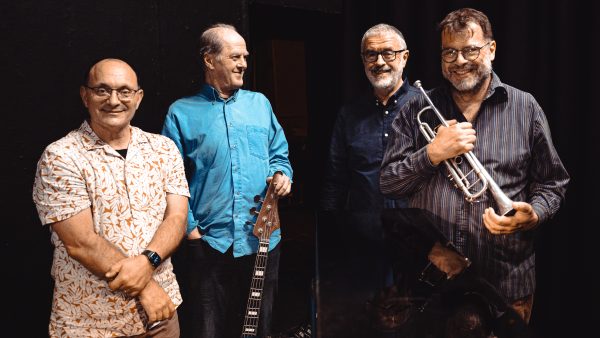
Progress Theatre, Reading Friday 27 September 2024
Steve Waterman trumpet & flugelhorn, John Donaldson piano, Rob Statham bass, Buster Birch drums
The new season of Jazz at Progress opened to a full house on 27 September in the welcome company of Steve Waterman’s Latin Jazz Quartet, four musicians of world class stature steeped in the excitement, language, rich heritage and joyfully expressive spirit of what Jelly Roll Morton, the legend of early classic jazz, termed ‘the Spanish tinge’.
Steve Waterman is one of the greatest of contemporary brass players whose distinct sound and style immediately lit up the stage with the first notes of Paquito d’ Rivera’s ‘Chucho’. This gentle, medium paced tribute to pianist/composer Chucho Valdes, the ‘God Father’ of Cuban jazz, also reminds us that on more than one occasion Waterman has graced the trumpet section of Chucho’s band at the Havana Jazz Festival. Can there be any higher accolade than that?
‘Recardo Bossa Nova’, written by Djaima Ferreira and Luis Antonio, lays claim to being the first bossa nova to be recorded, originally as a vocal and subsequently by a host of artists as an instrumental. Tenor saxophone star Hank Mobley brought it to the attention of hard bop fans as a feature on his 1965 Blue Note album, ‘Dippin’ – though as a floating samba, in which form the Waterman Quartet delighted the Progress audience. Great solo excursions by Waterman on flugelhorn and John Donaldson at the piano.
The mournful press rolls of Buster Birch’s snare drum and Waterman’s piercing trumpet, set the scene for Astor Piazolla’s ‘Oblivion’, an extraordinarily beautiful, yet emotionally devastating tango.
The hard driving mambo, ‘Oye Como Va’, quickly restored the spirits. First recorded by Tito Puente in 1962 and later to even greater acclaim by Carlos Santana, it’s an anthem for good times and an open invitation to dance.
Pianist composer Horace Silver used the ‘Spanish tinge’ to great effect on many of his compositions. He possessed that rare gift of coming up with catchy tunes that provided plenty of scope for jazz expression. ‘Nica’s Dream’, dedicated to Baroness Pannonica de Koenigswarter, is a case in point. This patroness of jazz was believed to have been named Pannonica, after a species of butterfly. The tune expresses the attributes of this delicate creature. Only in later years did someone shatter this beautiful imagery by declaring that a Pannonica is in fact a moth! No matter, this knowledge didn’t get in the way of a spellbinding performance from the quartet, with John Donaldson’s dazzling piano to the fore.
One doesn’t usually think of Henley-on-Thames as being a hot bed of Latin fervour. Yet it provided the backdrop to the closing tune of the first set in so far as Steve Waterman was living there at the time when he wrote ‘Songo for Mia’, an exhillerating outing in Latin funk, as a dedication to his daughter. .
My view of Rob Statham was obscured by the piano, but his strong presence and original voice on fretless bass was both felt and heard to great effect throughout ‘BB’, the first of two extended pieces from ‘Concerto for Congas’ which opened the second set. This commission from conga player Richard Jones was recorded in Oxford by a large ensemble in 2001. Incidentally, the orchestra included several musicians who will be well known to followers of jazz in the Thames Valley, notably saxophonists Ewen Baird and Geoff Hawkins and guitarist Jez Cooke.
The second piece, ‘Nowhere to Go’ set off at an unnerving pace propelled by the full percussive power of Buster Birch’s battery of instruments. Steve Waterman’s plaintive, rather formalised, trumpet, contrasted beautifully with the knife-edged activity going on around him. An object lesson in seamless invention.
‘Mas Que Nada’, a popular success for Sergio Mendes in 1966 with an exotic blend of instruments and voices, and an even bigger hit in a 2006 remake with the Black Eyed Peas, has lost none of its appeal in the intervening years.
I loved Rob Statham’s contributions on bass and the subtle interplay between the musicians.
It seems barely possible that almost half a decade has passed since the world as we knew it came to an abrupt halt in the wake of the Covid pandemic and subsequent Lockdown. ‘Lonely Street’, Steve Waterman’s personal statement, powerfully captured the enigmatic nature of those strange time; when one could savour the tranquility of empty streets, clear skies and the chance to hear birdsong, while at the same time yearning for human contact and activity. The beautifully reflective piano from John Donaldson and sensitive support of Rob Statham and Buster Birch – his use of cymbals was simply amazing – underpinned this outstanding performance.
‘Manteca’, which translates as ‘lard’ in English (Cuban slang for heroin), co-written by Dizzy Gillespie and Cuban conga drummer, Chano Pozo, caused a sensation when it was first performed in 1947 by Dizzy’s big band. Sadly, Chano’s time with the band was short lived – literally, he died in violent circumstances in December 1948. But he had made his mark and this show-stopping number to top all show-stopping numbers remained in Dizzy’s repertoire until the end of his career. On this occasion, it made a climactic finale to an enthralling evening of Latin Jazz from Steve Waterman and his compatriots. The rhythm section racked up layer upon layer of hair-raising tension ahead of Waterman’s breathtaking flight into the stratosphere. What could one say, other than ‘WOW!’
As ever our thanks to the Progress Front of House team for their warm hospitality and especially to Rich Saunders for his sterling efforts to overcome technical challenges in the lighting box.
This review is dedicated to the memory of Sergio Mendes 11 February 1941 – 5 September 2024
Review posted here by kind permission of Trevor Bannister
Photo by Steve Foster @jazzshots (Instagram & FB)
The Gaz Hughes Trio: The Nuclear Bebopalypse Tour – June 2024
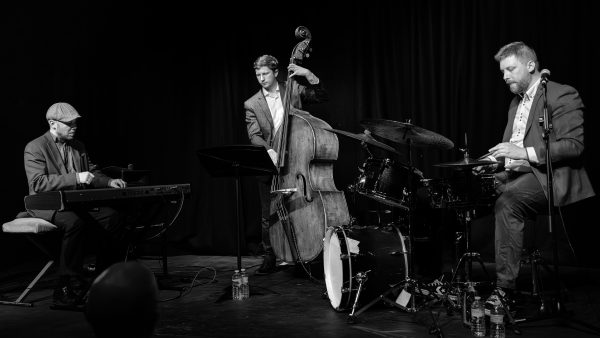
Progress Theatre, Reading Friday 21 June 2024
Andrzej Baranek keyboard | James Owston bass | Gaz Hughes drums
If football coach Gareth Southgate is serious about improving England’s fading fortunes in the Euro ’24 competition, he would do well to check out the Gaz Hughes Trio. It’s performance at the Progress Theatre on Friday 21 June, part of a 50-date ‘Nuclear Bebopalypse’ tour of the UK, had everything that was missing from England’s inept display against Denmark – perfect balance, poise, purpose, exciting changes in pace, the light and shade of emotional expression and oodles of energetic creative spirit. Above all, it was hugely entertaining.
A passion for the cause, of course also helps. In Gaz Hughes’ case, an unwavering belief in the power of swing through the classic format of the piano trio à la Oscar Peterson, Bud Powell et al. Nor should we forget the musicians’ near telepathic sense of understanding (all the more remarkable given that James Owston was a dep for the evening) or their willingness to push the boundaries, imbuing the music with an irresistible knife-edge excitement.
All these attributes were well to the fore in the dazzling brilliance of ‘Beboptical Illusion’ and the relaxed slow-build of ‘AB’s Blues’ which opened the evening.
The lush ‘Beautiful Moons Ago’, a beautifully romantic piece, composed by guitarist Oscar Moore with lyrics by his then boss Nat King Cole, took us back to 1946 and paid tribute to Nat’s place in the lineage of great piano trios.
The classic Ellington/Strayhorn collaboration, ‘Satin Doll’, here revealed in all its sumptuous glory, worked especially well as a nuanced conversation piece between Baranek at the keyboard and the bass of James Owston.
‘The next number’, Gaz Hughes announced, ‘Is by George Shearing … but I’m not going to tell you what it’s called.’ It took a while before the familiar strains of ‘Lullaby of Broadway’ began to emerge from a heady mix of Latin American colour, topped by the visually stunning display of hand-drumming of the leader.
We didn’t realise at the time, but the wistful charm of ‘Alice in Wonderland’, title song to Disney’s 1951 animated feature film, represented the calm before the storm. ’Nuclear Bebopalypse’ hit the audience with all the explosive force the title suggests and more. What can I say? We were absolutely knocked out by Andrzej Baranek’s astonishing keyboard technique and unlimited powers of invention, ably supported by Owston and Hughes. A fitting climax to a fabulous first set.
‘I Mean You’ opened the second set with echoes of Thelonious Monk’s fruitful pairing with Art Blakey in the early 1950s. It’s a fascinating piece. Owston held a steady beat on his bass while Baranek and Hughes freely exchanged ideas as they navigated the twists and turns of Monk’s theme. By all accounts, Monk was a man of few words, but I think this number would have received his nod of approval.
Bass player Gavin Barras, for whom James Owston was depping, penned ‘Disinformation’. The only covert message I could detect, instructed me to sit back and enjoy this exercise in gentle swing, especially the virtuosic playing, bowed and pizzicato, of James Owston. No harm done there.
Listening to ‘Shooting from the Hip’ was rather like opening a box of Turkish Delight, there were so many treats to enjoy – James Owston’s expressive introduction, Baranek’s funky improvisations and the barely perceptible sound of Hughes’ bass drum as it set the pulse – pure magic! What’s more, Gaz Hughes commented that unlike some audiences on the tour, those at Progress avoided the trap set by the false ending and didn’t clap until the tune had properly ended.
Andrzej Baranek’s tour de force excursion on ‘Put on a Happy Face’, a hit song from the 1960 musical ‘Bye Bye Birdie’, did exactly that. One could sense smiles growing wider and wider as he became ever more expansive at the keyboard.
One quickly became immersed in the intense Afro-Cuban rhythms of ‘White Noise’ and yet for all its joyful expression, there seemed to be a tinge of melancholy lurking in its depths which particularly touched me.
As we moved towards the finale, the trio segued two numbers together, ‘Body and Soul’ and ‘Straight No Chaser’, before launching into a reworking of Victor Feldman’s ‘Seven Steps to Heaven’. ‘I should warn you,’ Hughes admitted, as he interrupted an introductory roll on his floor tom. ‘This number includes a fifteen-minute drum solo.’ He was kidding; it only lasted five!
In truth it was even shorter, but what a tasteful and musical drummer he is and what a fantastic group he leads. We wish the ‘Nuclear Bebopalypse’ tour every success as it continues to make its way across the UK.
Our thanks as ever to the Progress Theatre House Team for their hospitality.
Composer credits for the numbers featured in the concert are as follows.
Andrzej Baranek: AB’s Blues, Bebopalypse
Oscar Moore/Nat King Cole: Beautiful Moons Ago
Duke Ellington /Billy Strayhorn: Satin Doll
George Shearing: Lullaby of Broadway
Sammy Fain: Alice in Wonderland
Thelonious Monk: I Mean You, Straight No Chaser
Gavin Barras: Disinformation
Gaz Hughes: Beboptical Illusion, Shooting from the Hip, White Noise
Lee Adams/Chales Strouse: Put on a Happy Face
Johnny Green: Body and Soul
Victor Feldman: Seven Steps to Heaven
Further information about the UK tour of ‘Nuclear Bebopalypse’ and details of album sales can be found on https://gazhughesmusic.com/
Review posted here by kind permission of Trevor Bannister
Photo by Steve Foster @jazzshots (Instagram & FB)
Five-Way Split – May 2024
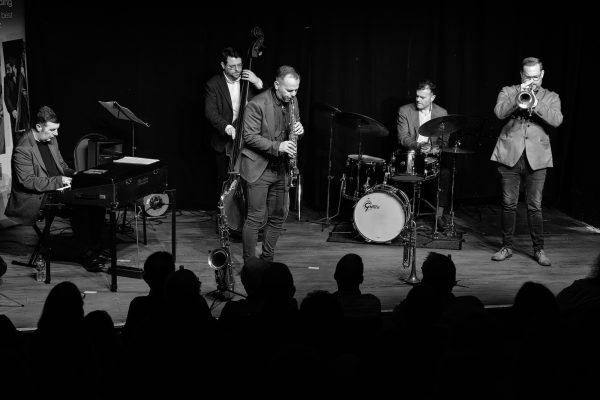
Progress Theatre, Reading Friday 10 May 2024
Quentin Collins trumpet & flugelhorn | Vasilis Xenopoulos soprano & tenor saxophones | Rob Barron Fender Rhodes piano | Matyas Hofecker bass | Matt Home drums
The spirit of jazz was born in adversity and jazz musicians are by nature creative and enterprising individuals. It should therefore come as no surprise that the members of Five Way Split navigated a successful passage through lockdown, despite all the professional hardships they faced. They emerged with a new band, pulsing with energy and honed to perfection through hours of rehearsal, and with an entire book of freshly minted compositions by Quentin Collins, Vasilis Xenopoulos and Rob Barron, plus some new arrangements of old favourites. As the old adage continues to remind us – ‘Where there’s a will, there’s a way’.
And what a way! The opening bars of ‘Out of Wayne’s Bag’, a soulful tribute to the much-lamented Wayne Shorter, shook the rafters. Not a microphone in sight, and yet this band had the impact of an ensemble twice its size; the mellow tones of Rob Barron’s classic, 1975-vintage, Rhodes-Fender keyboard blending perfectly with the powerful front line of Quentin Collins’ trumpet and Vasilis Xenopoulos’ tenor sax.
Rob Barron’s ’Lingua Franca’ expressed the universal language of jazz in a joyful manner reminiscent of the great Clifford Brown/Max Roach Quintet of the 1950s, with the front line floating on the brilliant support of Matyas Hofecker bass and Matt Home in the swinging rhythm team.
Home’s hypnotic beat on his closed high-hat cymbals conjured an air of mysterious tension in the introduction to the character of ‘Dr Stohl’, a platform for free-flowing solos from Collins on flugelhorn and Xenopoulos on tenor.
A change of tonal palette, with Collins remaining on flugel and Xenopoulos switching to soprano sax, brought a delightfully wistful air to ‘Mr Birthday Waltz’. It also featured a beautiful bass solo by Matyas Hofecker, supported by the sensitive touch of Rob Barron at the keyboard.
‘Evidently’ brought the first set to a scorching close in classic hard bop fashion with a string of virtuosic solos, climaxed by an exciting and impeccably executed drum solo by Matt Home.
I would like to imagine that Jimmy Van Heusen and Sammy Chan, respectively composer and lyric writer of ‘All the Way’, were nodding with approval as the second set opened with a reinterpretation of their 1957 hit for Frank Sinatra. Rob Barron’s sparkling arrangement brought the song bang-up-to-date in musical style, opening up plenty of solo space for the band’s principal protagonists, while paying homage to its status in the pantheon of great songs.
In complete contrast ‘Two Little Alphas’, set to an infectious Cuban rhythm was an outing of pure fun, depicting the mischievious antics of Vasilis Xenopoulos’ young sons – whose first names, you will not be surprised to learn, both begin with A.
By now the band had entered the realm of new material ahead of recording a second album later this year – something very much to look forward to. ‘Soho Soirée’, anchored by a gorgeous bass line from Matyas Hofecker settled into a relaxed groove, while ‘XO Buzz’ explored the pleasurable sensations induced by good brandy.
Before anyone could drift into an alcoholic stupor, Rob Barron summoned a call for action. The band launched into an untitled blues (did I detect a hint of Cole Porter’s ‘Love for Sale’ lurking in the background?). It was a case of ‘All hands to the pumps’ as the excitement mounted for the grand finale – blistering solos, high speed exchanges, dramatic top notes … and still the audience clamoured for more.
The band duly obliged. A gently swinging ‘Sunday in New York’, from the 1963 movie starring Jane Fonda, brought a wonderful evening by five world class musicians at the top of their game to a perfect close.
Five Way Split’s debut album ‘All the Way’ is available from Bandcamp here
Composer credits for the numbers featured in the concert are as follows:
Vasilis Xenopoulos: Out of Wayne’s Bag, Two Little Alphas
Quentin Collins: Mr Birthday Waltz, XO Buzz
Rob Barren: Lingua Franca, Dr Stohl, Evidently, Soho Soirée
Jimmy Van Heusen/Sammy Cahn: All the Way arranged by Rob Barron
Peter Nero/Carroll Coates: Sunday in New York arranged by Five Way Split
***
As ever, our thanks to the Progress Front of House Team for their warm welcome and hospitality, to the Sales and Box Office team who have coped magnificently with the terrific demand for tickets, Rich Saunders for his technical expertise and to the audience whose continued support makes it possible to present live jazz at Progress.
Review posted here by kind permission of Trevor Bannister
Photo by Steve Foster @jazzshots (Instagram & FB)
Arbenz + Hart + Pursglove = Conversations – March 2024
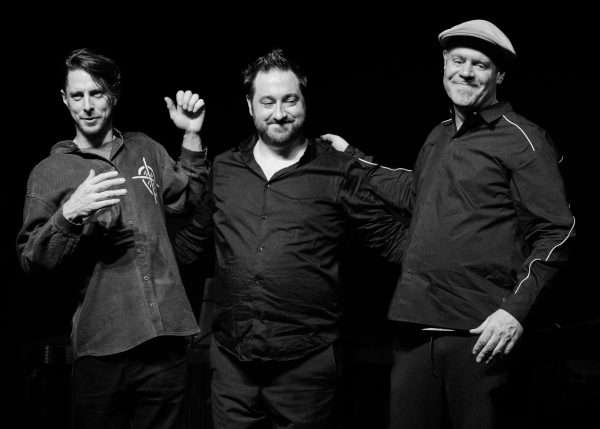
Progress Theatre, Reading Friday 22 March 2024
Jim Hart vibraphone, percussion | Florian Arbenz drums, percussion | Percy Pursglove trumpet/flugelhorn
Listening to Arbenz + Hart + Pursglove = Conversation, in the intimate surrounds of the Progress Theatre on 22 March, was a totally enthralling experience. I sat in awe as three of the most creative musicians on the European Contemporary jazz scene worked their magic across two forty-five-minute sets.
The music flowed in a cascade of invention, finding its own course in the interplay between the musicians and sweeping me along in its wake. As the group’s publicity proclaimed, ‘This is truly music of the moment’. Its sophistication placed it in a world apart from the origins of jazz in the street parades of early 20th Century New Orleans, but it brings that spirit alive to a new generation in the sheer joy of collective music making.
Individually, the musicians were at the top of their game. Florian Arbenz, a very welcome guest from Basel in Switzerland, is a restless drummer, able to draw a vast range of subtle rhythms and tonal colours from his drums and cymbals (or more accurately a kit borrowed for the evening from Jazz in Reading’s Jim Wade). Somewhere, tucked away from the gaze of the audience he had a tiny percussion devise to create intriguing bass notes. If there is such a thing as a ‘drum landscape’, Arbenz used it to tremendous effect to set the scene for the opening title, Evolution/ Winter and all that followed.
British born vibraphonist and percussionist, Jim Hart, is now a close neighbour to Arbenz on the Continent and like Arbenz, is a composer of great originality. Throughout the evening, he constantly switched deftly to-and-fro between his collection of percussion instruments and dazzling four-mallet forays on the vibes.
The ensemble was completed by the multi-instrumentalist and composer, Percy Pursglove, who Progress regulars will remember from a memorable appearance as bassist/trumpeter with Andy Sheppard a few years ago. Among his many roles as a freelance musician, Pursglove is a member of the famous NDR Big Band in Hamburg. On this occasion, he formed what MC Bob Draper described as the ‘brass section’, performing eloquently and with a beautiful purity of tone on trumpet and flugelhorn.
The momentum established in Evolution/Winter Still, continued in the good humour of Jammin’ at the Children’s Corner. Pursglove’s plaintive trumpet emerged from the ensemble on the Old Showman, in a style reminiscent of Miles Davis’s Sketches of Spain. Its emotional impact lifted the hairs on the back of my neck. Imperceptibly, the temperature cooled, the smooth lines of the music became more jagged and the first set concluded with Angular Momentum. Was it my imagination or did I catch a fleeting reference to ‘Night in Tunisia’ in Jim Hart’s vibes?
The Exchange, an apt title from the pen of Jim Hart, opened the second set in lively fashion as a torrent of ideas sped across the stage between the musicians. Pursglove’s own composition Fluxy Wuxy served as a prelude to a heart wrenchingly beautiful interpretation of Hoagy Carmichael’s classic ballad, Skylark – as fine an example of collective ensemble playing as you will ever come across.
The evening came full circle with the spotlight falling once more on Florian Arbenz. His drums set in motion a celebration of time spent in Cuba – not in academic study as he was supposed to be doing but absorbing the vivid colours and rhythms of Cuban culture from its streets. Rhumba Celebration simply oozed with life-affirming energy and brought a brilliant concert to a spectacular close. It will be a ‘conversation’ piece for years to come.
Arbenz + Hart + Pursglove = Conversation, were very welcome guests at Progress and we are delighted that they left Reading with a warm regard for the UK provincial jazz scene. Florian remarked to the effect that, while we might lack the financial support available to our continental neighbours, we more than make up for it with our energy, commitment and love of the music. Long may it continue!
As ever, thank you to the Progress Front of House team for their hospitality and to Rich Saunders for the excellent quality of sound and lighting.
Review posted here by kind permission of Trevor Bannister
Photo by Steve Foster @jazzshots (Instagram & FB)
Jean Toussaint – February 2024
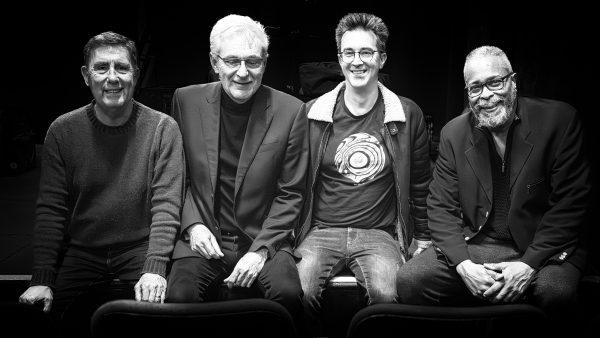
Progress Theatre, Reading Friday 9 February 2024
Jean Toussaint tenor saxophone with Peter Billington piano, Paul Jefferies bass & bass guitar and Simon Price drums
From the moment a beaming Jean Toussaint took to the Progress stage on Friday 9 February to a rapturous reception from the sell-out audience it was clear that we were in for a very special evening of jazz. Toussaint’s tenor saxophone filled the auditorium with its soulful tones as he kicked off the gig in the excellent company of Messrs Billington, Jefferies and Price with ’10 Bar Blues for Jimi’. This heartfelt dedication to Jimi Hendrix served as the prelude to the richly varied programme to come, an irresistible mix of jazz standards and Toussaint originals.
Paul Jefferies’ insistent bass paved the way (no pun intended) for a visit to ‘On Green Dolphin Street’, a swinging and often recorded standard, most famously by Miles Davis classic sextet in 1958, which unleashed the full jaw-dropping power of Toussaint’s improvising skills.
In complete contrast, Toussaint drew on the inspiration of Billie Holiday for a sublime reworking of ‘These Foolish Things’. With the sensitive support of the rhythm section, he captured the full aching beauty of the timeless Eric Maschwitz/Jack Strachey composition.
The edgy groove of ‘Mood Mode’, from Toussaint’s 2014 album ‘Tate Song’, worked as a brilliant conversation piece between the wailing Toussaint and the sparklingly inventive piano of Peter Billington – on a splendid Yamaha instrument especially hired for the occasion from Hickies Music Store. The final word(s) fell to Simon Price egged on by Jean Toussaint. Pure magic!
Toussaint closed the first set and opened the second with two contrasting, but deeply felt tributes to members of the Toussaint family taken from the 2023 album, ‘Songs for Sisters, Brothers & Others’. One might describe ‘Blues for Sister Yve’ as a call to prayer, such was its emotional force and joyous expression of the human spirit. ‘Kalila’, on the other hand, portrayed a lady of more wistful and reflective qualities. As Toussaint declared, ‘Music is from the heart’. I would say ‘Amen’ to that.
Writing catchy blues themes is one aspect of Charlie Parker’s genius that is all too often overlooked. ‘Now’s the Time’ is one such tune, so catchy indeed, that R & B bandleader Paul Williams lifted it ‘lock, stock and barrel’ from Parker’s 1946 recording to create a hit for himself under the new title, ‘The Hucklebuck’, claiming the copyrights and copious royalties in the process! Toussaint resisted the temptation to take ‘Bird-like’ flight on the number. Instead he took the theme through a series of beguiling variations in time, rhythm and harmony.
He did, however, really stretch out on ‘Vera Cruz’, a gorgeous composition from the pen of Brazilian musician Milton Nascinmento, before paying tribute to his mother with a stunning performance of Billie Holiday’s ‘God Bless the Child’.
A reprise of ‘Blues for Sister Yve’, Toussaint’s signature tune, brought a magnificent evening of music to a fitting close.
Jean Toussaint is a true giant of jazz, a master of his instrument, a composer of rare quality and a source of inspiration whose generosity of spirit embraced everyone fortunate enough to be present at the Progress gig. He drew ‘out of this world’ performances from Peter Billington, Paul Jefferies and Simon Price of which they can be justly proud. Long gone are the days when the visiting ‘star’ would simply ‘call the numbers’, set the pace and ‘the devil takes the hindmost’. This was a quartet in the truest sense of the word. ‘That’s the happiest band I’ve ever seen at Progress,’ remarked one member of the audience as he made his way out of the auditorium … enough said!
Our thanks to Mark Werner of Hickies for the hire of the piano, to Stuart McCubbin and the Progress front of house team for looking after everybody so splendidly and Rich Saunders for the excellent sound and lighting, and to the audience whose consistent support keeps jazz alive at Progress.
Review posted here by kind permission of Trevor Bannister
Photo by Steve Foster @jazzshots (Instagram & FB)
Moscow Drug Club – December 2023
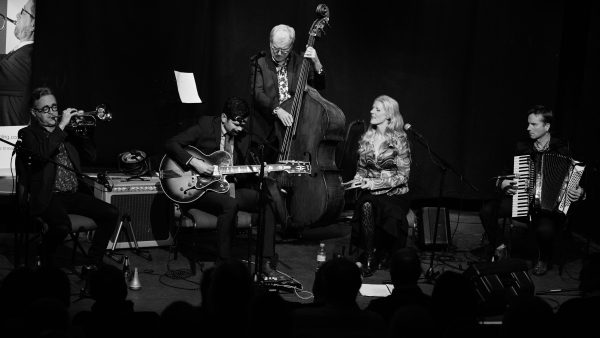
Progress Theatre, Reading Friday 22 December 2023
Katya Gorrie vocals, Jonny Bruce trumpet, Mirek Salmon accordion, Andy Bowen guitar, Andy Crowdy bass
What better way to herald the coming of Christmas than to suspend belief for a couple of hours in the company of Katya Gorrie and her band of troubadours and accept an invitation to join them in the subterranean depths of the Moscow Drug Club, a place where members can ‘have a smoke’, cock-a-snoop at authority, relax in the musical intimacy of its intoxicating atmosphere ‘where the Reds play the blues’.
Dark and jam-packed, the air is charged with the irresistible force of anticipation. Whose shoulders might we rub against? What colourful tales might they have to tell.
The extravagantly dressed ‘Jezebel’ jostles everyone aside with a startling entrance to a trumpet fanfare and a flurry of flamenco guitar. I overheard someone whisper, ‘She’s no better than she ought to be’ as we listen, mouths agog, to her confession of betrayal, deception and deceit. The front of it all.
Heads turn to Eartha Kitt – adorned with a ‘Mink Shrink’ – as she freely offers guidance on how to use feline guile to acquire the trappings of material success. ‘And if ever you should be faced with a choice between love and a Jaguar’, she brazenly declares;’ always take the Jaguar.’
As Eartha slinks away into the shadows ‘The Gypsy With the Fire in His Shoes’ grabs our attention with a dramatic pose in the centre of the floor. Urged on by the rhythmic pulse of the band and the enthusiastic clapping of the thronging crowd, he dances as if his life depends on it. Wow!
But the clamour and excitement are short-lived. The unnerving presence of ‘The Voodoo Queen of New Orleans’ makes itself felt as she prepares to perform her dark arts in the deepest recesses of the cavernous basement. Not far away the disconsolate figure of Tom Waits sits at the bar, deep in conversation with a yawning bar tender, as he shares the tragic series of mishaps that befell ‘A Jockey Full of Bourbon’.
In not a moment too soon, Queenie, the Cutie of Burlesque arrives to dispel the gloom with a teasing ‘Strip Polka’. ‘”Take it off, ” “Take it off” the customers shout. But Queenie, ‘always the lady’ and with her heart firmly set on one day retiring to a farm, STOPS … as ‘always just in time!
Will Queenie fulfil her dreams, Jacques Brel wonders as he reflects on his own memories of ‘The Port of Amsterdam’, or will it all end in disillusion and bitterness? Before we can ponder the question too deeply ‘Two Guitars’ explode with joy and restore life to the party in time to welcome the arrival of the sensational Little Miss Sunshine with her jivey solution to all problems, ‘When I Get Low, I Get High’.
Oh no., here comes trouble in the insinuating form of ‘The Serpent’. Whenever it makes an appearance something nasty is bound to follow. Sure enough, the grim-faced musicians announce that ‘Ol Man Mose is dead; ‘he’s kicked the bucket’. Blazing trumpet notes soar to the heavens to give this much loved little old man with a crooked nose, the best send off anyone could wish for.
Amid the outpourings of grief and emotion three figures stand arm in arm to reflect on the strange vicissitudes of life. Jacques Brel flicks through a ‘stupid ass way’ bundle of images and memories – “My adventures, or should I say, misadventures as ‘Jackie’,” he declares with a wry smile.
“Why dream about yesterday?” asks Miss Peggy Lee. “Why dream about today. Think about ‘Man᷉ana (Tomorrow)’, ‘Man᷉ana is good enough for me”.
‘Just Dance Me to the End of Love’, sighs Leonard Cohen.
The resident band, as fine a group of musicians as can be found anywhere on the planet, strike up the chords of ‘Christmas Time in New Orleans’ to close the Moscow Drug Club for the night and to send home its members in true festive spirit.
But it’s the captivating whisper of another tune that lingers in the air as they make their way through the bar and into the street – ‘Misirlou’ – an anthem for unconditional and universal love.
Watch out for the next opening of the Moscow Drug Club!
Happy New Year!!!
Review posted here by kind permission of Trevor Bannister
Photo by Steve Foster @jazzshots (Instagram & FB)
Music Is: Chris Biscoe Plays Mike Westbrook – November 2023
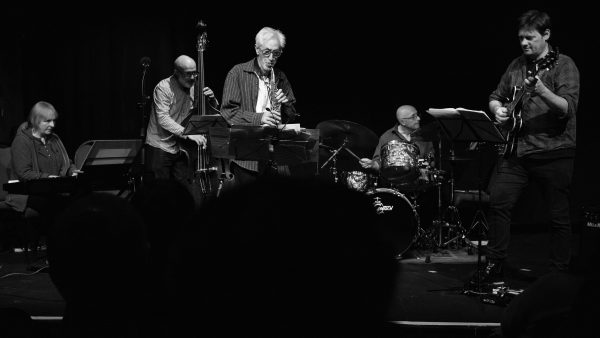
Progress Theatre, Reading Friday 10 November 2023
Chris Biscoe saxophones, Kate Williams piano, Mike Outram guitar, Dave Whitford bass, Eric Ford drums
It was a real pleasure to welcome the return of saxophone virtuoso Chris Biscoe to Jazz at Progress on Friday 10 November after an interval of six years. His latest project, Music Is: Chris Biscoe Plays Mike Westbrook captures with astonishing brilliance the spirit and vast range of one of jazz’s greatest composers, Mike Westbrook – creatively active as ever aged eighty-seven and soon to be leading his Band of Bands, a collection of long-term alumni including Chris Biscoe, at London’s Café Posk on 2 December.
But more than that, ‘Music Is’ serves as platform to reveal Biscoe himself as a musician of rare expressive quality and as a tribute to his friends and fellow musicians who are no longer with us – Tony Marsh, Danilo Terenzi, Stuart Brooks, Lois Barry and Bobby Wellins.
The seeds of Biscoe’s long association with Mike Westbrook took root long before he joined the Westbrook Trio in 1979. As he told Chris Searle in a recent interview for the Morning Star, “I first heard the concert band live at the 100 Club and fell in love with the mix of freedom, organisation, tunes and great solos by saxophonists like Mike Osborne, Alan Skidmore and the real favourite, George Khan. I loved Mike’s constant desire to explore new projects and his willingness to take on the unusual.”
He continued, “ ‘Music Is’ starts with the history of my association with the Westbrooks. Hence the concentration on music from the Mama Chicago and Cortege albums. It’s a mixture of pieces I felt I could play in a similar way to their first incarnation, and others I wanted to take in a different direction.”
‘Music Is’, from ‘On Duke’s Birthday’, Westbrook’s celebration of Duke Ellington, opened the evening to beguiling effect. Whitford and Ford improvised freely around the variations of the plaintive theme expressed by Biscoe on soprano sax. Did Biscoe really conjure those final notes from his instrument? So exquisitely beautiful and yet way beyond its normal range. Or were they a figment of the imagination? Stunning.
‘Mama Chicago’, Westbrook’s ground-breaking ‘Jazz Cabaret’ from 1979, gave birth to the next two numbers. The richly evocative ‘Mama Chicago’ combined Kate Williams’ free-flowing piano, Biscoe’s slow searing alto and Outram’s bluesy guitar in a glorious melee of changing moods and shifting rhythms. ‘Goin’ to Chicago’ could be described as an atmospheric ‘road-song’, depicting the tension and mounting excitement of driving to the most populous city in America’s mid-west, on a journey charged with the anticipation of the delights Chicago has to offer. I loved Eric Ford’s propulsive drumming and an insistent figure from Kate William’s keyboard that seemed to be counting down the miles to the destination.
The contemplative ‘View from The Drawbridge’ saw a return to a trio format, this time comprising Biscoe on soprano, Outram guitar and Dave Whitford on bass. First recorded in 1975 by a nineteen-strong orchestra, this arrangement lost none of its emotional splendour in this scaled-down interpretation. It brought to mind the haunting beauty of ‘Starless and Bible Black’, Stan Tracey’s timeless collaboration with the late Bobby Wellins.
The calming influence of Kate William’s sensitive keyboard touch helped restore order to the enjoyably anarchic portrait of a late-night street scene in Vancouver depicted in ‘Aggro-Vancouver-Desperado’, allowing Biscoe’s majestic baritone to emerge briefly from the ensuing chaos. Biscoe explained the inspiration for the piece. ‘For some unknown reason Mike and Kate Westbrook and I decided to walk back from an out-of-town gig by the pianist/singer Dave Frishberg. Vancouver is light and airy in daytime. It’s a lairy place at night.’
The first set closed with a personal favourite of Mike Westbrook; the Friedrich Hollaender/Ralph Freed ballad ‘You Leave Me Breathless’, featuring a beautiful solo by Mike Outram.
The yearning ache of loss filled Chris Biscoe’s baritone in the sax/drum dialogue that opened the second set as he reflected on the desolation of old communities in the wake of modern development in ‘Wasteground and Weeds’.
The following three pieces were drawn from ‘The Cortege’, Westbrook’s massive work for a seventeen-piece orchestra originally issued as a triple–album in 1982 which drew its inspiration from the canon of European poetry.
‘Enfance’, based on the text of French poet Paul Eluard captured the joyous spirit of childhood, though tinged with the bitter sweet knowledge that all too soon it comes to an end.
‘July ‘79’, served as a reminder that ‘The Cortege’ was commissioned for the late and much-lamented Bracknell Festival of that year and evoked the jazz/rock feel of those days. Fine solos from Biscoe on alto and Mike Outram paid tribute to former Westbrook colleagues Chris Hunter and Brian Godding.
As if to say, ‘Here we go guys. Let’s see where this will take us’, everyone cut loose to joyous effect on ‘Graffitti’, the final choice from ‘The Cortege’.
A gorgeous re-working of ‘Music Is’, this time with the full band, and with Kate Williams and Mike Outram very much to the fore, brought the evening full circle to a magical close.
But there remained one more tune to play – ‘Johnny Come Lately’, another personal favourite of Mike Westbrook. Somehow the band took on the sound of a much bigger ensemble as they stretched out on this Billy Strayhorn classic. The quirky stops and starts to the arrangement kept musicians and audience alike firmly on their toes. A great ending to a wonderful evening.
In a brief conversation with Chris after the gig, he expressed delight at the size of the audience and the response to the music. ‘After all’, he remarked, ‘playing Mike Westbrook’s music isn’t like revisiting Miles, Mingus or Gerry Mulligan/Paul Desmond, but it does have tremendous appeal.’
True enough. Let’s trust that the ‘Music Is’ project will make his name better known, along with that of Chris Biscoe.
https://www.chrisbiscoe.co.uk/ https://www.westbrookjazz.co.uk/
As ever our thanks to Stuart McCubbin and his band of helpers who form the Front of House and technical team at the Progress Theatre.
Review posted here by kind permission of Trevor Bannister
Photo by Steve Foster @jazzshots (Instagram & FB)
Partners in Time – Historic Sax/Trumpet Partnerships – October 2023
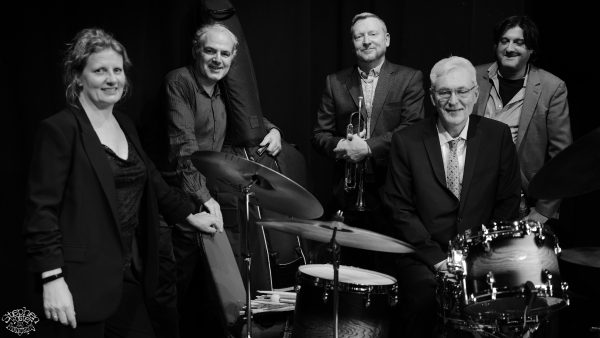
Progress Theatre, Reading Friday 6 October 2023
Stuart Henderson trumpet & flugelhorn, Karen Sharp tenor & baritone saxophones, Leon Greening piano, Raph Mizraki bass, Simon Price drums
Any band bearing the hallmark of Stuart Henderson guarantees certain qualities of performance: exciting and neatly arranged jazz at its most swinging; a well-researched and perfectly balanced programme accompanied by Henderson’s informative and good-humoured introductions; brilliant musicians at the top of their game who love the music and relish striking sparks off each other without over-staying their welcome in the solo spotlight, not to mention a built in ‘WOW’ factor that on this occasion threatened to lift the roof of the tiny Progress Theatre. It goes without saying that the sell-out audience responded with rapturous applause as they thrilled to the music.
Henderson also has the gift for working his programmes around an original theme; in this case, ‘Partners In Time’, the classic front-line trumpet/saxophone partnerships that define so much great jazz across a spectrum of eight decades spanning the bebop innovations of Dizzy Gillespie and Charlie Parker in the 1940s to the present day.
Henderson picked out a dozen gems from this rich vein opening with a languid interpretation of ‘Pennies From Heaven’ inspired by the majestic pairing of fellow Basie-ites Harry Edison and Lester Young on the 1956 album ‘Pres and Sweets’. An object lesson in economy and relaxed swing, Karen Sharp’s slightly laid-back tenor provided the perfect foil to Henderson’s’ tightly muted trumpet.
Leon Greening’s stunning introduction moved up the throttle by several notches as he led the way into a hard-edged delivery of ‘Out of the Night (Came You)’, a Horace Silver number from his post-Blue Note album ‘Silver ‘N Voices’, giving full rein to Henderson’s burnished trumpet and Karen Sharp’s expressive tenor.
Dizzy Gillespie’s calypso ‘And Then She Stopped’ brought back memories of seeing the quintet which recorded this track in person, with James Moody on tenor and flute, at the New Theatre, Victoria (now the Apollo) when it toured the UK way back in 1965. Ever the clown, Dizzy announced that he would introduce the members of the band. With that, the five guys began to greet each other with smiles, gracious bows and handshakes as if they’d never met before. Dizzy had probably pulled the trick hundreds of times, but it still had the audience falling about with laughter. After the concert, amid a melee at the stage door, a very young Kenny Barron obliged my friend and I with an autograph.
‘And Then She Stopped’ captured all the joyful spirit that I recall from those far off days, as well as providing an outing for Simon Price’s ‘jiggery-pokery’ with mallets on his drums and an amazing duet with Raph Mizraki, who used the body of his bass to conjure incredible percussive effects.
Star soloists Clark Terry and Paul Gonsalves took time out from the Duke Ellington Orchestra in 1957 to record ‘Duke With a Difference’ for the Riverside label. This featured eight Ellington standards including ‘Mood Indigo’. The combination of Henderson’s trumpet – wah-wah mute and open, Karen Sharp’s mournful tenor and Raph Mizraki’s bass evoked the full plaintive beauty of this Ellington classic.
Another Duke, in this case pianist and composer Duke Pearson, contributed ‘Duke’s Mixture’ to the prolific Blue Note partnership of Donald Byrd and baritone saxist Pepper Adams. Taking up the monster instrument Karen Sharp blew a storm over Simon Price’s incisive shuffle-rhythm, to be followed by a positive tsunami of invention from Leon Greening – no wonder they are each regarded as the best musicians on their respective instruments anywhere around. Nor should we forget Stuart Henderson who held the audience spellbound as his trumpet soared to the heavens.
Stevie Wonder’s ‘You Are The Sunshine of My Life’ provided the perfect antidote to the previous heart-stopping excitement. It calmed the pathway to the interval with a gorgeous Latin arrangement drawn from Jim Rotundi and Eric Alexander’s 1997 collaboration ‘Jim’s Blues’.
The second set opened with a glorious cacophony of traffic noises – screeching brakes, honks and hoots, interspersed with snatches of the ‘Can-Can’, ‘Marseillaise’ and Gershwin’s ‘American in Paris’ – the colourful introduction to Bud Powell’s depiction of a ‘Parisian Thoroughfare’. Made famous by trumpeter Clifford Brown and his tenor partner Harold Land in 1954, our own Partners in Time kept up the dizzying pace as they raced through the streets of Paris.
‘The Killers of West 1’ brought us closer to home with a scaled down version of Tubby Hayes’ 1964 arrangement for his big band. With its feel for the hip, vibrant scene of ‘Swinging London’ and kicked along by Simon Price’s crisp drumming, this served as a fine tribute to Tubby, arguably the greatest jazz musician Britain has ever produced, and his long-term sparring partner, Scots trumpeter Jimmy Deuchar.
The inclusion of ‘Line for Lyons’, a classic recording by Gerry Mulligan’s piano-less quartet of 1952, gave Leon Greening the chance of a short rest. It was well-earned. ‘I had not heard him before,’ confessed one member of the audience. ‘He is simply amazing!”
Leon clearly took delight in the delicate interplay between Henderson’s trumpet and the sonorous tones of Karen Sharp’s baritone sax, adding his applause to those of the audience at the end of the number.
It’s a measure of the band’s skill and versatility that they could move with seemingly effortless ease from the homely comfort of the Mulligan Quartet to the spacious, other-worldly territory of Wayne Shorter’s ‘Witch Hunt’. Taken from Shorter’s 1964 Blue Note album ‘Speak No Evil’ when Freddie Hubbard partnered Wayne in the front-line, it featured a beautiful bass solo by Raph Mizraki amongst its many highlights.
Given its place in the pantheon of jazz recordings, tunes from ‘Kind of Blue’ are rarely, if ever, played live. Could it be a case of ‘How do you match perfection?’ Leon Greening, with the sensitive support of the rhythm section, set the scene for a sublime and utterly compelling performance of ‘Blue in Green’. Once again, though in a very different context to ‘Pennies from Heaven’, Karen Sharp’s full-toned tenor played the perfect foil to the heart-wrenching muted trumpet of Stuart Henderson – a la Miles Davis and John Coltrane.
Sadly, the ten o’clock deadline drew near, beckoning the return of the hired piano to its home in Hickie’s Devon storeroom. What a pleasure it had been to listen to Leon Greening at his inventive best on such a magnificent instrument. Thank you Hickies!
There was time for one more number; a finale and encore rolled into one. And what better choice than Lee Morgan’s ‘The Rumproller’. Everyone pulled out the stops for a truly spectacular close to a superb evening of jazz – rasping trumpet, wailing sax, two-fisted piano, grooving bass and explosive drums. WOW!
Needless to say, everyone had a great evening and left with a smile on their face.
Our thanks to the members of the band and the Progress team who look after everyone’s comfort and wellbeing with such warm hospitality.
Review posted here by kind permission of Trevor Bannister
Photo by Steve Foster @jazzshots (Instagram & FB)
Pigfoot Plays Ellington – September 2023
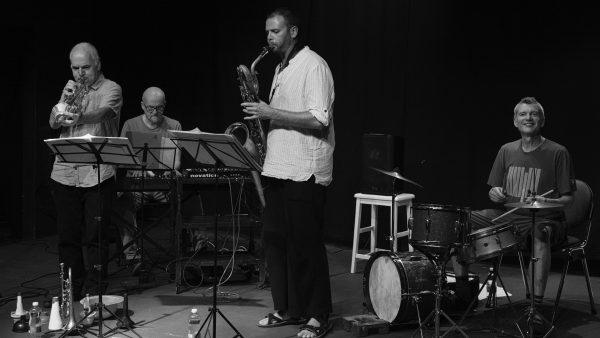
Progress Theatre, Reading Friday 15 September 2023
Chris Batchelor trumpet/cornet, James Allsopp baritone saxophone/bass clarinet, Liam Noble keyboards, Paul Clarvis drums
As I walked home from the opening concert of Jazz at Progress’s new season on Friday 15 September, with my head swirling with the sound of Duke Ellington’s music, I couldn’t but marvel at how Pigfoot, a four-piece band with obvious limitations in instrumentation, could so successfully capture the sound and spirit of the great man with such authenticity.
Duke himself would have been proud of the achievement. Clearly, Pigfoot have lovingly immersed themselves in the tradition of Ellingtonia – the man, the music and the host of characterful figures who formed his orchestra.
An array of mutes scattered on the stage gave a clue to the range of effects Chris Batchelor can conjure from his cornet and trumpet. His whoops and growls were every bit as sensational today as they must have been nearly a century ago when legendary bandsman like Bubber Miley and Cootie Williams launched the technique on unsuspecting Cotton Club audiences. However, Batchelor’s superb breath control and exquisite lyricism on the seldom heard cornet was even more impressive; an echo of the wonderful Arthur Whetsol who graced the early Ellington orchestra.
James Allsopp, doubling on baritone saxophone and bass-clarinet has a remarkable range and facility on each instrument, a spectrum of sound from Harry Carney’s sonorous bottom tones, through Ben Webster’s breathy tenor to the poise of Johnny Hodges gorgeous alto. At times one could even detect a likeness to John Coltrane at his most poignant. There are few musicians around who can handle these monster instruments with such ease and with so much depth of feeling. Allsopp’s huge sound really hits the soul when an earthy groove is called for.
Liam Noble drew on the full resources of his keyboards to fulfil a multiple role within Pigfoot. As well as serving as the ‘piano player’, as Duke Ellington liked to describe himself, and ‘walking’ the bass, he created the glorious orchestral backdrops to give each piece its true Ellington flavour. When called for solo duties, his ‘electronic’ clarinet added a distinctive voice to the front line.
Duke Ellington used to describe Sonny Greer as ‘our reluctant drummer’ because he didn’t like to take solos. Instead, he used his skills, honed in stage shows backing dancers and acrobats, to support individual soloists with colourful and perfectly placed percussive effects and to lay down a driving beat behind the full ensemble. Paul Clarvis fulfilled this role perfectly, though unlike Greer who surrounded himself with drums, vibes, tympani, chimes and even a gong, he uses a minimalist drum kit.
For all his remarkable gifts and the accolades he received from the great and the good, Ellington frequently came under fire for the programming of his concerts. Critics and fans alike would complain that there was ‘too much old material’ or conversely, ‘too much new stuff’; ‘too many solos and not enough from the full band, ‘too many interminable suites’ and worst of all … ‘too many drum solos’. Rarely, if ever, did Ellington please all of the people, all of the time.
To my mind, Pigfoot, got the balance just right – a blend of familiar classics leavened with more obscure items, spanning the breadth of Ellington’s remarkable career. Some pieces were first recorded with the full orchestra, others with small groups, while some fell outside the usual band umbrella altogether as one-off studio encounters. Bringing Ellington together with various guest stars.
‘Rockin’ in Rhythm’ dating from 1929 and evoking the heady days of Harlem’s Cotton Club set the programme in motion. Not surprisingly it remained in the book with various modifications for the whole life of the Ellington band.
A spell-bindingly beautiful ‘La Fleurs Africaine’ moved things forward to 1962 and the studio session with Ellington on piano, Charlie Mingus bass and Max Roach drums that produced the ‘Money Jungle’ album. Pure magic!
In complete contrast, ‘Such Sweet Thunder’, the title track of Ellington’s 1957 Shakespearian Suite, summoned every ounce of power and energy available to evoke the nefarious machinations that underlie this tragedy. All great fun and oozing with sleaze.
‘Just Squeeze Me’, first recorded in 1941 by an Ellington small band led by Rex Stewart, bounced along in joyful fashion to a gentle shuffle rhythm with Chris Batchelor’s cornet well to the fore.
‘In a Sentimental Mood’ was one of Ellington’s earliest hit songs. This version, however, dated from a classic studio meeting with John Coltrane in 1962. One was impressed by the sense of stillness and quiet reflection the performance created and the extraordinary Coltrane-like tonal qualities James Allsopp drew from his bass-clarinet.
‘It’s a case of “Duke Ellington meets James Brown”,’ Chris Batchelor warned as Liam Noble, aided and abetted by Paul Clarvis, laid down an irresistibly funky groove to launch ‘Blue Pepper,’ surely the most spicey of all the tracks on the magnificent ‘Far East Suite’ of 1965. Topped by growling trumpet and wailing baritone the number closed the first set in a sensational manner.
‘East St Louis Toodle-oo’ opened the second set and took us right back to Ellington’s earliest days and the signature tune he used until he adopted Billy Strayhorn’s ‘Take the A Train’ in the early 1940s. Its menacing qualities are strangely mesmerizing. I can only imagine that it must once have accompanied a dramatic dance routine at the Cotton Club.
Pigfoot stepped slightly out of the Ellington pocket on ‘The Mystery Song’. Although the number was recorded by the Ellington Orchestra in 1931, it is better known as a track on the Steve Lacy/Don Cherry album ‘Evidence’ from 1962. Played here with a Latin flavour, it swung along effortlessly in an open and invigorating style, allowing full rein for the musicians to express themselves.
The pared-down instrumentation of Pigfoot worked to perfection on ‘Mood Indigo’, one of Ellington’s most famous pieces. Liam Noble added an extra voice to the trumpet/bass-clarinet front line with an ‘electronic’ clarinet to enhance the plaintive beauty of the tune.
‘Klop’ is something of an Ellington curiosity, a polka from the ‘Uwis Suite’. In his album sleeve notes , Ellington recounts that his orchestra once played as the interval band for a Polka ball comprising eight polka bands. This short, snappy and thoroughly entertaining piece stands as a dedication to that bizarre event.
‘It Don’t Mean a Thing if it Ain’t got That Swing’ brought us back to more familiar territory. Amongst its many delights, Paul Clarvis’ drum breaks, Liam Noble’s groovy bass and James Allsopp’s astonishingly high note on the baritone, represented the absolute highlights.
Chris Batchelor’s thoughtful arrangement of Billy Strayhorn’s ‘Chelsea Bridge’, combined strands from Ellington’s ‘Warm Valley’ to create a tapestry of rich emotional depth. Again, all the resources of the limited instrumentation were used to tremendous effect.
Liam Noble unleashed a veritable storm of dust as he set the camels on a frantic rush across the desert. ‘Caravan’ may not have been written by Duke Ellington, those credits belong to his sometime valve-trombonist Juan Tizol, but no evening devoted to Duke would be complete without it. What better way to bring a wonderful evening of jazz to a tremendous climax.
Our thanks to Pigfoot for reminding us of Duke’s enduring but even more so for the superb quality of their musicianship. We really are blessed with some incredible talents in this country!
Thanks also to the Progress team, as ever warmly hospitable and helpful, who ensured that the new season of Jazz at Progress got off to the very best of starts.
Review posted here by kind permission of Trevor Bannister
Photo by Steve Foster @jazzshots (Instagram & FB)
The Horace Silver Project – June 2023
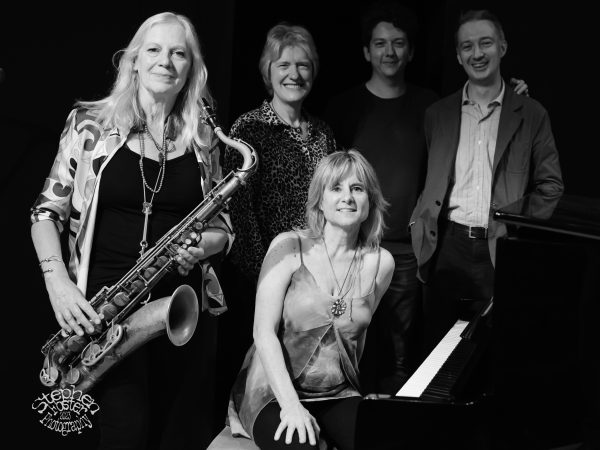
Progress Theatre, Reading 30 June 2023
Freddie Gavita trumpet and flugel horn, Clare Hirst tenor saxophone, Andrea Vicari piano, Marianne Windham bass, Matt Fishwick drums
An ‘end of term’ party atmosphere pervaded the Progress Theatre as the Horace Silver Project kicked-off the final Jazz at Progress gig of a hugely successful 2022/23 season with the unmistakeable tones of ‘Sister Sadie’. Bearing the distinctive hallmarks of pianist, composer, bandleader Horace Silver, the ‘Grandpop of Hardbop’ to whom the evening was dedicated, this piece immediately set toes tapping and heads nodding. How could anyone resist the powerful rhythmic drive of five virtuoso musicians at the top of their form playing music drenched with an intoxicating blend of bebop, blues, funky soul and gospel, tinged with a delicate flavouring derived from Silver’s family roots in the Cape Verde Islands? Horace Silver introduced this new recipe for jazz on unsuspecting audiences well-nigh seventy years ago. Its appeal and potent effect remain as strong as ever.
Silver’s other great strength was in his choice of titles – simple, straight-forward, catchy and to coin a phrase, ‘They tell you exactly what’s in the tin!
‘Pretty Eyes’, from the 1966 Blue Note album ‘Cape Verdean Blues’ is a good case in point; a beautifully lilting evocation of ‘pretty eyes’ conjured by Freddie Gavita’s lyrical flugel horn in combination with the warm tones of Clare Hirst’s tenor saxophone.
The scorching ‘Nica’s Dream’ moved up several gears to pay tribute to the Baroness Pannonica de Koenigswarter. This member of the Rothschild dynasty exchanged her aristocratic lifestyle in Europe to patronise jazz musicians, notably Thelonious Monk – and cats (306) – from her hotel suite in New York. Needless to say, this roller-coaster ride perfectly captured the spirit and eccentricity of this remarkable lady who once raced Miles Davis down Fifth Avenue in her pale-blue Bentley.
Andrea Vicari dug into her piano, especially hired for the occasion from Hickies’s Music Store, ably assisted by Marianne Windham’s bass and Matt Fishwick’s drums to generate some heavy-weight funk on ‘Jody Grind’, and to set up a launching pad for Gavita’s stratospheric trumpet. A truly Gospel ‘Amen’ brought this tremendous number to a close.
Clare Hirst took her place in the ‘pulpit’ to lead the sermon on ‘The Preacher’, Silver’s attempt to ‘reach back and get that old time, gutbucket barroom feeling with just a taste of the backbeat’. In no time at all, Hirst had her congregation eating from her hand and dancing with their feet.
The joyfully exotic ‘Cape Verdean Blues’, featuring amongst its highlights Andrea Vicari at her most compelling and an outing both visually spectacular and brilliantly imaginative by Matt Fishwick on his drums, brought the first set to a dazzling close.
Horace Silver gladly accepted the affectionate moniker of ‘The Hardbop Grandpop’ and used it as the title track on his 1996 Impulse album which marked a return to the classic small group line-up after many years working with larger ensembles. It follows the jazz musicians’ timed-honoured practice of creating a new melody over an existing chord progression – in this case via the old favourite ‘Indiana’ and its subsequent variation ‘Donna Lee’. It all made for a straightforward, nicely paced swinger with a standout bass solo from Marianne Windham.
Clare Hirst, who shared mc-ing duties with Andrea Vicari throughout the evening, cast a knowing glance at the audience when she announced that ‘this next number needs no introduction’. Indeed not. Eyes lit up with instant recognition as the quintet laid down the gently soulful introduction to ‘Song For My Father’, arguably Silver’s most beguiling and often played composition. Freddie Gavita soloed to great effect, the beautifully placed notes flowing with crystalline clarity.
In contrast to the fun and danceable good spirits so far expressed, the next two numbers, ‘Ecoroh’ and ‘Peace’ revealed the emotional depth of Horace Silver’s musical imagination. I found the dark edge of the first and the poignancy of the latter deeply moving.
‘Nutville’, on the other hand was a case of watching the touchpaper being lit ahead of the band taking-off on a voracious flight of invention. An explosive performance, especially in the percussion department where the ferocious complexity of Matt Fishwick’s drum patterns belied his otherwise gentle and thoughtful demeanour.
First recorded by the Silver quintet in 1954 and with lyrics later being added by Jon Hendricks, the bluesy ‘Doodlin’’ has been covered by just about everyone from Ray Charles to Dusty Springfield. A further reminder of Silver’s universal appeal and enduring legacy, it made the perfect choice to close a thoroughly entertaining and truly invigorating evening. All praise to the HORACE SILVER PROJECT and best wishes for future success. Promoters please note – THIS IS A FANTASTIC BAND!
As ever, thanks to the Progress Theatre, especially the Front of House Team headed by Stuart McCubbin and techno wizard Rich Saunders for sound and lighting. And a special thank you to our audience, particularly the youngsters we’ve welcomed recently. Your generous support makes it possible to continue presenting the very best of live jazz on the Progress stage.
Review posted here by kind permission of Trevor Bannister
Photo by Steve Foster @jazzshots (Instagram & FB)
======================================================
Jazz at Progress will recommence on Friday 15 September when Pigfoot Plays Ellington.
Chris Batchelor trumpet, James Allsop baritone sax, Liam Noble piano and Paul Clarvis drums will present their unique interpretation of material drawn from Duke Ellington’s fabulous repertoire.
‘An entertainingly riotous, swinging, delicate, gnarly account of Ellington’s legacy is promised.’
Watch out for details on the Jazz in Reading website www.jazzinreading.com
Alex Clarke Quartet – June 2023
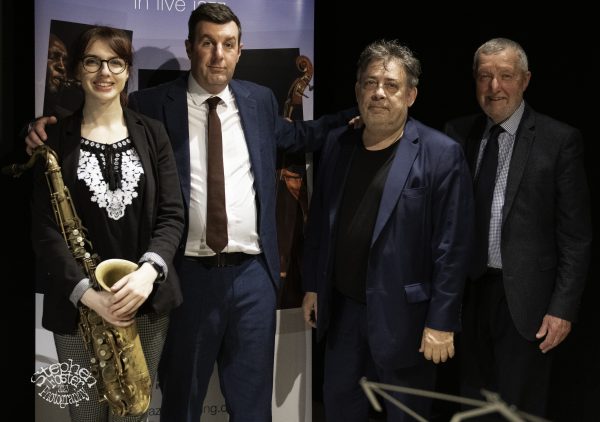
Progress Theatre, Reading 2 June 2023
Alex Clarke alto & tenor saxophones | Rob Barron piano | Dave Green bass | Clark Tracey drums
Whenever the naysaying purveyors of doom gather together to contemplate the lack of new personalities on the jazz scene and the imminent demise of the music, a new talent is sure to pop up and prove them wrong.
One such is saxophonist Alex Clarke. Voted Rising Star in the 2019 British Jazz Awards, a finalist in the 2020 BBC Young Jazz Musician Competition, a nominee for the Parliamentary Jazz Awards for both 2021 and 2022 and with a hugely successful appearance at the 2022 Swanage Jazz Festival, her career has progressed rapidly in a short space of time.
Though her versatility spans composition, teaching, session work and other music besides jazz, the classic format of her quartet reveals a passionate affinity for the rich heritage of the Great American Songbook and the jazz standards of the post-war era. That Alex is joined by three of the most accomplished musicians ever to grace the jazz scene, with a combined experience of something approaching a staggering 150 years, is a measure of the esteem in which she is held.
The expressive, beautifully toned quality of her playing and engaging personality immediately captured the imagination of the near-capacity Progress audience with Jimmy Heath’s ‘Sound for Sore Ears’. A beguiling, slightly haunting tenor introduction launched a flow of joyously swinging invention on the part of Clarke and Barron, with the sublime support of Dave Green’s bass and Clark Tracey’s drums. No one could doubt that the future of jazz is safe in Alex Clarke’s hands.
A walking pace ‘On the Street Where You Live’, a smash hit from Lerner and Loewe’s ‘My Fair Lady’, inspired the spirit of Sonny Rollins. I especially loved the way Clarke repeated the theme over-and—over-again with the subtlest of variations to create an ‘edge of your seat’ sense of suspense ahead of her opening solo.
As Clarke took up her alto sax and announced her intention to pay tribute to the great star of the instrument Phil Woods, a voice broke up the audience with a sudden cry of ‘I like Phil Woods!’ And why not? ‘Brazilian Affair (Intriga Amorosa)’ drawn from Woods’ 1977 album ‘Live at the Showboat’ was full of searing Latin-American magic that set the toes tapping and the heads nodding. Great fun!
Dave Green and Clark Tracey took a well-earned breather from ‘stoking the boilers’ leaving Alex Clarke and Rob Barren to perform Billy Strayhorn’s ‘Ballad For Very Sad and Very Tired Lotus Eaters’ as a duo. Strayhorn’s role of collaboration with Duke Ellington from 1939 until his death in 1967 and as composer of the Ellington Orchestra’s famous theme, ‘Take the “A” Train’, tend to overshadow his remarkable gifts as a composer in his own right. It was wonderful to hear this example of his romantic and dreamlike imagination played with such sensitivity and feeling. Not surprisingly, it received rapturous applause.
With everyone reassembled on stage, and Clarke back on alto, the quartet played out the first set with a scorching interpretation of Charlie Parker’s bebop classic ‘Segment’, featuring the dynamic drums of Clark Tracey.
Cole Porter reputedly composed ‘Just One of Those Things’ over one night as a last-minute addition to the score of the 1936 musical ‘Jubilee’. Its gaiety and freedom of expression stands as an enduring reminder of Porter’s genius. The highlight? The timing and gorgeous tone of Dave Green’s bass solo.
Alex Clarke brought her own composing skills to the fore with ‘Only a Year’, a title she explained, dedicated to ‘the time I spent at music college before I dropped out’. Once again, I was deeply impressed by the haunting tone of her tenor sax, Rob Barron’s free flowing invention on the piano and the unity of the band as a whole.
Jule Styne’s ‘By Bye Baby’, another nod to the influence of Phil Woods from the ‘Showboat’ album, hit an irresistible medium-paced groove and opened up the space for plenty of good-humoured ‘4s’ around the band.
‘Darn that Dream’, the one success to emerge from Jimmy Van Heusen’s hugely ambitious but otherwise ill-fated 1939 musical ‘Swingin’ the Dream’, a jazz interpretation of ‘A Midsummer’s Night Dream’, was an absolute object lesson in how a quartet should interpret a ballad. Individually and collectively the band knitted together perfectly to give full voice to Van Heusen’s unforgettable melody. Also, Alex Clarke knows how to end a tune on exactly the right note!
Erroll Garner’s bluesy ‘Shake it But Don’t Break It’, driven along by Clark Tracey’s compelling shuffle-rhythm, should have rounded off the evening. But there was no way that the band would be allowed off the stage without an encore. Amid thunderous applause, and ‘Since you asked so nicely’, they duly obliged with a swinging interpretation of Rodgers and Hart’s evergreen ‘Have You Met Miss Jones’ to bring a truly memorable evening to a close.
‘An extremely accomplished player now and a big star for the future,’ was just one of many positive comments overheard as the audience filed out of the auditorium. Enough said!
May I welcome Steve Foster to the Jazz at Progress team as House Photographer and as ever, thank the Front of House team for their warm hospitality and great service and Rich Saunders for the excellent quality of the sound and lighting.
Once again it was a true pleasure to welcome so many younger members to the audience on this delightful summer evening. Who knows, perhaps they may be inspired to take up an instrument and one day become jazz stars themselves?
Review posted here by kind permission of Trevor Bannister
Photo by Steve Foster @jazzshots (Instagram & FB)
Leon Greening Trio with Alex Garnett – April 2023
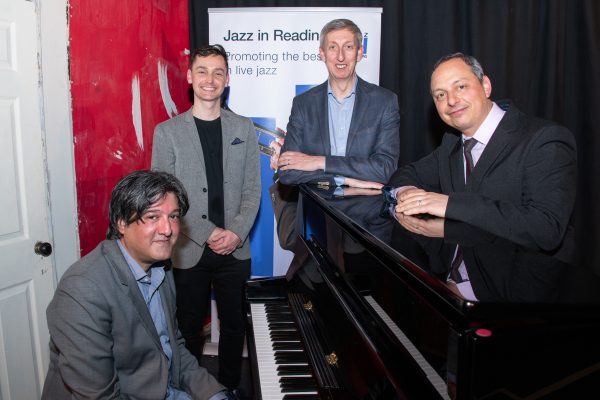
Progress Theatre, Reading, Friday 28 April
Leon Greening piano | Adam King bass | Steve Brown drums
Plus guest Alex Garnett alto saxophone
Leon Greening could have offered no finer memorial tribute to his late father, Alan, than his performance at the Progress Theatre on Friday 28 April. Emotionally charged with the grief of a loss suffered only twelve days prior to the concert, Leon raised his stellar talent to even greater heights for love of his ‘dear Dad’: the inspiration and guiding light for his career in jazz.
It was entirely appropriate that he should open the gig with his trio and one of his father’s favourite tunes, Bobby Timmons’ ‘This Here’. ‘Dad would play this on his turntable, ’Leon recalled, ‘and I would do my best to play along in unison with Bobby. Listening to that great music with my Dad was how I became a jazz musician.’
And what a jazz musician! All the hallmarks of Greening’s remarkable style were evident in this gospel soaked piece set in swinging 3/4 time; an irresistible mix of emotional power, knife-edge tension, unfailing invention and effervescent swing that sweeps you along in its wake. The contributions of bassist Adam King and drum ‘maestro’ Steve Brown ensured a matchless quality to the cohesion of the trio.
At this point Leon welcomed his ‘big brother’ and special guest to the stage in the person of the wonderful Alex Garnett, a world-class musician equally adept on any member of the saxophone family, but on this occasion playing alto. The blistering heat of ‘The Loop’, a composition by fellow altoist Vincent Herring, recalled Leon’s 2011 visit to New York along with Alex and Steve, when they played with Vincent on his home territory and recorded the album ‘Cookin’ in Brooklyn’.
Alto saxophonist and bandleader Julian ‘Cannonball’ Adderley was another favourite of Leon’s father and became an enduring influence in his own career. ‘Wabash’, from Cannonball’s 1959 album ‘The Cannonball Adderley Quintet in Chicago’ (in reality the Miles Davis working band of the day, including John Coltrane but minus Miles), bounced along with its delightfully melodic theme fused with a deep feeling for the blues. Adam King produced a standout solo on the bass accompanied by the hand-drumming of Steve Brown.
Billy Joel’s ‘52nd Street’ album bore homage to the 1.9 mile stretch of Midtown Manhattan roadway once known as ‘Swing Street’, where a proliferation of steamy basement jazz clubs played host to the giants of jazz – such legendary figures as Billie Holiday, Lester Young, Art Tatum and Charlie Parker – in the 1940s and 50s. Greening’s interpretation of ‘Rosalinda’s Eyes’, with Garnett’s searing alto to the fore, captured the free-wheeling, boundary pushing spirit of those now far-off days.
‘Hindsight’, a beautifully reflective piece composed by Cedar Walton – one of Greening’s latter-day heroes with whom he spent much treasured time in conversation – achieved a perfect balance between sound and emotion, which lingered in the mind long after the final notes had faded away. Superb!
An improvised foot-stomping, rip-roaring blues, with Greening’s two hands rolling the piano keys, brought the first set to a resounding close. He later dedicated the piece to everyone at Progress on that evening, under the title ‘Blues in Progress!’
On his return to the stage with his trio, Leon recounted how his father, who loved Bud Powell, had annotated an album of Bud’s music with a post-it note saying, ‘Bud Powell, the true genius of modern jazz piano’. As a young teenager Leon would sometimes be presented with a transcription of one of Bud’s solos which he would practice incessantly until he was note-perfect. ‘I wanted to play like Bud,’ he recalled, ‘and impress my Dad.’
One of those pieces, ‘Celia’ which Bud wrote in 1949 on the birth of his daughter, Leon now dedicated to his ‘darling Dad’. Taking a headlong plunge into Powell’s charming theme and with King and Brown in full support, Greening allowed his imagination free rein to build layer upon layer of the most white-knuckle improvisations you could possibly imagine. This was jaw-droppingly superb!
With scarcely a pause for breath, the trio now joined by Alex Garnett, launched into ‘If This Isn’t Love’ a flag-waving showstopper by Burton Lane and Yip Harburg which found fame in the musical ‘Finian’s Rainbow’. The subtle interplay between the musicians on this number was an absolute delight.
By contrast, Antonio Carlos Jobin’s ‘Corcovado (Quiet Nights of Quiet Stars)’ captured the unique quality of reflective nostalgia that is so often a feature of Brazilian music.
By way of a clue to the composer of the next piece, Leon struck the instantly recognisable opening notes to ‘Moanin’’. Of course … Bobby Timmons! He then explained how the next composition came about on the recording of Bobby’s 1966 ‘Soulman’ album. “The great Ron Carter, the bass player on the session, turned to Bobby after they’d finished recording an as yet untitled track and demanded to know what it was called. ‘Damned if I know’, came the reply.” In keeping with its title, the tune expresses a quizzical air of mystery. Alex Garnett added to the fun by dropping in a quote which kept me guessing where it was from until I returned home. A hasty scurry through Coltrane’s ‘Giant Steps’ revealed famous origin – the enchanting opening to ‘Syeeda’s Flute Song’.
Garnett’s impassioned alto was again to the fore in a swinging straight-ahead arrangement of Billy Joel’s ‘Zanzibar.
This object lesson in how to structure the dynamics of a piece and bring it to a perfect resolution – the closing notes gently distilling into the air, created exactly the right setting for Duke Ellington’s classic ballad ‘Prelude to a Kiss’, a further deeply felt tribute by Leon Greening to his late father.
An emotional and unforgettable evening of music came to a close with a funky portrayal of Leon’s favourite animal ‘The Leopard ’, a Greening original and a fitting final tribute to the father he loved so dearly.
On behalf of us all at Jazz in Reading we offer Leon and his family our deepest condolences on the death of his father Alan and thank him for so generously sharing his gift of music with us at such a difficult and sad time.
Leon, your Dad will be immensely proud of you and his spirit will remain with you through your music.
***
As ever, our thanks to the Progress front of house and lighting teams and a particular thank you to the audience whose magnificent support meant that we could hire a ‘real’ piano from Hickies of Friar Street for this special occasion.
Review posted here by kind permission of Trevor Bannister
Photo by Colin Swain
Zoë Gilby Quartet – March 2023
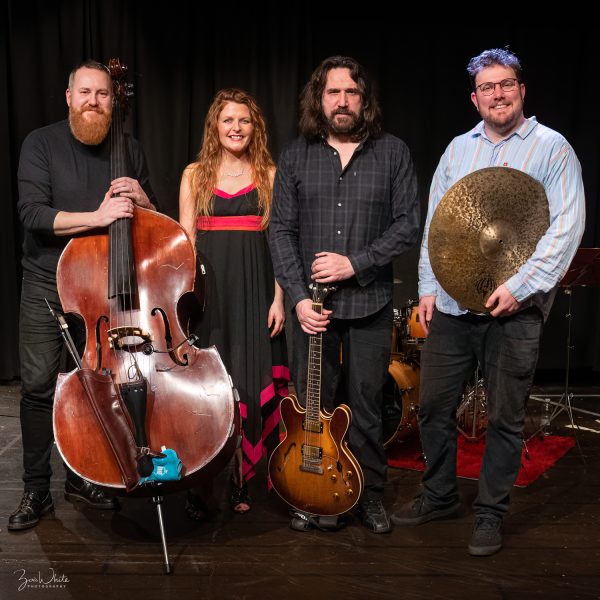
Progress Theatre, Reading, Friday 17 March 2023
Zoë Gilby vocals | Mark Williams guitar
Andy Champion double bass | John Bradford drums
If there were any signs of the travelling blues after a 300-mile, 5-hour journey from Newcastle-Upon-Tyne to Reading, they weren’t visible as prize winning vocalist of the 2019 Parliamentary Jazz Awards, Zoë Gilby and her musical companions lit up the stage with their debut performance for Jazz at Progress.
By the second chorus of the opening number, ‘Travelin’ Blues’, a 1961 recording by jazz legends Dave Brubeck and Carmen McRae, Gilby had the audience eating from the palm of her hand; her sense of swing and expression, the clarity of her diction and the unique qualities and range of her voice was simply enthralling. Clearly, this held the promise of being a ’special’ evening. We were not to be disappointed!
Maybe the second number, ‘In it Together’ a delightful Gilby original in waltz-time gave the best possible clue as to what her approach to music is all about – sharing – a basic ingredient of all great jazz.
Nor should one forget humour, albeit in this case of the sardonic variety – a quality that permeated ‘You Turned the Tables on Me’, an enigmatic popular song first made famous by bandleader Benny Goodman and his vocalist Helen Ward way back in 1937. The lyrics present a brave face on the reality of ‘Being Dumped’ and that ‘I got what was coming to me’. Should there be any regrets? An astonishingly full-bloodied scat solo (closer in style to Louis than an Ella flight of invention) cut to the heart of the matter and left no doubt about Gilby’s true feelings. Revenge!
In a measure of Gilby’s versatility, she moved seamlessly from the ‘killer-diller’ days of the ‘Golden Age of Swing’ to the poetic magic of ‘Aurora’, a collection, one could say a ’suite’, of her own lyrics set to the melodies of American trumpeter/composer Tom Harrell.
In the first three pieces to be presented, the titles alone – ‘Ebb and Flow’, ‘Shadowed in Solitude’ and ‘Forget the Past’ – evoke vivid images in the imagination. The subtle combination of words, melody and the sensitive support and inventive solos of Williams, Champion and Bradford proved to be absolutely spellbinding. One line in particular, from the joyfully optimistic ‘Forget the Past’ will remain with me for a long time hence, ‘the adventure never waits’. What a message for getting on with life!
‘Your Words’, another original and also a tribute to vocalist Jacqui Dankworth whose performance at the Sage concert hall in Gateshead and encouraging words helped to inspire a youthful Zoë Gilby, packed a more direct emotional punch. A wailing solo from guitarist Mark Williams echoed the sorrow and bitterness of the vocal.
Everyone cut-loose for the final number of the first set with a romping, free-flowing interpretation of Wes Montgomery’s ‘West Coast Blues’, featuring a stunning solo from bassist Andy Champion and a hilarious scat from Ms. Gilby in honour of St Patrick’s Day appraising the various merits of Guinness – the interval drink of choice which was apparently in short supply at the bar.
The huge, soulful Mingus-like sound of Andy Champion’s bass came to the fore in a duo with Zoë Gilby to open the second set with Tom Wait’s earthy ‘Way Down in the Hole’.
This outstanding performance was matched in emotional impact by a deeply moving interpretation of Leon Russell’s ‘A Song for You’ – a piece with special meaning for Gilby which she sang at her father’s wake.
The enchanting ’Leap to the Limelight’ took us back to the magical paring of a Tom Harrell melody with Zoë Gilby’s lyrics. This captured the spirit, with marvellous interplay between the members of the band, of those who are simply born to dance.
‘Secret Love’ demonstrated yet again Zoë Gilby’s remarkable versality with a tribute dedicated to Doris Day and Carmen McRae. Describing them as the ‘Ying and Yang’ of popular song, she proceeded to first sing the song in the style of Doris, filling the auditorium with the soaring power of her voice and secondly in the more intimate, sassy style of Carmen. Brilliant!
The next number began life as the instrumental ‘Concerto for Cootie ’ featuring trumpeter Cootie Williams with the Duke Ellington Orchestra. Lyrics were later added by Bob Russell to create ‘Do Nothin’ Till You Hear From Me’, performed here as a rather cheeky rhumba. The light and shade of John Bradford’s drumming was especially effective. He has that rare quality of being able to swing without having to turn the volume control up to 11.
Zoë Gilby’s creativity and love for words bore further fruit in ‘Your Dear Heart, My Dear Heart’, a beautiful reflection that love is simple, ‘it’s everything else that’s complicated’, based on Tom Harrell’s melody ‘Scene’.
Patrick Hamilton’s 1929 novel ’Twenty Thousand Streets Under the Sky’ provided the inspiration for ‘The Midnight Bell’, an evocation of a seedy East London pub inhabited by a rich variety of nefarious characters whose stories the novel relates. The words and music captured the darkness of the atmosphere perfectly.
‘Centerpiece’ credited to trumpeter Harry Edison and ace-vocalist/lyricist Jon Hendricks brought the evening to a swinging and rousing close.
The warmth, exuberance and creativity of Zoë Gilby’s performance and the musicianship of her quartet will have secured a place in the affections of the Progress audience. Let’s hope that it’s not too long before they make a return visit to Reading. Meanwhile, check out her album ‘Aurora’ on this link https://zoegilby.bandcamp.com/album/aurora
As ever, thanks to our hosts at the Progress Theatre for the excellent sound and lighting and for taking good care of our safety and refreshment.
And finally, but by no means least, our thanks to House Photographer Zoë White who is relinquishing her role to concentrate more time in other pursuits including singing. Zoë has assembled a unique record of performances at Progress over the past eight years which grace the Gallery on the Jazz in Reading website – a wonderful reminder of some great jazz moments. https://www.jazzinreading.com/gallery/
Thank you Zoë … we shall miss you, but wish you every success in the future.
Review posted here by kind permission of Trevor Bannister
Photo by Zoë White Photography
Gary Willcox’s Drummer/Composer Project – February 2023
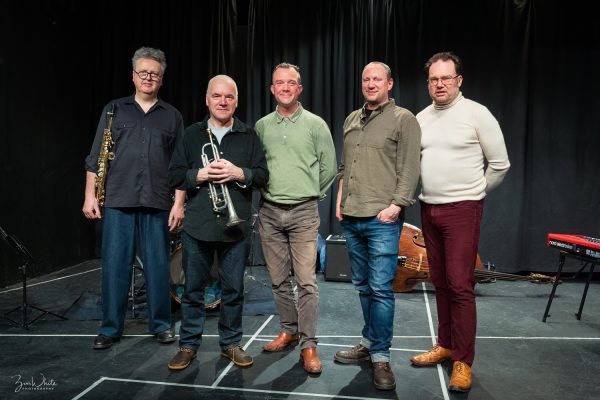
Progress Theatre, Reading, Friday 3 February 2023
Julian Siegel saxes | Chris Batchelor trumpet | Gary Willcox drums |Oli Hayhurst bass | Gareth Williams piano
“Wow, what a brilliant gig, the best I’ve been to for a long while,” was just one comment overheard as an enthralled audience made its exit from the Progress Theatre on Friday 3 February after two exhilarating hours of jazz at its most creative in the company of Gary Willcox’s Drummer/Composer Project.
The advance publicity was absolutely spot-on; this remarkable tribute to the composing talents of drum legends Kenny Clarke, Denzil Best, Elvin Jones, Paul Motian, Peter La Roca, Tony Williams, Jack DeJohnette and Bill Stewart and their contribution to the evolution of jazz across eight-decades from be-bop to ECM and beyond, scaled the heights of “inspiring, in the moment playing”.
Seasoned veterans all, but new to the stage of Progress, Chris Batchelor, Julian Siegel and Oli Hayhurst quickly made their mark amid ‘Three Card Molly’’, a veritable explosion of raw energy bearing the unmistakeable hallmarks of its composer – Elvin Jones.
Gary Willcox revealed his own composing skills to spell-binding effect in ‘The Arrival’, its intrinsic lyricism heightened by the delicate interplay between Batchelor and Siegel over an atmospheric background conjured by the rhythm section. Willcox’s use of hand-held bells and a single-stick snare drum roll was especially impressive.
However, imagine the shock and surprise of suddenly being transported from this trance-like state of sublimity to the heat and intense fury of Pete La Roca’s ‘Basra’ – a real whirling-Dervish of a number. Talk about a ‘wake-up’ call! By all accounts, La Roca, along with his bassist colleague Steve Swallow, had taken LSD on their way to recording his debut album as a leader for Blue Note in 1965. As you might expect, it produced rather startling results in the studio – replicated here without, I might add, any stimulants others than Progress tea!
In his 1940/50s heyday Denzil Best was noted for the swinging quality of his brush work accompanying such piano stars as George Shearing and Erroll Garner. He was also a composer of some note with credits including the great bebop anthem ‘Wee’ (aka ‘Allen’s Alley’), ‘Bemsha Swing’ (a collaboration with Thelonious Monk) and most famously ‘Move’, which appeared on the classic Miles Davis album ‘Birth of the Cool’. On this occasion it received the full bebop treatment with everyone ‘champing at the bit’ to keep up the breakneck tempo. Great fun!
Paul Motian, a member of Bill Evans’ groundbreaking trio of the early 1960s and a drummer of exceptional sensitivity, was in an ebullient mood when he penned ‘Mandeville’. Its infectious calypso spirit evoked the warm glow of Caribbean sunshine with ‘dreamy’ solos from Oli Hayhurst and Gareth Williams and a delightful closing duet from Chris Batchelor and Julian Siegel.
They continued to bounce ideas off each other in ‘Think Before You Think’, a quirky conversation piece for trumpet and tenor saxophone by Bill Stewart. This timely advice brought the first set to a resounding close and a well-earned break for the musicians.
And so to the second set … Oli Hayhurst’s expressive and increasingly intense bass lines led the way into ‘Epistrophy’ and an absolute masterclass in the use of time, space and melodic invention. All praise to Gary Willcox and his Drum/Composer Project for interpreting this timeless classic, jointly credited to Thelonious Monk and drummer Kenny Clarke and dating from 1941, with such faithful attention to its original spirit. It was a joy to listen to: for me, the highlight of a very special evening.
Julian Siegel is shortly to be leading his own big band on a tour of major UK venues including Ronnie Scott’s in London. He swapped his tenor for a soprano saxophone to soar freely above a melee of sound and rhythm in his portrait of ‘Ahmed the Terrible’, a track composed by Jack DeJohnette in 1982 for his band Special Edition.
The opening notes of Chris Batchelor’s superlative introduction to ‘Pee Wee’ instantly caused the hairs to rise on the back of my neck. What a sound! An echo from Miles Davis’s 1967 ‘Sorcerer’ album. Solos by Julian Siegel and Gareth Williams perfectly sustained the mood of wistful reflection.
Tony Williams was just twenty-four when he composed this tune and already a veteran of five-years as drummer with Miles’s second great quintet. He went on to compose many tunes for his own bands, including the Latin-tinged ‘Sister Cheryl’ which followed ‘Pee Wee’. Tragically he died from a heart attack at the all-too-early age of fifty-one whilst undergoing a routine gall bladder operation.
A tiny spark of an idea, from the prodigious imagination of Paul Motian, lit the fuse for a volcano of free expression that had been threatening to erupt all evening. This joyous outburst of collective invention neatly summed up the spirit of the evening. It couldn’t be matched, even by the flag-waving brio of the finale, ‘Salt Peanuts’.
A fantastic evening that will stay etched in the mind for a long time to come. Don’t miss this show if it comes to a club near you!
Our thanks first and foremost to the members of Gary Willcox’s Drummer/Composer Project – Chris Batchelor, Julian Siegel, Gareth Williams, Oli Hayhurst and Gary himself. Also a special word for Jason Yarde who was originally scheduled to play the gig before he suffered a stroke in late 2022. We wish him a speedy recovery and look forward to his return to ‘active duty’.
Of course, thanks to the volunteers of the Progress Theatre for their hospitality and technical skills in sound and lighting.
And finally, it was especially pleasing to see several young people in the audience (and I don’t mean people who haven’t quite reached retirement age). We hope they enjoyed the music and look forward to seeing them again. With friends maybe?
Review posted here by kind permission of Trevor Bannister
Photo by Zoë White Photography
Alan Barnes’ “Copperfield” – A Dickensian Jazz Suite | December 2022
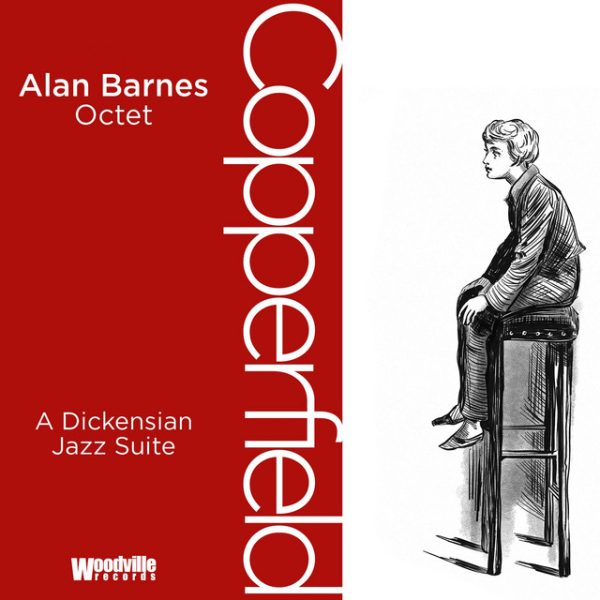
Progress Theatre, Reading, Friday 16 December 2022
Alan Barnes alto saxophone, clarinet, bass clarinet, composer, arranger | Robert Fowler tenor saxophone, clarinet | Karen Sharp baritone saxophone, clarinet | Bruce Adams trumpet, flugelhorn | Mark Nightingale trombone | Dave Newton piano | Simon Thorpe bass | Clark Tracey drums
One day, cultural historians may study the link between lockdown and creativity. Meanwhile, with the same lineup and personnel as his 2019 visit here, Alan Barnes returned to a practically full house with his Suite from that time.
There’s a lot to digest in his writing for octet. All the pieces feature changes in tempo, and metre, alternation of unison and harmony, and varied voicing across brass and reeds. Each song is structured into several sections, with interludes of diverse length, and solos are backed in many different ways. Or… you can just sit back and enjoy.
‘Copperfield Theme’, the opening number, depicts David’s home life in three sections. A slow, pretty melody with clarinet lead, gives way to a punchy theme in triple time. Solos from brass and reeds follow, then unison, and harmonised ensemble, before a reprise of the first melody.
‘Mr. Peggotty’s Boathouse’: David is sent off to Yarmouth: an uptempo piano intro, then a lively jazz waltz, lead on to a trumpet improvisation with skyscraper passages, next a contrasting very relaxed piano solo. Finally the waltz returns, and to end, soft riffs, and a quiet, muted trumpet.
‘Mr. Barkis’: a return home for DC, and a bass feature for Simon Thorpe. He starts with the theme statement, then walks with the orchestra. Some stop time, and trumpet solo, take us to a bass solo with piano and drums accompaniment, before the final ensemble.
‘Creackle and Tungay’: David’s school days, and portraits of teacher (Bruce Adams) and caretaker (Karen Sharp). A latin intro from the rhythm section goes into a swing feel with fine baritone and trumpet solos. There’s a baritone /trumpet duet, before a final piano note, that slowly rings out to nothing.
‘Tommy Traddle’s Skeletons’: billed as a ‘danse macabre’ for David’s school friend who drew skeletons, the piece starts with the suitably ‘sparse’ sound of Robert Fowler’s clarinet accompanied by bass. Two high register clarinets play a later section, and, after a clarinet solo, complete the song.
‘Murdstone and Grimby’: David is sent to work in the bottling plant of the title: Mark Nightingale plays the first partner, Alan Barnes the second. There’s a virtuoso solo by the leader on alto, with a lot of double time over a ‘two’ feel. More solos follow, and an ensemble with baritone and bass in unison.
‘Mr. Dick Flies His Kite’: back on the coast, we meet a minor jazz waltz, realised by trumpet and trombone. A pretty, but sad melody, leads to, as Barnes explained, a “more uplifting” passage, before “coming down to earth”. Solos are spread across the band. A tinkling piano diminuendo describes the kite’s descent.
(Interval)
‘Mr. Micawber’: Alan Barnes’ “Copperfield” – A Dickensian Suite | December 2022a jaunty jazz waltz represents the character who provides lodging for David. Rising and falling baritone lines may suggest Micawber’s mood swings, and solos from the leader on clarinet, and piano take us back to the theme.
‘Little Em’ly’: Barnes’ early career often found him playing Klezmer music: a plaintiff minor melody depicts David’s childhood sweetheart and the arrangement reflects that ethnic tradition. Bruce Adams on plunger-muted trumpet plays her seducer, Steerforth. Rob Fowler gives a most expressive tenor solo, as we move into a medium swing tempo, before a reprise of the mournful theme.
‘James Steerforth’: a stately melody depicts the public face of the character, before a passage on alto gives way to an up-tempo latin section. Baritone and bass play a repeated unison figure. In turn a swing theme is introduced. Mark Nightingale delivers an agile double-time solo. Piano chords and bass accompaniment end the return of the original slow theme.
‘Uriah Heep’: Barnes’ bass clarinet portrays the oily character David meets, with a slippery, triplet-based theme. Clark Tracey sets up the number by an intriguing high-pitched meandering. A Duke-ish voicing of two clarinets, muted trumpet and trombone provide some background, before instrumental conversations, and bowed bass ending.
‘Dora and Jip’: tempo movements between triple time and 4/4 unfold after the stacatto-ish line begins. Solos on reeds and brass describe the changing fortunes of Dora and David, and her dog, Jip. A “canine cadenza” is cunningly voiced by Bruce Adams, tailing off in a sad whine…
‘Agnes’: a sweet ballad recalls the young Agnes’ devotion to David. A warm statement on tenor is accompanied by responses from the alto. The trumpet picks up the theme, and there are solos around the band. A quicker feel follows, over the same tempo, and moves to a piano solo. Punchy to start with, the solo moves into a locked-hands, Errol Garner-type feel.
‘A New Life’: a fast minor swing is the setting as the Micawbers and other characters emigrate to Australia. There’s a powerful unison passage voiced for the five frontline parts, on the standard 32 bar form, and a switch to latin for the middle eight. An ensemble where the lead moves between reeds and brass is punctuated by drum fills, followed by a solo from Clark Tracey.
Many thanks to the Jazz in Reading, and Progress Theatre team, for, as Alan Barnes added, “keeping the performing arts alive” in these testing times.
Review posted here by kind permission of Clive Downs
Nat Steele MJQ Quartet: A Portrait of the MJQ – November 2022
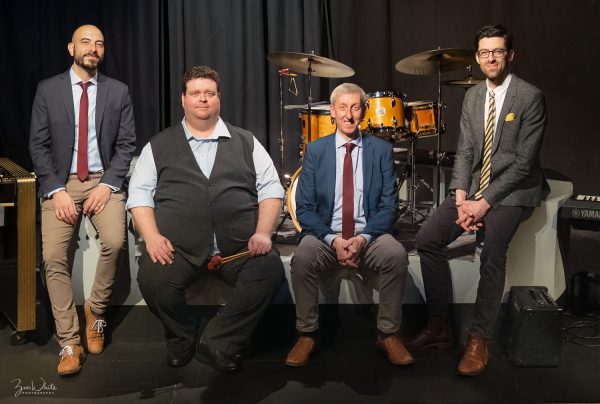
Progress Theatre, Reading, Friday 25 November 2022
Nat Steele vibes | Gabriel Latchin piano | Dario Di Lecce bass | Steve Brown drums
Nat Steele — graduate of Berkshire Young Musicians Trust (now Berkshire Maestros), Reading Youth Orchestra and Reading Youth Choir, who trod the boards of the Progress Theatre as a teenage member of the Progress Youth Theatre and who last appeared on its stage in 2013 with saxophonist Alison Neale — made a triumphant return to his home town on Friday 25 November with his MJQ Quartet to present a captivating ‘Portrait of the MJQ’.
Formed in 1952 by three erstwhile members of the Dizzy Gillespie Big Band – Milt Jackson vibes, John Lewis piano and drummer Kenny Clarke, plus bassist Percy Heath – the Modern Jazz Quartet took modern jazz in a new direction with a unique ensemble sound combining classical formality with jazz fire tinged with a deep feeling for the blues. Under John Lewis’s single-minded tutelage as Musical Director the group achieved outstanding levels of interplay that both excited and confounded audiences and critics. Simply put, they couldn’t distinguish between which parts were arranged and which were improvised. A quality that seems all the more astonishing when one considers a statement by Kenny Clarke to the effect that in the quartet’s early days neither Jackson nor Heath could read music! But boy, did they rehearse!
With only one change in personnel, when Connie Kay took over the drum chair in 1955, the MJQ became one of the most successful and enduring units of twentieth century jazz with a vast legacy of great music now captured in form, spirit, impeccable musicianship and incredible swing by Nat Steele and his richly talented quartet.
With its emphasis firmly placed on straight-ahead swing, Dizzy Gillespie’s exhilarating ‘Woody n’ You’ opened the concert as a tribute to the MJQ’s bebop roots in the Gillespie Big Band of the immediate post-war years. Jackson, Lewis and Clarke plus bassist Ray Brown played as a ‘band-within-band’ to provide the horn players with some relief from the ferocious ‘lip searing’ charts that Dizzy liked to play. The quartet even played some gigs in its own right at Smalls Paradise, in Harlem under the banner of ‘The Atomics of Modern Music’.
‘The Golden Striker’, composed by John Lewis for Roger Vadim’s 1957 movie ‘No Sun in Venice’ was an altogether different creature; a sublime ‘conversation’ piece between Steele’s eloquent vibes and Gabriel Latchin’s more sparse piano, underpinned by Di Lecce’s bass. Steve Brown conjured his magic in the percussion department utilising both triangle and finger cymbals to stunning effect.
Dario Di Lecce and Steve Brown combined forces to recreate the dramatic introduction to John Lewis’s arrangement of Jerome Kern’s, ‘All the Things You Are’. Steele and Latchin followed up by playing the theme in unison before launching into their own free flowing solos, each expressing the tenderness and warmth of this classic standard. The circle complete, we returned to Di Leece’s fleet fingered bass, interspersed with the irregular interjections of Steve Brown’s drum accents. Brilliant!
John Lewis devised ‘The La Ronde Suite’, based on composition he originally titled ‘Bright Lights’ and which was subsequently adopted by Dizzy Gillespie as the more familiar ‘Two Bass Hit’, to showcase each member of the MJQ in turn. As a recording, it occupied two-sides of a 7” EP (hands up if you can remember those!) On this occasion it offered an insightful contrast between the four protagonists as they each interpreted the theme in their own way – Nat Steele’s joyful and spritely swing, Gabriel Latchin’s slightly darker and more reflective musings, the stately grandeur of Dario Di Lecce’s bass and finally the explosive excitement and rhythmic invention which Steve Brown so brilliantly combines with good taste and restraint. The Suite is surprisingly short but marvellously effective. It’s also great fun and closed with loud applause from the near-capacity audience and smiles all round from the band.
‘I’ll Remember April’ shot from the starting gates like a champion greyhound. Needless to say, the tricky switches in time from Latin to straight 4/4 were negotiated with perfect aplomb and the number raced along with everyone contributing to the chase.
Vernon Duke’s gorgeous ballad ‘Autumn in New York’ gave everyone a chance to recover their breath. Evocatively mellow solos from Nat Steele and Gabriel Latchin conjured images of bright sunshine illuminating the autumn leaves of Central Park. As with so many aspects of the MJQ, a single chime on the humble triangle added the finishing touch to a beautifully conceived arrangement.
While John Lewis was undoubtedly the driving force behind the MJQ, the jazz spirit was fuelled by ‘The Wizard of the Vibes’ Milt Jackson. His justly famous composition ‘Bluesology’ not only rounded off the First Set, but encapsulated Milt’s free-wheeling approach to jazz which influenced an entire generation of vibes players, including of course, Nat Steele.
Just as ‘Woody n’ You’ provided a backward glance to John Lewis’s role in the frantic days of the bebop revolution, ‘Rouge’ paid tribute to his contribution as both a pianist and arranger to the Miles Davis influential ‘Birth of the Cool’ recordings of 1949. Featuring the sparkling piano of Gabriel Latchin and a solo of great warmth by Nat Steele, ‘Rouge’ proved to be a very welcome addition to the Quartet’s repertoire. ‘It might have seemed simple,’ admitted Steele, ‘but it’s actually incredibly difficult to play.’
‘’Round Midnight’, with the bridge ‘borrowed’ from Wes Montgomery, was a second addition to the repertoire and all the more welcome for being so rarely heard in a live performance. The quartet captured the mood of the Thelonious Monk masterpiece to perfection.
As I mentioned earlier, listening to the MJQ always poses the conundrum of which parts are improvised and which parts are not. This proved to be a particular problem for the French critic and writer Charles Delaunay when he first encountered the group in its early days; “Is this a jazz group trying to be classical?” he puzzled. “Or is it a classical group trying to play jazz?” John Lewis summed up the situation nicely with the delightful good humour of ‘Delaunay’s Dilemma’.
The fragile beauty of ‘Milano’ reflected John Lewis’s fascination for all things European, while his obsession with J. S. Bach bore full fruit in the introduction and coda to ‘Softly as in a Morning Sunrise’.
This brought us to the penultimate number of the evening, John Lewis’s classic composition, ‘Django’; a flawless emotional and musical balance between the grief expressed for the loss of Django Reinhardt and a celebration of the exuberance and life-enhancing spirit that he brought to the world through his colourful musical career. Magnificent!
The two one-hour sets had passed in a trance. It remained only for the quartet to bow out on what else but ‘Bags Groove’ – a final dedication to Milt Jackson.
In common with so many projects, COVID brought a halt to the touring momentum of Nat Steele’s MJQ Quartet. We are delighted that they are back on the road. Unlike the MJQ, who played in po-faced severity on the one occasion when I saw the band way back in the 1960s, these guys looked to be really enjoying themselves. They clearly relish the opportunity to play together. The fact that Gabriel Latchin drove to the gig from his home in Glasgow and Dario Di Lecce flew in from Valencia, Spain speaks for itself!!!
What’s more, any group of musicians who ‘adapt and overcome’ to the challenge of making use of a massive riser that occupied much of the Progress stage with such imagination and good humour has my vote for the Band of The Year! Indeed, it could have been ‘meant to be’. Nat commented, “We’ve been asking for a riser for seven years and at last we’ve got one, even if it was intended to depict a prison cell.”
And finally, thanks are due to Rich Saunders who works his sound and lighting magic in solitary confinement at the back of the Progress auditorium and to Stuart McCubbin and his Front of House team who look after everybody’s safety and comfort with such care.
Review posted here by kind permission of Trevor Bannister
Photo by Zoë White Photography
The Power of Three – October 2022
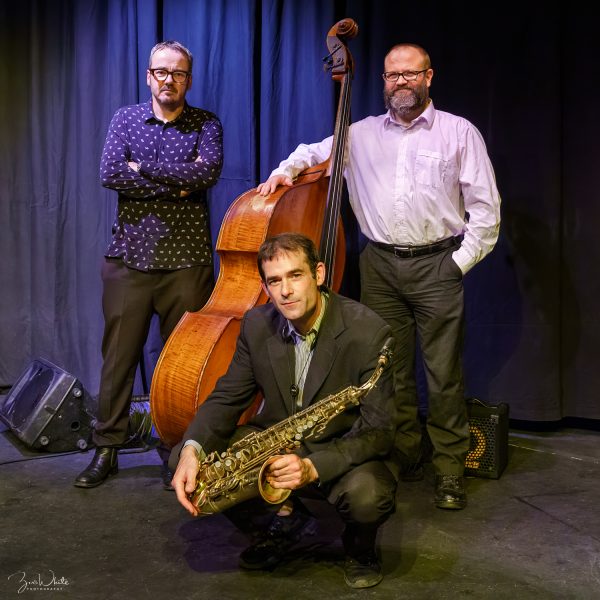
Progress Theatre, Reading, Friday 21 October 2022
Tommaso Starace, alto sax | Jim Watson keyboard | Dave Chamberlain acoustic bass
‘The Power of Three’ – an intense, exciting and rewarding musical experience for both JiR audience and performers
7:30 pm: After Jazz in Reading MC Bob’s warm and witty welcome to all, The Power of Three leapt straight into the show, with no breaks at all until two full numbers had been played:
This Here (Bobby Timmons)
A skittish theme. The solidity and affirming piano chords immediately reminded me of the Billy Taylor theme Film ‘67– but here in a ¾ measure and with a bluesy bass mode. Balance was immaculate between all three players, taking rapid descending figures, nervy cross rhythms, arriving at a long and busy sax solo to a “Yes!” from the audience…Starace disappears through a stage door, the first of a several discreet exits and magical re-entries throughout the evening, as he bobbed in and out of view in between his definitive musical declarations…
Now Jim Watson on piano, filling with both harmony and counterpoints from the start, fingers flying over his pillar-box red Nord 300 – virtually a full band in itself, with Dave Chamberlain on Bass providing a robust platform and powerful rhythmical argument through rapid statements, the duet continued ‘at pace’ with fat chords, fading down to leave bass alone, not simply to give us loads of rapid-fire, but special effects such as ‘hand-wipes’ across the strings added wit and surprise to an already awesome introduction. Solo from Tommaso, chiming in with a brief well-known theme…and a sudden, briefly discordant end to this astonishing opening number!
Warm applause then segue into…
Del Sasser (Cannonball Adderley)
Lyrical, but quick opening with boogey-style Q&A between keyboard and bass. Many notes at a rate of knots, giving an impression of wordless lyrics.
Piano and Bass gave us a story, to sudden re-entry of Starace, adding hurtling runs on sax, and with a hint of passing fire siren…! Remaining urgent and restless, here an abrupt end to sax solo, but resumption of more enigmatic piano and fast bass conversations, with a flavour of bebop in the mix.
After even more excited applause, Starace re-appears, to say a few words… about the two pieces we’ve just heard, then briefly to announce the group’s new Album.
The Power of Three was recorded as a ‘live’ performance, in a real acoustic with no mixing, and no headphones used by the players. (Possibly a celebration of the return of live music and a product of those days in lockdown?) After an introduction, the great Duke Ellington was mentioned regarding this famous title, performed by so many bands…
Caravan (Ellington)
Lovely dark moods and images from the very opening. Exotic modes suggesting Middle Eastern origin, but with celebrations of those mysterious ‘microtonic’ melodic lines in glissando, polychromatic saxophone phrases. Piano gives us spice-laden harmonies and phrasing, tempo rising and Bass (now bowed , not plucked for the first time) echoing the modal colours of this music with beautiful, soulful high notes, way up the fingerboard creating an especially emotive point. (Always, camels seemed to be moving forward in this beautiful piece, treading gently on the lowest, bass tones, with those colours of the scene now super-exciting through off-beats and syncopation, high and ethereal from sax, mixing jagged and unexpected passages (before Tommaso disappears stage left!) Keyboard: Latin, near-Cuban references with restless lines, the motions disturbed with cross-rhythms – a glissando wail as sax re-enters, piano; the bass tapering towards a glorious ending.
Passport (C Parker)
This went quickly on its way, with low sax, walking bass, tight and complex piano chords. A cheeky tune from sax, full, low discords from piano. Tommaso physically came and went, like a Punch and Judy show. That ‘Rolls-Royce’ bass sound, edgy at this stage, with sax flying flippantly overhead, always dancing. Bass became more expressive, but reflected the innate mischief of the soloist.
The trio combined. Bass pizzicato, a light touch, showing ringing, classical clarity, always witty and playful, adding a ‘slap’ sound to a few bars of his articulation repertoire. Luscious orchestral tone, combining with stunningly accurate rapid fingering, the tuning remaining impeccable. A player whose instrument just had to be a deeply ingrained part of his musical language. Sheer quality!
The audience was quickly alerted after these musings, led by the astonishing speed and drive of Tommaso, as fresh musical conversations unfolded, Q&A between the instrumental voices, with jokes and quotes from various sources flying past. Always cheeky and cheerful, but finely-honed. Striding bass from DC over rich, tight chords and flying trapeze from JW. Imaginative, utterly committed playing.
Simply nothing missing.
Autumn in New York (Sam Jones)
Self-deprecating tone of this music, sweet and slow relief, heartfelt and soulful melody with ‘gaps’ between. Gentle solo Piano chords… lighting a clear picture via harmonies and flowing arpeggios to phrases barely heard, but here over the strong Bass; the sounds and city lights, dreamy impressions – suddenly, Sax jumps in!
Conversational, sleazy shapes, then fond memories on this journey…in a flash, Sax has vanished again. Beautiful slow, low and fluid Bass, almost through an alcoholic haze, Sax gives big, airy phrases, reflected in rippling waters from piano…Always that subterranean bass; all ends wistfully…
interval break.
Brazilian Like (Michel Petrucciani)
Wow!
Such chords.
And the Latin rhythms; characteristic melancholy, and mournful memories again. And those exotic, rolling rhythms on a bossa nova feel and then the ethereal tone of Sax …
The streets of Paris – optimism creeps in, excitement builds, colourful rich chords, delicious moments, against a displaced Bass line and now chatter of the Sax solo.
Then: surely not ? A police siren seems to be heard from glissando Sax (who then dives out of sight…) Piano and Bass stick around to reflect, with sweet, dark bass in fluid phrases again. The magic mystery of piano’s fingers, bundles of notes as though in chunks, and…
More urgency is felt, darker and gentler, Bass over broken chords. A song, jumpy and expansive from pizzicato bass, now in 3/4 – or is it 6/8 time?
Sax seamlessly returns, alluding to earlier, lonely melancholy.
A resolution: ‘things are not so bad?’
Cross rhythms as things cool down – and the moment passes.
With the next two tunes ‘If I should lose you’ (Ralph Ranger) and ‘Four’ (Miles Davis), a swing rhythm emerges – from this drum-free trio!
Distinctly swing rhythm 4-in-a-bar from Bass and Piano, Sax flying by. Rich, tight chords underwritten by stride Bass line, Sax above, wild and untamed. Predominantly minor chords, a relentless pulse step, before Sax vanishes… Undeterred, keyboard and stride bass carry the show…before the side-drama of Sax exits and re-entries continues; Piano crossing the rhythmic path, more striding bass, a lengthy duet, with ripe and rhythmical piano, with trilled octaves leaves yet another up-tempo spectacular hanging in the air to a rapturous Progress Theatre.
Segment (Charlie Parker)
This next piece is played so fast, no normal musician could possibly keep up, but these guys certainly do: whirling phrases (Sax Punch and Judy!) piano and bass soloists remain on stage like figures a mad race, lurching, rapid syncopations testing our sense of metre beyond comprehension.
(Unusually, prestissimo participatory audience clapping was encouraged here, but some of us could only get close). And all the while, Tommaso, bobbing in and out of the left doorway; was he making up for the lack of a drum ‘driver’ by adding a splash of bandleader direction? Bass takes over, standing alone, his fluid ‘near-voice’ sound and complete control taking us into a very brief finale.
Nica’s Dream (Horace Silver)
After such intense concentration, this theme begins with a glorious Saxophonic exposition, Bass joins, nimble and in the highest register of this mighty instrument; beautiful piano work, sax returns with a dotted rhythm, fast tempo, with speedy keyboard in support, a sense of ‘no time to waste’ in the air. Here barely-perceptible musical jokes, maybe quotes from other numbers, a be-bop style, with dashing energy propelling all.
The sense and feel of the tightest pulse was felt, in the face of complex express rhythms, brilliantly controlled by Power of Three. In the midst of this driving momentum, glimpses of ‘the circus’ and clown-like fragments. We were all heading somewhere, at breakneck speed! Chord conviction and near-classical influences were there, ultimately with a satisfying ‘stride bass’ security.
Sax and in the centre the keyboard then seemed to be held back by the bass with astonishing skill, almost imperceptibly, to quote the original theme, with sax and bass united, the trio performing as one whole.
Nearing the end…
Then the penultimate piece by Horace Silver
Here a Sax solo, stating a familiar theme; joined by stride bass and piano as ever, the harmonic heart of this larger-than-life Trio.
(Exit Sax soloist…) A crazy chasing duet; piano both hands playing in unison, presenting rapid chord changes…Bass delivers high-speed patterns via nimble pizzicato; Sax seems to have reappeared, for duple and triple measures, lightly woven…then, a surprisingly sudden end!
Power of Three deserved to be tired, but there was no indication…
Work Song (Nat Adderley) – Encore/Finale. There was a ‘farewell’ from Tommaso Starace about the Adderley brothers, and the origin of this traditional ‘chain gang’ chant used by slaves in another era …
The ‘call and response’ character is clear. Wonderfully dark, sad tones; piano and bass make a declamatory call, and a sudden fast four-in-a-bar from Fat and fruity chords, sax runs and fills, hard to see how they effortlessly hang together. Bowed Bass, trills and a further, startling exhibition of the Power of Three’s control of pulse, key, chords, timing…until a split chord before a solid recap of where they began, no holds barred; a dark reminder, in spite of the massive energy on show tonight, of the tragic suffering of so many, many others, not so very long ago.
Applause…
Tommaso Starace tells us he’s soon to leave for a warmer, drier place… I’m sure his fellow musicians will try to persuade him otherwise. This is a closely-bonded and indeed powerful trio oozing with chemistry, and as MC of the evening Bob so eloquently said to an appreciative audience: “Where have these three been, all my life?”
Marc Edwards
For my heroes at Jazz in Reading
31st October 2022
Many thanks , Marc, for a terrific review – from the Jazz in Reading team.
Photo by Zoë White Photography
Jonny Mansfield Quartet – September 2022
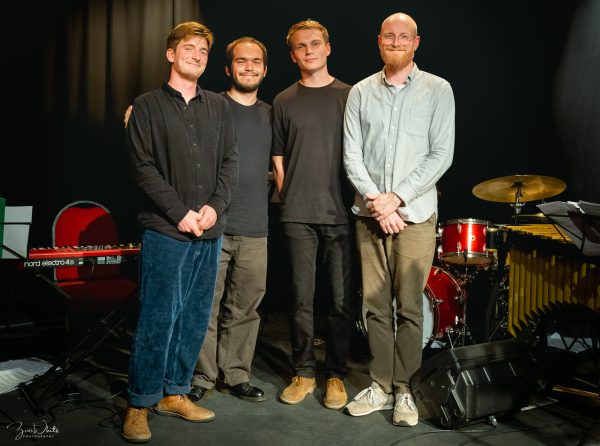 Progress Theatre, Reading, Friday 16 September 2022
Progress Theatre, Reading, Friday 16 September 2022
Jonny Mansfield vibraphone, composer | Noah Stoneman piano
Will Sach bass | Dave Hamblett drums
A sombre time: the evening started with a minute’s silence and reflection; then we breathed again … and the evening’s guests were introduced.
Jonny Mansfield, returning to Reading after his Elftet’s 2018 concert, introduced the quartet’s opener with not so much a title, but a puzzle. What was the connection between Thomas Cook, the first local radio station, and being stuck in local traffic jams? (answer at bottom of page).
The opener highlighted the musical interaction between members of the band. Rhythms shifted, the sound seemed to float in the air, then there were moments when the pulse seemed suspended.
Most small group modern jazz performances used to follow a fixed pattern: introduction, theme statement, solos, repeat theme, ending. In contrast, we heard from this band a free-flowing structure, with collective improvisation, interludes, solos, and different combinations of instruments to vary colour and texture. Dazzling, intriguing music.
The quartet’s programme included a varied mix of original compositions, jazz standards from the bebop era, and one Cole Porter show tune.
Conception is a jazz standard written, we might recall, around the beginning of the Elizabethan era, and attributed to pianist George Shearing. On this selection, we listened to a superb piano solo by Noah Stoneman. Rhythmically complex, – superimposing varying rhythms over the basic beat of the music – and harmonically daring.
The expressive sound of Will Sach’s solo bass playing came to the fore in the tribute to Logan, named for the US alto saxophonist Logan Richardson – unfamiliar to many, but recommended by Jonny.
Jonny explained he had challenged himself over lockdown to write, record, mix, and produce an entire album in one day. From this album (Portrait) the band presented Speak, notable for a solo vibes start, and the gradual addition of bass, drums, and piano.
Jazz is distinctive because of its rhythm: this was a quartet where all four played percussively. Dave Hamblett on drums excelled throughout, but particularly on the penultimate number.
Before the interval we appreciated, in a fine arrangement, the first of two Monk compositions, We See (recorded only twice by Monk). Another less familiar number of Monk’s, Ask Me Now, was included later in the evening.
Jonny had recently recorded in Germany (with different ensembles) two compositions, Cologne, and Ari. These both demonstrated the understated rhythmic base of the band, and how each performance built in intensity.
Organise the Air in Front of You (perhaps a description of improvisation?) ended the evening, with the leader playing, as through all the evening, with great virtuosity.
The programme (all composed by Jonny Mansfield except where noted):
Thomas Cook (but see above!).
Conception (G. Shearing)
Logan
Speak
(interval)
We See (T. Monk)
Cologne
Ari
Everything I Love (C. Porter)
Ask Me Now (T. Monk)
Organise the Air in Front of You
Sincere thanks to the Jazz in Reading team for their unflagging work in bringing live jazz to us.
And our appreciation to all at the Progress Theatre, Jazz in Reading’s hosts. Progress Theatre is the recipient of the Queen’s Award for Voluntary Service, a civil honour equivalent to the MBE.
A new era, a new season for Jazz in Reading.
(Solution to puzzle: Leicester – location of first UK local radio, city with greatest density of traffic lights, destination of first tourist rail excursion devised by T. Cook, and site of the Thomas Cook building and original business).
Review posted here by kind permission of Clive Downs
Photo by Zoë White Photography
Alban Claret & Evan Clegg – The Collection July 2022
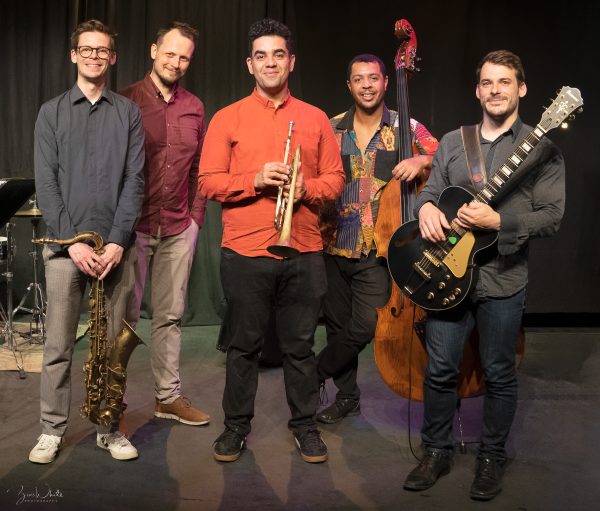
Progress Theatre, Reading, Friday 8 July 2022
Alban Claret guitar, composer | Evan Clegg trumpet, composer | Duncan Eagles tenor saxophone | Chris Hyde-Harrison double bass | Kuba Miazga drums
A week of heat waves, political drama, and cost of living crisis: but Jazz in Reading offered some welcome relief. We were treated to a quintet of accomplished musicians presenting original compositions, blending bop tradition with more modern ideas.
Their programme featured selections from the debut album The Collection, more of their originals, and heritage tracks.
With summer holidays, and competition from jazz festivals elsewhere, both the Jazz in Reading team and the audience were a little depleted, but enjoyed the intimacy of the show.
Evan explained they wrote pieces based on existing jazz numbers (or standards), rather than from scratch. The band created varied textures and colours in the arrangements: unison lines, short collective improvisation, counterpoint and other harmonisation, and varied combinations of tenor, trumpet (open or muted), guitar and bass.
Duncan Eagles has an original voice – expressive, and exploring the upper reaches of the saxophone. Kuba Miazga was a vigorous drummer, responsive to soloists’ changing lines. Chris Hyde-Harrison created tasteful solos and varied accompaniments in the ensembles. Both leaders’ solos proved technically advanced and highly melodic.
The title track from their debut album started the proceedings. A 12- bar melody with a complex line, rhythmically bop-ish, but melodically more abstract, recalled the writing of Lennie Tristano (referenced on their website, along with more familiar bop era influences).
‘Mind Block’, (titled because of difficulty in devising names for their compositions!) followed (another album track). The tune was cunningly arranged, with unison passages, short collective improvisation, and more. Duncan Eagles’ virtuoso solo seemed to conjure up the sound of Tristano’s long eighth note lines.
A relaxed tempo piece, ‘Al A Parker’ celebrated the great innovator. As well as a fine solo from Evan, the ensembles set up a variety of colours – for example. muted trumpet/guitar/tenor unison.
The band reprised Parker’s ‘Klactoveesedstene’, complete with latin intro and ending. Kuba accompanied Alban’s guitar solo effectively with cross rhythms, accents, and textures.
‘Relaxin’ at Sunny Blue’ (based on ‘When Sunny Gets Blue’) was notable for a fine contribution from Chris Hyde-Harrison. He supplied rhythmic support on the theme, then moved to walking bass, before an engaging solo.
‘Unsubscribed Playfulness’, a ballad from the album, closed set one, A trumpet solo started gently, then built in intensity, complemented by more complex drum accompaniment.
‘Stella by Artois’, a chromatic melody based on the chords of the other Stella (by Starlight) started set two. Unusually, the first solo was taken by bass, with Kuba’s brushes in support, and soft guitar chords.
We then heard ‘Winter Pace’ (the tricky ‘Giant Steps’, made more challenging by casting it as a minor theme). Did Alban’s fluent guitar solo remind us of bop-era Barry Galbraith? (A final “that was hard!” from Evan was surprising – they seemed completely at home!)
Evan had been enjoying Buddy Collette’s music and created a composition (‘Mr Collette‘) inspired by the reed player’s arrangements for small groups. Kuba punctuated the sweet harmonies beautifully.
Based on Cole Porter’s standard, the fast ‘Get Al in Town’ (an album track) kicked off with three front line voices unison. As elsewhere, the balance and dynamics between all five seemed to make them all equal participants.
The latin feel of some bop tunes prompted Alban to write ‘Doritos and Sombreros’ (reminiscent of Parker’s ‘Barbados’). After solos from all, the theme concluded neatly with a drum coda.
Woody Shaw’s ‘The Moontrane’ completed the show. Alban in particular improvised with shades of the composer’s trademark sound, a little ‘outside’ the prevailing harmony.
A memorable evening, all highly talented musicians: only at the start of their careers, surely they will find many new venues to welcome them.
With grateful thanks to the Progress team (and of course to all the Jazz in Reading people) for their kind help in enabling us to continue to hear the best in jazz.
Review posted here by kind permission of Clive Downs
Photo by Zoë White Photography
Alex Hitchcock Quartet – May 2022
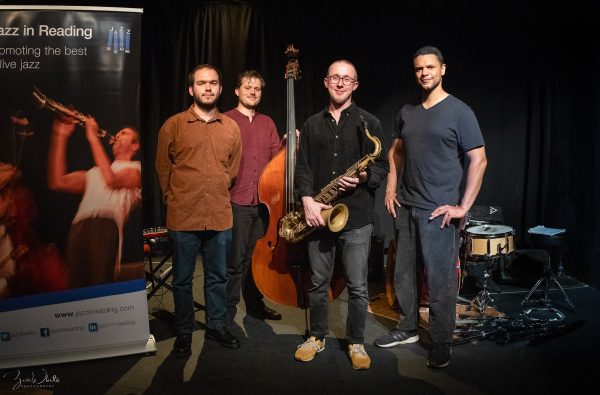
Alex Hitchcock tenor saxophone, Noah Stoneman keyboards, Joe Downard bass, Myele Manzanza drums
Alex Hitchcock was very much ‘a new kid on the block’ when he last performed on the Progress Theatre stage five years ago. Jazz at Progress regulars will remember that he made two appearances within a month of each other. First as a member of Tom Smith’s innovative ensemble. Secondly, and most memorably, as the leader of an exciting quintet. His energy, inventive spirit, original voice as a composer and commanding presence as a soloist, along with his engaging personality, endeared him to the audience on that occasion. It was great to welcome him back on Friday 13 May.
Alex has moved on apace in the intervening years to establish himself as one of the leading musicians of his generation, a status acknowledged by the receipt of numerous awards, appearances at international festivals and a number of highly acclaimed and wide-ranging recording projects. Fortunately for us he remains at home in the quartet format and the company of three kindred spirits – Joe Downard on bass, a long-term ‘partner-in-crime’ who was a member of 2017 quintet, Noah Stoneman on keyboard and the remarkable Myele Manzanza on drums. This formidable line-up combined their talents and skills to create an evening of cutting-edge jazz; sometimes hauntingly lyrical, often moving, occasionally challenging, totally breath-taking, utterly compelling and never far removed from the deepest roots of the jazz tradition.
Noah Stoneman’s eloquent keyboard set the wistful and reflective mood that characterised the first half of the gig; four titles by Hitchcock – ‘Spirits of Objects’, ‘Differentials’, ‘You are Here’ and ‘W. Sach’ plus ‘Lament’ by Joe Downard. This almost uninterrupted flow of intense lyrical invention held one spellbound as each theme emerged with seeming spontaneity from one tune to the next; Hitchcock and Stoneman led the narrative, underpinned by Downard’s economic bass and the restless rhythmic pulse of Manzanza’s drums.
The lovely ‘hanging in the air’ quality in Hitchcock’s playing and compositional style, which keeps you guessing about the direction the music might take, was well to the fore in his extended solo on ‘To Love Itself’ which opened the second set. His light, airy tone fully expressed the joyous spirit of the tune. ‘Chrysalis’ on the other hand explored darker territory in an explosion of free expression, held in check by Stoneman’s delicate touch and Downard’s mournful bass.
As the final notes of this frenzy faded away, the metaphorical spotlight fell on Hitchcock. The form of ‘Body and Soul’ gradually emerged from a beguiling out-of-tempo a cappella improvisation and with the sensitive support of the complete band, Hitchcock captured the majestic beauty of this timeless classic to perfection.
‘Wideye’, featuring brilliant interplay between Downard and Stoneman, saw Hitchcock in driving form on this spritely composition by Joe Downard, serving again as a powerful reminder of the awesome and well-rounded professional skills of these young musicians. Each is a composer in his own right and is being featured in turn as the throughout the current tour.
What treasures that holds in store! And what will Myele Manzanza bring to the party, I wonder? He is one of the most musically colourful jazz percussionists I can think of and clearly immersed in a culture of drumming that extends way beyond jazz influences. A tall, statuesque figure, constantly in motion, he brings a unique visual excitement to the band. None more so than in ‘Hey, It’s Me You’re Talking To’, Victor Lewis’s knuckle-riding standard that brought the evening to a thrilling close.
Having exchanged ‘note-for-note’ phrases with Hitchcock he unleashed not so much a ‘drum solo’ in the usual sense, but what I can only describe as a ‘ceremonial’ expression of percussion artistry. Emotionally super-charged and rich in colour, texture and rhythm this ‘wonder to behold’ left the audience absolutely gobsmacked. What a climax to a magnificent evening!
As I left the auditorium one thought filled my mind; ‘I must not wait another five years before I next listen to Alex Hitchcock in a live setting.’
As ever, our thanks to the Progress Front of House Team for their warm hospitality and the smooth running of the show and to Richard Saunders for the excellent sound and lighting.
Review posted here by kind permission of Trevor Bannister
Photo by Zoë White Photography
Wakey Blakey – with the Rory Ingham/James Davison Sextet – April 2022
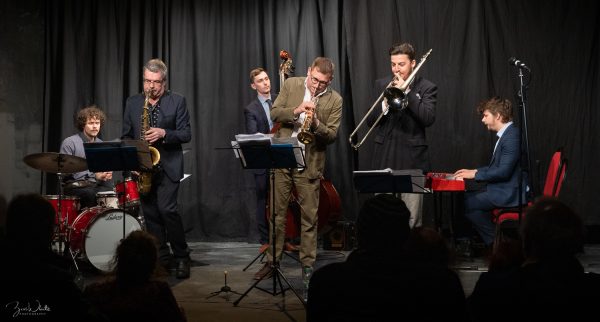
Progress Theatre, Reading, Friday 8 April 2022
Rory Ingham trombone, James Davison trumpet, Mark Lockheart tenor saxophone, Will Barry keyboard, Adam King bass, Felix Ambach drums
The late and much-lamented Art Blakey was well known (infamous some might say) for taking advantage of any situation to spread the ‘Word’ of Jazz. On one occasion we are led to believe, he took to his feet when a momentary silence occurred during a funeral service and said, ‘If there are no more tributes to be paid to our dearly departed brother, I should like to say a word about jazz.’
A professional musician in his teenage years and a bandleader from the 1940s until his death in 1990 aged seventy-one, Art embodied the attributes of driving swing and blues/gospel-soaked virtuosity that came to be known as ‘Hard Bop’. His ‘Jazz Messengers’ became a forcing ground for the most talented young musicians of the time. It was also a platform for the writing skills of such people as Benny Golson, Wayne Shorter and Freddie Hubbard. The Messengers toured relentlessly across the world, appearing at concerts, clubs and festivals and recorded extensively, attracting an audience way beyond the boundaries of most jazz artists – his records played on jukeboxes in the 1950s and the ‘club scene’ of the 1980s. In short, Art was an unrivalled phenomenon whose appeal remains as strong as ever.
Now perched on his ‘celestial’ drum stool Art would surely have smiled and nodded approval as the members of Wakey Blakey with the Rory Ingham/James Davison/Rory Ingham Sextet took to the stage of Reading’s Progress Theatre on Friday 8 April. His ‘message’ had arrived safely in the hearts and minds of a new generation of musicians; they did not let him down. Fuelled by the enthusiasm of a near-capacity audience in the tiny Progress auditorium, the band lifted the roof in their tribute to Art and his classic Sextet of the early 1960s – Freddie Hubbard trumpet, Curtis Fuller trombone, Wayne Shorter tenor saxophone, Cedar Walton piano, first Jymie Merritt and later Reggie Workman on bass and the inimitable Art Blakey on drums.
In the true spirit of the Jazz Messengers, Wakey Blakey comprises some of the brightest young talents on the current scene, seasoned on this occasion by the wonderful Mark Lockheart on tenor saxophone, whose wealth of experience embraces Loose Tubes, Polar Bear and more recently, the innovative ‘Days on Earth’ project. ‘Partners in Crime’ since their student days together at the Royal College of Music and NYJO (National Youth Jazz Orchestra), Wakey Blakey is co-led by the ebullient and sartorially elegant trombonist Rory Ingham*, who takes care of on-stage duties, and the brilliant award-winning trumpeter James Davison, who undertook the massive task of faithfully transcribing the Sextet arrangements from the original Riverside and Blue Note albums. A ‘heavyweight’ rhythm section of Will Barry on piano, Adam King on bass and drummer Felix Ambach, who had flown in from Germany especially for the gig, completed the formidable line-up.
There could have been no better choice of opening number than Wayne Shorter’s muscular blues ‘‘One by One.’ The band instantly hit a groove and set the seal for the evening with an ensemble sound guaranteed to lift the ‘hairs-on-the-back-your-neck’, a deep feeling for the music, incredible musicianship, solos of astonishing audacity and technical skill and a determination that everyone, onstage and in the audience, was going to have a ‘good time’.
Felix Ambach set the pace on Freddie Hubbard’s fast burning ‘Thermo’. Tightly arranged and swinging like the clappers, it offered a pleasing contrast between the burnished brass of Davison and Ingham and the more ethereal spaciousness of Mark Lockheart’s tenor saxophone.
The Jazz Messengers were rightly known for their full-blooded, straight ahead approach to music, but Wayne Shorter’s ‘This Is for Albert’ introduced a very different quality to the repertoire. Mark Lockheart produced an extended solo of exceptional beauty over the richly textured support of the rhythm section, a trance-like mood sustained by Felix Ambach’s reflective drum solo. One couldn’t help wondering whether this was an elegy for the loss of a dear friend? If so, who might Albert have been?
Wayne Shorter was in a much lighter mood when he penned ‘Ping Pong,’ which brought the first set to a close. If you can imagine the musical equivalent of an Olympic ‘table tennis’ match with its speed and accuracy being fused with an ample dose of fun and mischief, all culminating in an ‘orgy’ of rhythm from Ambach at his most ‘Blakeyish’, you will have some idea of what was happening on stage. Yes, we did have an advance warning. The band’s publicity declares, “Wakey Blakey can be frighteningly swinging.”
‘Free For All’ opened the second set to reveal yet another aspect of Wayne Shorter’s fertile imagination; the space he provides for musicians to freely explore the music as individuals as well as in various other subtle instrumental combinations. An absolute delight!
Written as an expression of Freddie Hubbard’s feelings towards the Civil Rights issues facing America in the early 1960s, ‘The Core’, with its distinct ‘Spanish Tinge’, is a declamatory piece with a universal message, even more meaningful in our world today than sixty years ago. Will Barry’s elegant and emotionally charged solo inspired a rousing cheer from the audience!
Barry is indeed a versatile master of the keyboard. He led the way safely through Freddie Hubbard’s labyrinthine ‘Crisis’ in company with the gorgeous bass of Adam King and Felix Ambach’s floating percussion, his notes lingering in the air long after the climactic front-line explosion had faded away.
With the clock counting down the minutes to the 10 o’clock ‘closing time’ we reached the finale, a no-holds-barred Freddie Hubbard blues ‘Down Under’. Notwithstanding the collective efforts of the entire band, this number truly belonged to the principal protagonists James Davison and Rory Ingham. Two very different personalities, but what a team they make and how they love to play, pushing each other to the limit – and beyond – as if competing in a good old-fashioned albeit good natured, cutting contest. No wonder the number, with its roaring out-chorus, brought the audience to its feet amid fervent cries for “MORE!”
“Why waste something we’ve carefully rehearsed?” responded Ingham as he counted in the second finale, Wayne Shorter’s ‘On the Ginza’ to bring the evening to a dazzling and breathless close. WOW!
Art Blakey’s message is in safe hands. Wakey Blakey should be prescribed by the NHS as a tonic for all ailments affecting humankind.
PS The band loved the intimate atmosphere and the great acoustics – thank you Progress!
* Rory Ingham writes, “Interestingly, my dad (Jazz Educator Richard Ingham) taught Jim (James) on a course in Scotland when he was a very young kid. So when we finally met it was a joy!”
Review posted here by kind permission of Trevor Bannister
Photo by Zoë White Photography
John Horler A Tribute to Bill Evans – March 2022
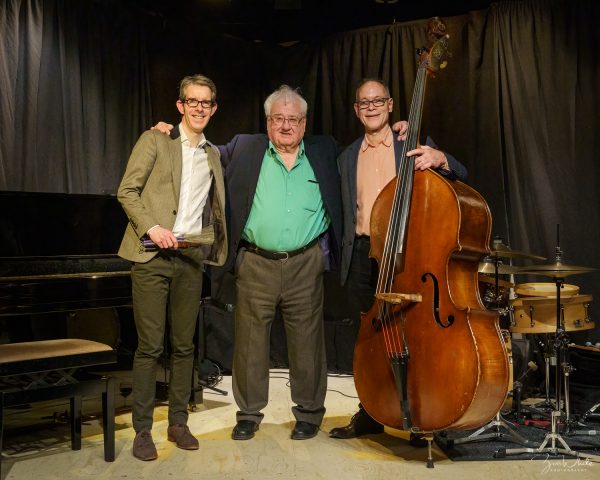
Progress Theatre, Reading, Friday 4 March 2022
John Horler piano, Alec Dankworth bass and Ronnie Jones drums
Listening to ‘Re: Person I Knew’, the opening number in John Horler’s ‘Tribute to Bill Evans’, one could be forgiven for thinking that the members of the trio had played together as a unit for years. Not so. They had played only one previous gig. One can only be thankful for the stroke of chance that brought them together and planted the seed of an idea to showcase John Horler’s world class talents as a pianist within a framework of a tribute to his key influence, Bill Evans.
The tribute focused on the early years of the Bill Evans’ trio in the early 1960s – the time of his celebrated ‘live’ recordings at the ‘Village Vanguard’ with bassist Scott La Faro and drummer Paul Motian – when jazz first woke up to his astonishingly fresh approach to the music. As British pianist, the late Michael Garrick commented at the time, ‘There was a wonderful moonlight sort of quality about his playing. It was as clear as daylight. Sparkling! He combined the qualities of disciplined accuracy, swing and impressionism in a way not heard in jazz before.’
Bill Evans made an indelible impression on John Horler when he saw him play ‘live’ in London for the first time. ‘Bill is still the most influential figure in my playing,’ John says. ’In an inspirational way.’ In contrast to the introspection and shyness of Bill Evans, Horler is an ebullient character whose warmth, good humour and sense of fun immediately communicates with his audience.
But don’t be fooled, John is ‘up for a challenge’. One could almost hear him saying, ‘Let’s see where we can go with this, guys!’ as he launched into a tantalising, seemingly chaotic, out-of-tempo introduction to ‘How Deep is the Ocean’, building the suspense until the full beauty of Irving Berlin’s romantic classic appeared with the seamless entrance of Alec Dankworth’s bass and the subtle brushwork of Ronnie Jones on drums. Warming to the occasion, the audience responded with generous applause and the first of many cheers.
Two Bill Evans’ fans had actually flown down from Scotland for the concert. Although they had listened to recordings for years, it was seeing the music being played – ‘in person’ – and the interaction between the musicians, a feature of the entire evening but particularly evident on ‘My Foolish Heart’, that thrilled them and enhanced the emotional experience of listening. Who could resist the subtle blend of John Horler’s own ‘moonlight touch’, Alec Dankworth’s gorgeous bass and the magical textures conjured by Ronnie Jones’ fingertips on his cymbals? It’s hard to believe that this tune in its original form as a film theme was dismissed as ‘sentimental bloop-bleep-bloop’.
The alchemist’s touch was also at work to transform the dreamy title track from Disney’s ‘Alice in Wonderland’ into another nugget of jazz gold. ‘Was John up to his aural tricks again with the introduction?’ I wondered. I’m sure that I detected more than a trace of ‘There’s a Song in My Heart’ before Alice hurried off on her adventures. Witty, charming and full of airy spaciousness, this was an absolute delight.
Alec Dankworth’s exquisite bass playing led the melodic line over the gentle breeze of a bossa-nova rhythm on ‘The Dolphin’. First recorded by Bill Evans on Fender Rhodes keyboard with an orchestral backing for the experimental album ‘From Left to Right’, this scaled down arrangement for the trio worked magnificently.
John Horler’s angular, staccato phrases set ‘My Romance’ in motion and brought the first set to a spectacular close with rapidly fired exchanges between the respective musicians.
The opening two numbers of the second set shone further light on the contrasting and sometimes conflicting elements of Bill Evans’ complex musical personality. The quirky appeal of ‘Very Early’ kept one second guessing as to the direction it was heading in, while the bitter/sweet emotions of Henry Mancini’s ‘Days of Wine and Roses’ demonstrated quite simply that Bill couldn’t resist a great melody.
Horler made just one deviation from his programme in order to pay tribute to Chick Corea who died just over a year ago. ‘Windows’ with its intoxicating mix of styles, changing time signatures and swirling rhythms held everyone in its grip. Superb!
An impeccable interpretation of ‘Blue in Green’, capturing its unique feeling of calm and stillness, served to remind us of Evans’ massive contribution to the classic Miles Davis album, ‘Kind of Blue’. Bill might not have received any writing credit for the tune; that was attributed to Miles, but his DNA runs right through it.
‘Waltz for Debby’ is an enduringly catchy tune and an early example of ¾ being used in jazz, dating from Evan’s ‘New Jazz Conceptions’ album of 1956. It’s a great tune, even if, as John Horler pointed out, ‘most of it is actually played in straight 4/4’. On this instance it provided a perfect outlet for the lyrical bass of Alec Dankworth.
Unlike Bill Evans, who rarely spoke and who played with such intensity that his bowed head sometimes seemed to rest on the keyboard, John Horler freely chats to the audience between numbers. However, he recalled one occasion at the Pizza Express, Dean Street when Bill did break his silence. He played ‘The Peacocks’ and paid tribute to its composer Jimmy Rowles who happened to be in the audience, sitting only a couple of tables away from John. Jimmy, a ‘monster’ of a piano player himself, was visibly touched by the compliment.
John’s own interpretation of this enigmatic number expressed its sadness and aching beauty in masterful fashion – an outstanding performance!
The dark drama and intense rhythmic power of ‘Nardis’, brought a concert of world-class stature to an explosive climax with its ‘seat of your’ pants excitement, topped by Dankworth’s singing bass and Jones’ hand drumming. WOW! As one punter later remarked on his way out of the auditorium, ‘I knew John Horler was a good pianist, but I didn’t realise he was that good!’
Segueing from Bill Evans’ Peace Piece’ to Leonard Bernstein’s nostalgic lament ‘Some Other Time’ John Horler brought the evening to a close with a deeply moving reflection on the tragic events unfolding in Ukraine. He expressed the ‘Sound of Freedom’ more powerfully that any number of words could possibly convey.
As ever, thanks are due to the Progress Theatre Front of House team for their warm hospitality and the excellent quality of the sound and lighting, to Hickies Music Store of Reading & Tiverton for the hire of the excellent Yamaha piano and to the audience for the generous donation of £105 for British Ukrainian Aid. Further donations can be made via https://british-ukrainianaid.org/make-a-donation/
Review posted here by kind permission of Trevor Bannister
Photo by Zoë White Photography
Vasilis Xenopoulos with His Dexterity Quintet – January 2022
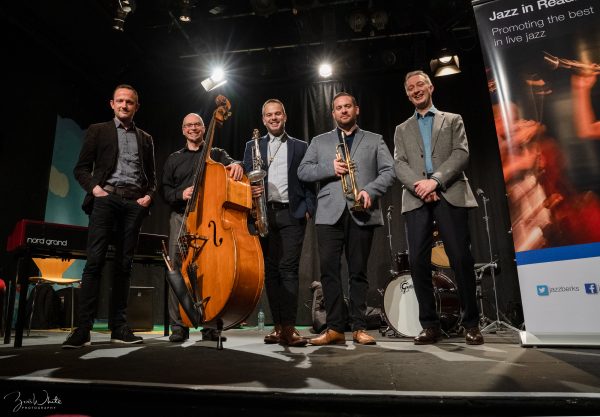
Progress Theatre, Reading, Friday 28 January 2022
Vasilis Xenopoulos tenor saxophone, Quentin Collins trumpet & flugelhorn, Ross Stanley piano, Simon Thorpe bass, Matt Fishwick drums
Dexter Gordon, who died in 1989 aged sixty-six, was a true colossus of 6’ 6”, whose stature as a tenor saxophonist and composer matched his massive frame; a sharp sense of outfitting, a smart choice of hats and an engaging personality completed his persona as the ‘cool hipster’ captured in so many atmospheric monochrome photographs throughout his five-decade-long career.
He began as a sideman in the big bands of Lionel Hampton, Louis Armstrong, Fletcher Henderson and Billy Eckstine, from which he emerged as an important and influential soloist in the Bebop revolution of the late-1940s. Sadly, this early promise was decimated by narcotics and Dexter spent most of the 1950s in various ‘places of correction’.
The 1960s saw his renaissance and a return to the recording studio for the Blue Note and Prestige labels. After a London date at Ronnie Scott’s in 1962 he made his home in Europe for the next fourteen years, which included a fruitful residency at the ‘Montmartre Jazzhus’ in Copenhagen, where he found a peace and respect denied to him in his native country. In his latter years Dexter earned an Oscar nomination for his leading acting role in Bertrand Tavernier’s 1986 movie Round Midnight.
Based on pianist Bud Powell’s expatriate life in Paris, it also closely mirrored Dexter’s own experiences of living in Europe. He returned to the US in 1976 and died in Philadelphia on 25th April 1990 leaving an indelible impression on those fortunate enough to hear him play in person and countless more who discovered his music from his vast legacy recordings.
Vasilis Xenopoulos was one such young musician who fell under Dexter’s spell, saving his hard-earned pocket money to buy the precious albums that would influence his playing and one day find an outlet in the Dexterity Quintet which lifted the roof of Reading’s Progress Theatre on Friday 28 January.
The tightly arranged exuberance of ‘Evergreenish’, from the 1970 Prestige album ‘The Jumpin’ Blues’, set the pace and the style for the evening; long, flowing solos of dazzling brilliance propelled by the straight-ahead, unfussy swing of the rhythm section. Neither Ross Stanley nor drummer Matt Fishwick give very much away by way of facial expressions, but the obvious enjoyment of playing in such a band, spurred on by the enthusiastic support of the audience was clear to see on Simon Thorpe’s smiling face.
Dexter acquired the sobriquet ‘Society Red’ as a seventeen-year-old member of the Lionel Hampton band and had he ever completed his autobiography it would have borne the title, ‘The Saga of Society Red’. Instead, it was immortalised on the 1961 Blue Note album ‘Doin’ Allright’.
It’s a brilliantly conceived number with a funky, bluesy feel and brief punchy unison statements punctuating the solos, which once again hit astonishing heights.
Vasilis’s introduction to ‘Montmartre’ prompted an hilarious cautionary tale of his once taking a ‘comfort break’ at a jazz club only to be assailed by a zealous jazz ‘anorak’. He insisted that Vasilis had incorrectly attributed the ‘Montmartre Jazzhus’, Copenhagen as the inspiration for Dexter’s tune rather than the more famous artists’ district of Paris, where Dexter had also lived for a while during his European sojourn. Vasilis’s riposte that he had visited the Jazzhus in person and that the walls covered with photographs of Dexter told a different story, fell on stony ground.
The number itself, first recorded at the ‘Jazzhus’ for the Steeplechase label in 1964, leapt into life as an up-tempo Latin swinger. Apart from the breathtaking solos from the Xenopoulos/Collins front-line, it featured the cascading piano of Ross Stanley and the dynamic drums of Matt Fishwick.
Jazz musicians have the knack of finding nuggets of gold from the most obscure of sources – in this case the Sammy Khan/Jule Styne collaboration ‘I Guess I’ll Hang my Tears Out to Dry’ which Dexter rescued from obscurity on his 1964 Blue Note album ‘Go’. With Quentin Collins switching to the mellow toned flugelhorn, Vasilis at his most sumptuous on tenor, and underpinned by Simon Thorpe’s singing bass, this proved to be an object lesson in the art of ballad playing. Vasilis’ a cappella coda was something to die for.
With the audience on the tips of their toes straining to catch the random quotes thrown out by Vasilis’ eloquent tenor, ‘It’s You or No One’, another Khan/Styne collaboration, closed the first half in a joyous manner with a full-throttle nod towards Dexter’s ‘Montmartre Jazzhus’ recording of 1964.
The second set opened with ‘Dexterology’, a showcase for Vasilis’s own considerable writing talents, followed by ‘Tivoli’, a delightful jazz-waltz that captured the unique atmosphere and brightly lit gaiety I fondly recall from an evening spent long-ago in the Copenhagen pleasure gardens. The number appears on the last album released under Dexter’s name, ‘The Other side of Midnight’.
The next number didn’t really need an introduction – the title says it all – ‘Hanky Panky’, a cheeky, shuffly blues-march from Dexter’s 1965 Blue Note ‘Clubhouse’ album. A wonderful feeling of tension-and-release between the respective solos, added an edge of nervy excitement to the fun.
Vasilis’ gorgeous interpretation of ‘If You Could See Me Now’, originally penned by Dexter’s near-contemporary, pianist/arranger/composer Tadd Dameron for vocalist Sarah Vaughan way back in 1946, stood out as perhaps the highlight of the evening. Supported by the deft touch of Ross Stanley’s accompaniment – what an accomplished musician he is, and the sensitive backing of Simon Thorpe and Matt Fishwick, Vasilis absolutely commanded the stage and held the audience spellbound. Only one word would suffice to describe the performance – ‘Majestic’.
The no-holds-barred flag-waver ‘Second Balcony Jump’, a Billy Eckstine composition dating back to Dexter’s earliest days, brought an exhilarating evening and a fitting tribute to a legend of the music to a spectacular close. A grand finale indeed – wailing tenor, soaring trumpet, rolling piano, and explosive drums, topped by a gladiatorial exchange of ‘fours’ to keep everyone on their toes to the very last note – and all held perfectly in place by the pulse of Simon Thorpe’s rich toned bass. And, I should add, achieved without the aid of any amplification! Brilliant!
Vasilis should, of course, have appeared at Progress with his Dexterity Quintet in the spring of 2021. There is no need to explain why that didn’t happen. All I can say, is that it was worth the wait and that we wish him continued success with the band and album: Dexterity: The music of Dexter Gordon
Promoters please note – this is a band not to be missed!
As ever, thanks to the House team for the excellence of hospitality, smooth running of the evening and superb sound and lighting. And last, though by no means least, thanks to the wonderful audience whose support ensures that jazz remains ‘live’ on the stage of the Progress Theatre.
Review posted here by kind permission of Trevor Bannister
Photo by Zoë White Photography
Moscow Drug Club – December 2021
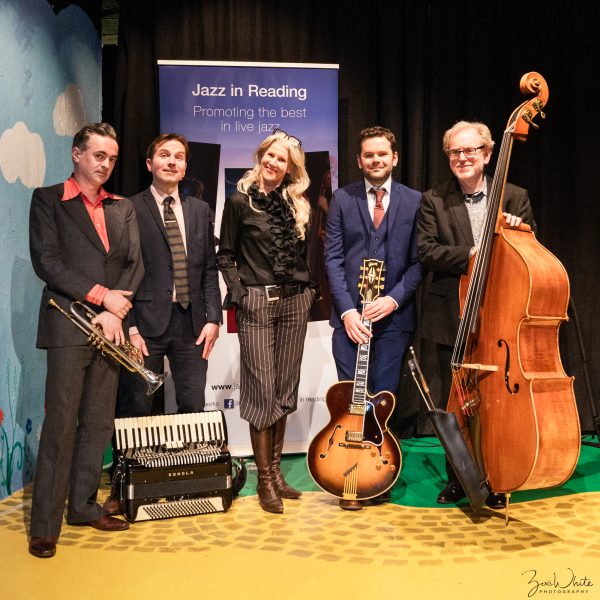
Progress Theatre, Reading, Friday 17 December 2021
Katya Gorrie vocals, Jonny Bruce trumpet, Mirek Salmon accordion, Andy Bowen guitar and Andy Crowdy bass
Judging by the reception given to Katya Gorrie and her four partners in song-and-tune, by the near full-house audience at Reading’s Progress Theatre on Friday 17 December, I am not alone in being a great fan of the Moscow Drug Club. No matter that the entire concept is a fantasy drawn from the deliciously decadent lyrics concocted by B.B. Gabor, an émigré Hungarian songwriter who settled in Canada. I like to indulge in the illusion that Katya really did meet up with her dissolute bunch of minstrels in rehab after suffering the effects of a night at ‘The Moscow Drug Club’ – a place where members ‘could have a smoke’, cock-a-snoop at authority, relax in the musical intimacy of its intoxicating atmosphere and ‘where the Reds played the blues’. Can you think of any better antidote to the ravages of COVID and endless disclosures of political sleaze?
Best of all, I love the honesty of the Moscow Drug Club. When they play for fun, they go for it full-heartedly, setting the pulse racing and the toes tapping; they deflate pomposity with a twinkle of the eye and when life is S…, they tell the story exactly as it is. And by doing so, they introduce us to a wonderful melange of songs, imbued with both the theatricality of Katya Gorrie that has been part of her life from earliest childhood in Canada and the brilliant musicianship of Messrs Bruce, Salmon, Bowen and Crowdy.
‘It Had Better Be Tonight (Meglio Stasera)’, a lively samba composed by Henry Mancini with lyrics by Johnny Mercer and a featured number in ‘The Pink Panther’ movie, set the evening off to an exuberant start. Aided and abetted by Jonny Bruce’s full use of his plunger mute and the ‘deep throated’ accordion of Mirek Salmon, the cynical lyrics of Eartha Kitt’s ‘Pink Schmink’, presented a very different picture of love. When the final verse posed the question, ‘What have you got if you haven’t got love?’ ‘I’ll take the Jaguar on the right!’ came the reply.
Like Eartha Kitt there was very much more to Norma Deloris Egstrom than ever revealed by her glamorous alter ego ‘Miss Peggy Lee’. She was a song writer of rare quality as ‘‘The Gypsy with the Fire in His Shoes’ firmly testified. It blazed with the excitement of the bull ring and the rhythms of flamenco. Olé!
Katya sent the mind boggling when she introduced the next piece, a co-composition with Mirek Salmon, as being a ‘Rudyard Kipling outing for adults’? True to her word, ‘Serpentine’ was indeed an atmospheric exploration of seductive sensuality, enhanced by the closely mic’d Miles Davis-ish trumpet solo by Jonny Bruce.
‘When I Get Low, I Get High’, a hit song for improbably named Marion Sunshine, turned the clock back to the sheer joy, flamboyance and razzmatazz of 1920’s vaudeville, with Katya accompanied by the tuneful voices of her male backing quartet.
Mirek Salmon’s melancholic accordion set the scene for Jacques Brel’s ‘The Port of Amsterdam’, a song that made an indelible impression on Katya’s imagination when she first came across it as a child amongst her parents’ eclectic collection of records. It developed in a kaleidoscopic sort of way to capture Brel’s vision of the sights, sounds and people of the port. Brilliant.
The final two numbers of the first set could not have presented a greater contrast. Swapping his double bass for a guitar, Andy Crowdy joined Andy Bowen in, what else but Charles Aznavour’s pulsating ‘Two Guitars’. Having it hit the heights of inspired invention, we immediately descended into the dark territory inhabited by ‘A Jockey Full of Bourbon’, Tom Waits’ elegy for a drunken taxi driver and the series of mishaps that behalf him. Katya expressed the bleak narrative brilliantly. Jonny Bunce’s concluding statement on the trumpet lifted the roof, but it couldn’t lift the feeling of waste and despair engendered by the song.
The second set opened with ‘Miserlou’, a traditional Turkish song, which found a surprising new lease of life as a ‘surfing’ hit for Dick Dale in the early 1960s, later featured on the soundtrack to ‘Pulp Fiction’. Thankfully, the MDC interpretation retained all the mysterious spirit and rich eastern Mediterranean flavours of the original.
The gentle ‘Just Squeeze Me (But Please Don’t Tease Me)’, provided the opportunity for a welcome reprise of the vocal charms of Katya and her boys, who then cut-loose with a full-bodied tribute to Louis Armstrong in the fateful tale of ‘Ole Man Mose’. As Jonny Bruce’s trumpet dazzling trumpet notes ascended to the heavens, we were reminded that even fifty years after his death, Louis’s influence is as strong as ever!
The brilliant solo guitar of Andy Bowen lightened the moody darkness of Tom Waits’ ‘Temptation’ before his compatriot in the rhythm department, Andy Crowdy, took centre stage. Not only did his bass hit a great groove to ‘bookend’ Jacques Brels’s classic ‘Jacky’, but he displayed his talents to their full glory in a technically impressive and wittily conceived solo. I picked out quotes from ‘We Three Kings’ and ‘Silent Night’ and feel sure that even more escaped my attention. Great fun!
The flute-like notes of Mirek Salmon’s accordion added a special dimension to Leonard Cohn’s ‘Dance Me to the End of Love’ and confirmed once again that in his hands it is a beautifully expressive instrument and a perfect accompaniment to Katya Gorrie’s voice.
All too soon, the moment arrived to call time on the Moscow Drug Club, but not before Katya and the band paid tribute to B.B. Gabor and the song which inspired its creation, ‘Moscow Drug Club’ – the curious and only place where ‘the Red’s play the Blues’ and where it’s possible to rub shoulders and share a drink with the varied company of Tom Waits, Louis Armstrong, Marion Sunshine, Leonard Cohen, Eartha Kitt, Duke Ellington, Jacques Brel and Miss Peggy Lee.
Our thanks to ‘sound wizard’ Rich and the Progress Front of House Team.
May I wish you all a safe and ‘swinging’ Christmas, as we look forward to the promise of some more great gigs at Progress in the New Year.
Review posted here by kind permission of Trevor Bannister
Photo by Zoë White Photography
Clark Tracey Sextet
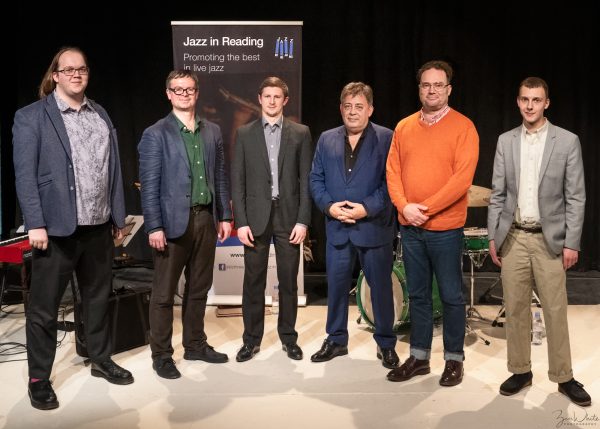
Progress Theatre, Reading, Friday 26 November 2021
Mark Armstrong trumpet, James Wade-Sired trombone, Tom Ridout alto & tenor saxophones, recorder, Gareth Williams keyboard & vocal, James Owston bass, Clark Tracey drums
A last-minute surge in ticket sales ensured a near full house for the penultimate gig in Clark Tracey’s much delayed ‘60th Birthday Tour’ at Reading’s Progress Theatre on Friday 26 November. While any risks to life and limb from the anticipated Storm Arwen were strictly in the lap-of-the gods, the team at Progress has worked tirelessly to make the theatre as safe as possible from the threat of COVID. What’s more, the spacious feel of the extended and freshly renovated bar area makes Progress an even more attractive, not to say comfortable, venue for world class jazz, without any loss in its welcoming atmosphere. And what better way to celebrate this new step in the theatre’s illustrious history than with the powerhouse sextet led by Clark Tracey.
A medium tempo groove set the evening swinging and the toes tapping with Joey Defrancesco’s arrangement of the Jerome Kern/Johnny Mercer 1942 romantic classic ‘Dearly Beloved’. The full sound of the ensemble, led by Mark Armstrong on trumpet, taking a brief leave of absence from his role as Director of the National Youth Jazz Orchestra (NYJO) contrasted beautifully with the mellow tones and surprising delights of Gareth Williams’ vocal.
As well as being one of the great drummers on the contemporary scene – the distinct ‘snap’ of his hi-hat cymbals coming together is alone something to behold – Clark Tracey’s writing is full of challenge and excitement, a perfect launching pad for solo exploration. ‘Remind Me in Three’ exploded as a torrent of sound, highlighting the precocious talents of multi-award saxophonist Tom Ridout on tenor and the amazing nineteen-year-old James Wade-Sired on trombone. ‘Ace Move’, by comparison evoked a sense of polished spontaneity, a Basie-like feel of latent energy, set in motion by a sublime piece of storytelling from the bass of James Owston – another remarkable young talent.
Sadly, ‘Caoineadh (Lament) for Cuchulainn’, a feature for Tom Ridout on recorder, was marred by a troublesome sound loop, on this otherwise hauntingly beautiful Tracey dedication to his Irish Great- Grandmother, Mary Monaghan.
Ridout switched to alto for the closing number of the first set, giving a biting edge to a full-throttle work out on Herbie Hancock’s composition ‘Darts’. The seasoned experience of Tracey, Williams and Armstrong showed its hand with perfectly placed accents from their respective instruments to keep up the momentum and push the music to new heights of invention. Fabulous!
Harry ‘Sweets’ Edison is better known as a star of the early Count Basie Orchestra and for the uniquely economic trumpet style that he fashioned later in his career, than for his composing skills. More’s the pity, for ‘Kitty’, from a 1962 collaboration with Ben Webster, was a striking demonstration of how a seemingly simple tune set to a relaxed swinging tempo can inspire great jazz. It was a true ‘box of delights’ with Mark Armstrong’s growling trumpet and the intuitive interplay within the rhythm section amongst its many high spots.
Tom Ridout’s ‘Vega’ captured the aura of the brightest star in the northern constellation of Lyra to perfect effect and confirmed that in the right hands, the humble recorder deserves its place as a jazz instrument. Gareth Williams’ exquisite piano solo added its magic to this excursion into deep space.
About twenty-five years ago Clark Tracey composed a number specifically for his trombonist of that time, the great Mark Nightingale. The result was ‘Mark Nightingale Sang’, a number which certainly expressed the spirit of its more famous counterpart even if it followed a different melodic pathway. On this occasion James Wade-Siren stepped into Mark’s footsteps and showing a confidence and maturity way beyond his nineteen years, held the audience captive with a spellbinding solo that makes one wonder what this young man will accomplish in the future: a star in the making!
The final two numbers of the evening took us right back to the roots of hard bop with the roaring ‘Blakey-esque’ ‘One by One’ from the pen of Wayne Shorter followed by Slide Hampton’s ‘New World’. The latter, a moving tribute to Slide, a trombonist and prolific writer and arranger who passed away at the age of eighty-nine on 18 November, featured the ‘man himself’, Clark Tracey, in a mesmerising drum solo – technically brilliant, dynamic, melodic, rhythmically super-charged, emotional – a tour de force that brought the gig to a close.
I understand that Clark proposes to disband this group once its touring programme is complete towards the end of this year and has a number of new projects up his sleeve to explore in the future. Though we shall regret its passing, we can only be thankful that it didn’t fall victim to Lockdown and for the opportunity to see it at a peak of its powers; an inter-generational band to remind us of what jazz is about and holding the promise of great things to come.
Our thanks also to the Front of House Team at Progress for their warm welcome, hospitality and attention to detail.
Review posted here by kind permission of Trevor Bannister
Photo by Zoë White Photography
Photo by Zoë White Photography
Andrew McCormack’s Graviton
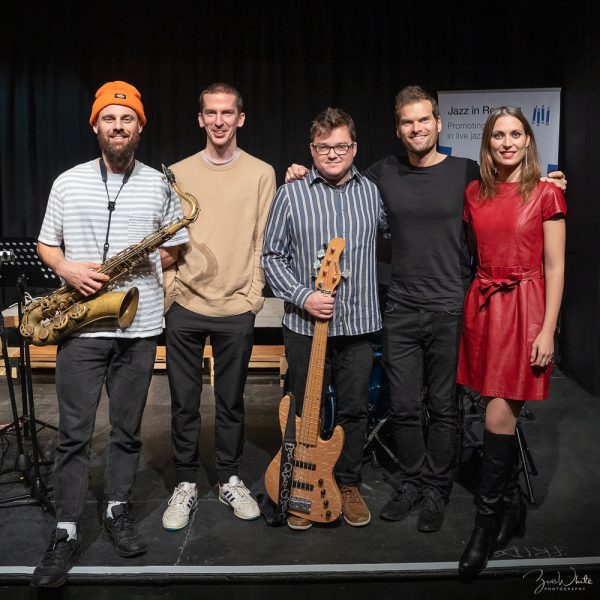
Progress Theatre, Reading, Friday 22 October 2021
Andrew McCormack keyboard, Noemi Nuti vocals, Josh Arcoleo tenor saxophone, Conor Chaplin electric bass and Joshua Blackmore drums
Sometimes you hear a sound of such originality, energy and stunning beauty that it quite simply ‘Knocks you out.’ The opening night of the new Jazz at Progress season on Friday 22 October bore witness to such an occasion. The musicians who comprise Graviton, a five-piece band, led by Andrew McCormack, held a near capacity audience spellbound for a magical two-hour performance of ‘The Calling.’
Fusing influences from a variety of musical genres, McCormack writes on a grand scale to fulfil his epic vision of eight pieces tracing the journey of the archetypal ‘hero’ in the pursuit and eventual destruction of the ‘dragon.’ It hardly seemed credible that music of such depth of sound and richly textured complexity could emanate from a mere five players; five musicians I should add, who were playing together for the first time in almost two years.
But nothing could have prepared my senses for the beauty and exhilarating effect of Noemi Nuti’s crystal-clear vocal tones. She takes the art of using the voice, both as an improvising instrument within the ensemble, and as a soloist, to new levels of possibility. Amazing!
‘Breathe’, ‘The Calling’ and ‘The Walled Garden’ simply swept me along in a fervent tide of sound and rhythm. I scarcely noticed the interludes between each piece. In no time, we arrived in the company of the ‘The Magic Mentor’. As McCormack explained, ‘Everyone needs a guiding light of inspiration in their life.’ In his case, it was and remains, the towering influence of the great saxophonist Jean Toussaint, to whom this beautifully reflective piece was dedicated.
In complete contrast, ‘The King is Blind’ expressed a protest against the dark forces of tyranny that can only be likened to a primeval scream, such was its intensity. Driven forward by the power of Joshua Blackmore’s drumming and McCormack’s jagged phrasing at the keyboard, Josh Arcoleo delved into the depths of his soul to summon an astonishing solo of impassioned rage to bring the first set to a dramatic close.
Andrew McCormack took to the stage alone for the opening of the second set. Switching his keyboard to piano mode, he embarked on a lengthy exploration of his own composition, ‘Dreamcatcher’. Not only is he delight to listen to, but also a delight to watch – you can see ideas taking shape in his face, followed by a look of determined concentration as he sets out to express them in layer upon layer of brilliant free-flowing improvisation.
Josh Arcoleo, Conor Chaplin and Joshua Blackmore joined him for ‘Windows’ a heartfelt tribute to its composer, Chick Corea, the ‘giant of music’ who died earlier this year at the age of seventy-nine. The waltz-time arrangement remained faithful to Chick’s 1967 recording with the Stan Getz Quartet with the same sense of warmth and subtle rapport between the respective musicians that Is such a feature of the original.
The brilliantly conceived ‘Belly of the Whale’ released a wave of powerful emotions which reverberated throughout the Progress auditorium. It served as both a cry of anguish and despair and as a metaphor for those entombed within circumstances seemingly beyond hope.
The light of hope, however, can never be completely extinguished and emerged in the pure sound of ‘Andromeda’. The simple device of an electronic loop sustained a combination of Noemi Nuti’s voice and the single notes of a glockenspiel to compelling effect.
The ‘Dragon’, the grand climax to the epic saga of ‘The Calling’ finally brought us face-to-face with the source of all evil as personified in Joshua Blackmore’s drums. The accuracy and driving energy of his playing had been evident throughout the evening. Now he unleashed the full scale of his imagination and ferocious power in a solo of nail-biting excitement. For all that, the dragon’s destiny lay in defeat. ‘The Calling’ had turned full-circle and our ‘hero’s’ journey was complete.
The original scheduling of ‘The Calling’ at Progress fell victim to COVID-19 and the Lockdown. It’s enduring theme – the ‘hero’s journey’ and the strength of the human spirit, has assumed new depths of meaning in the intervening eighteen-months – it doesn’t take too much thought to picture the numerous ‘dragons’ which have emerged in recent time, or the ‘heroes’ who have sought to rescue us from such dark forces. For that reason, it made a fitting choice to open a new season of jazz at the Progress Theatre. But more importantly, it celebrated the return of ‘live’ music – great music. Welcome back, we’ve missed you!!!!!
Our thanks to the team at the Progress Theatre who ensured that neither the COVID safety restrictions nor unfinished renovations on the building got in the way of a thoroughly enjoyable evening. Our thanks also to a wonderful audience. Jazz at Progress is back on the road!
‘The Calling’ is available as an album on the Ubuntu label (UBU0025) and Andrew is hoping to tour with Graviton next year.
Review posted here by kind permission of Trevor Bannister
Photo by Zoë White Photography
His ‘n’ Hers: Dave & Judith O’Higgins
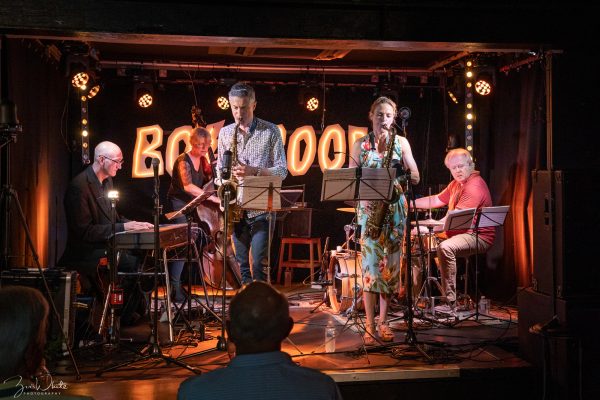
Livestream Jazz from the ‘Boileroom’, Guildford. Wednesday 15 June 2021
In collaboration with Guildford Jazz
Dave & Judith O’Higgins tenor saxophones, Graham Harvey keyboard, Marianne Windham bass and Sebastiaan de Krom drums
Yes folks, it’s true, your ears didn’t deceive you – that was the sound of genuine applause that you heard reverberating throughout the ‘Boileroom’, Guildford on the evening of Wednesday 15th June; the wildly clapping hands of ‘a perfectly formed bijou audience’, as Dave O’Higgins liked to describe it, enraptured by their first taste of ‘live’ jazz for the first time in ‘how many months’. What a lift it gave to the performers – the missing ingredient from the otherwise hugely successful season of ‘Boileroom’ ‘Livestreams’ that began way back in January; real people to nourish the mystical creative process we know as jazz. Wonderful!
And what better choice of band for the occasion than ‘His n’ Hers’, the husband and wife team of tenor saxophonists Dave and Judith O’Higgins and their three ‘buddies’, Graham Harvey, Marianne Windham and Sebastiaan de Krom. This is a group in the true sense of the word, with everyone up for the challenge presented by a perfectly balanced set of jazz standards and O’Higgins’ originals (Dave admits to coming up with the initial ideas, but credits Judith with shaping the melodic form), all of which are to be found on the ‘His n’ Hers’ album recorded in the midst of Lockdown #1 last year, available in digital, CD and vinyl formats via https://ohig.bandcamp.com/album/his-n-hers
I’m not sure of exactly what sort of ‘Hanky Panky’ Dexter Gordon had in mind when he penned this jazz march, but it made a playful opener to the gig with Judith’s muscular tenor well to the fore. She is a remarkably talented lady who combines her music with a career as a forensic pathologist, not to mention her accomplishments as a graphic artist – her design, with its nod towards the classic ‘Avengers’ TV series of the 1960s, graces “His ‘n’ Hers”, an album which she also helped to engineer.
Who can forget the panic buying of early 2020 when hapless shoppers across the country searched in vain for rolls of precious toilet tissue? Dave and Judith chose to commemorate this desperate phenomena with ‘Los Bandidos Bogarolles’, which despite its ‘Earthy’ subject matter proved to be a delightful Latin flavoured number, based on the chord sequence of ‘On Green Dolphin Street’.
‘Save Your Love for Me’ was famously recorded by vocalist Nancy Wilson with Cannonball Adderley in 1962. This interpretation swung effortlessly and featured the contrasting sounds of the tenor protagonists in both solo and ensemble mode, along with the lyrical invention of Graham Harvey at the keyboard – what a marvellous player he is!
As Dave explained, Dexter Gordon, who played with Louis Armstrong in his early career, straddled the eras of jazz from ‘swing’, through bebop, hardbop and beyond, and even embraced some of the innovations of John Coltrane. He was a true survivor who overcame difficulties in his homeland with a long sojourn in Europe and ultimately starred in the classic movie ‘Round Midnight’ – a story closely aligned to his own life and experience, though actually based upon pianist Bud Powell’s life as an émigré in Paris.
Dave paid tribute to Dexter’s majestic style, once described as ‘excruciatingly enjoyable’, with ‘Soy Califa’, familiar to ‘Boileroom’ regulars as one of the tunes that accompanies the opening credits to the livestream gigs. Sebastiaan de Krom and Marianne Windham kept the ‘pots boiling’ in the rhythm department and whipped up a carnival spirit for a wailing front line, dominated by the tremendous tension building presence of Dave O’Higgins and the momentum he generates with the big sound of his instrument.
‘Fourth Dimension’, another original from the creative team of O’Higgins, took a step further out with a passionate evocation of the territory inhabited by John Coltrane.
Fran Landesman’s ballad, ‘Spring Can Really Hang You Up the Most’ is a favourite amongst jazz musicians, but can its sardonic, bittersweet emotions ever have carried such a powerful message than now, in our times of COVID-19 inflicted frustration. Judith O’ Higgins captured the mood and sentiments perfectly in her solo.
Following the darkly mysterious ‘Theme for Doris’ by Tina Brooks, a once promising Blue Note recording artist who sadly fell into obscurity, the band returned to further reflect on ‘Lockdown’. Thankfully jazz musicians are blessed with wit and good humour. They never lack perceptive imagination when it comes to tune titles or the ability to present sparkling ‘new wine in old bottles’. Hence, ‘I’ll Remember April’ gave birth to ‘We’ll Forget March’. Not the gloomy statement we might have expected but a joyful Latin excursion with a marvellous solo by Marianne Windham.
Inspired by the magic of West Indian cricket in its earlier days and fuelled by Sebastiaan’s powerful drumming, ‘Calypso Collapso’ brought the evening to an exuberant close; a timely reminder that fortunes may have changed in the course of time but England have never lost their ability to fall apart at the crucial moment in a Test Series ie against New Zealand at Edgbaston as recently as 10th June!
And so, with an image of England’s wickets flying through the air, possibly final gig in a magnificent season of Livestreams from the ‘Boileroom’ and a brilliant reaffirmation of ‘Live’ jazz drew to a close. No words can adequately express our thanks to Marianne Windham for her imagination, dedication and energy in making the project possible. She has kept jazz ‘alive’ for musicians and audiences alike throughout times of unprecedented challenge with a world-class innovation that will surely retain a complementary role to live performance in the future.
Thanks also to the Boileroom technical team of Dom and Beth and to Steve of Ultimate Stream for the outstanding quality of production, sound and lighting. And finally, thanks to the numerous jazz societies whose combined efforts helped to promote the events and create an online audience approaching 2,000 over the course of seven events.
Let’s raise a glass to all those involved and drink a toast to the resumption of ‘Normal Service’ in the very near future.
Here’s a final word from Zoë White, Jazz in Reading’s consummate house photographer: “I felt very lucky to attend the gig. It was great to be back behind the lens and to soak up the jazz vibe and bonhomie in person. Hugely enjoyable. I loved the atmosphere and the good-natured connection between Dave, the band and our ‘perfectly formed ‘bijou’ audience’.”
Review posted here by kind permission of Trevor Bannister
Photo by Zoë White Photography
XPQ: Vasilis Xenopoulos & Nigel Quartet
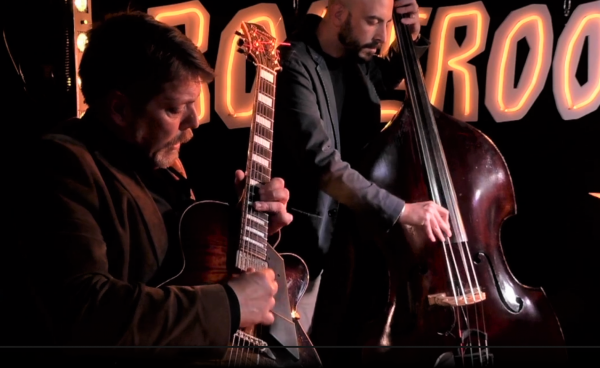
Photo by the kind permission of Guildford Jazz and the Boileroom team
Livestream Jazz from the Boileroom, Guildford, Wednesday 5 May 2021
In collaboration with Guildford Jazz
Vasilis Xenopoulos tenor saxophone, Nigel Price guitar,
Dario Di Lecce bass, Winston Clifford drums
As I have said on several previous occasions, the Livestream gigs from the Boileroom, Guildford, each of outstanding quality, have truly been the next best thing to a live event. However, on this occasion one camera shot, incorporating both the stage and the auditorium, added a new dimension to the experience.
It brought home how tiny and how empty the Boileroom is. But for a single camera mounted on the floor there is nothing in front of the stage except space. Just imagine how difficult it must be for the musicians to play as if to a live audience without anyone actually being there. Do they conjure an image of a full house in their mind’s eye, I wonder or is it more a case of ‘Here we are guys? Let’s go for it!’
I suspect it’s the latter, for the opening bars of Kenny Burrell’s ‘Lyresto’, from a 1958 collaboration with John Coltrane, simply oozed with good spirit and the promise that fireworks would fly in a celebration of many great guitar/tenor partnerships from the past sixty years. The sharper edge of the Xenopoulos tenor blended perfectly in unison with the depth and glowing tone of the Price guitar and made for an exciting contrast throughout the solos.
It came as no surprise to learn that Dario Di Lecce named bass legend Paul Chambers as a major influence on his playing when he was interviewed during the Q & A session later in the evening. His walking bass line on ‘The Right Time’ was absolutely superb, as rich in tone as the hue of his beautiful instrument. It added an air of mystery to the original by British guitarist Dave Cliff recorded as the title track for an album with saxophonist Geoff Simkins in 1987.
The next offering was drawn from ‘What’s New’ the second of two albums Sonny Rollins recorded with Jim Hall in 1962. They reaffirmed Sonny’s status as a major innovator on his return to the New York scene after a self-imposed break of three years. Sonny had the intuition to find the ‘jazz spirit’ in the most unlikely show tunes and ‘If Ever I should Leave You’ from the Lerner and Loewe musical ‘Camelot’, a popular hit and signature tune for the singer Robert Goulet, was a perfect case in point. The XPQ interpretation was full of the majestic poise of Sonny Rollins and grace of Jim Hall, full of long inventive lines and with a dancing quality enhanced by the drums of Winston Clifford.
‘Full House’ unleashed the Boileroom theme (played, I now realise, over the screen credits that precede the livestreams) with a machine gun ferocity that brought ‘all hands-on deck’. The early 1960s were clearly fruitful years for guitar/tenor features – this Wes Montgomery title comes from a live album recorded with the ‘Little Giant’ of the tenor, Johnny Griffin for the Riverside label.
‘When Joanna Loved Me’, from the 1964 ‘Easy Living’ album, as one would perhaps expect from a collaboration between Jim Hall and Paul Desmond, was an altogether more gentle and lyrical offering. Vasilis sustained the mood of gentle reflection set up by Price in his beautiful introduction, opening the way for a wonderful extended solo by Dario Di Lecce. Vasilis lifted the pace a little with a breathy solo that returned the tune to Nigel Price for a breath-taking coda.
Winston Clifford, a most sensitive and subtle percussion specialist, now set the ‘pots boiling’ and lifted everyone’s game on ‘Ready and Able’ from the appropriately named 1967 George Benson album, ‘The George Benson Cookbook’; performed,’ as Nigel Price pointed out, ‘Without the aid of a safety net! Wow!
‘On the Trail’, a movement from composer Ferde Grofé’s Grand Canyon Suite and the title track from a Jimmy Heath Riverside album with Kenny Burrell, rounded off the evening at a gentle saunter, conjuring visions of the wide-open American West – another tune from an unlikely source that works perfectly in a jazz setting.
In the absence of a live audience to cry out for more, Marianne Windham, stepped in to call for an encore. In time honoured tradition, the band checked their watches and ‘reluctantly’ agreed. The result? Imagine the theme statements to ‘Straight No Chaser’ and ‘Billie’s Bounce’ played in succession at Formula 1 speed, followed by a third, hybrid – combining the themes of the first two – a sort of ‘bebop mix-and-match’. Chaotic, great fun, a dazzling conclusion to an outstanding evening of jazz and a prelude to what Winston Clifford declares is the ‘bright future’ for jazz and all live performance artists once we emerge fully from Lockdown. Hear! Hear!
As ever, our thanks to Marianne Windham of Guildford Jazz, Dom and Beth of the Boileroom and Steve from Ultimate Stream, for what is now a world-class presentation and to the various jazz societies and their friends who support this wonderful initiative.
A final note: check out the Parliamentary Awards for 2021 before the closing date of 14 May and cast your vote here for the Boileroom for the Jazz Innovation Award.
Review posted here by kind permission of Trevor Bannister
The Clark Tracey Quartet Celebrate the Compositions of Stan Tracey 1952 – 2013
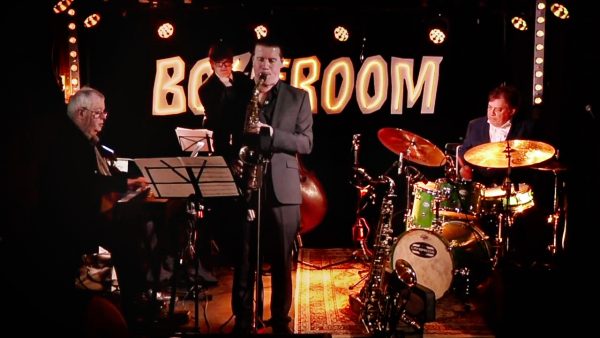
Livestream Jazz from the Boileroom, Guildford, Wednesday 14 April 2021
In collaboration with Guildford Jazz
Simon Allen soprano, alto & tenor saxophones, Bruce Boardman keyboard, Andy Cleyndert bass, Clark Tracey drums
Clark Tracey took on a monumental challenge when he began the task of selecting a set list to celebrate the compositions of his late father, the much-lamented Stan Tracey, for the hour-long Boileroom livestream. For somebody who, by all accounts, was a reticent writer and found the process almost unbearably hard, Stan composed a vast library of consistently brilliant work throughout a professional career of more than six decades. It stands as an enduring legacy of his inventive genius. But what to choose and what to leave out, and how to represent Stan’s bands and the great players who have figured in the various line-ups? And the greatest question of all: who should take on the role of Stan as pianist?
In response, Clark took the sensible course of choosing pieces which are well loved by Stan’s countless fans and have an emotional link to his life; each reflected a decade in his career. As for who should assume the role of pianist, there could have been no better choice than Bruce Boardman. His beautifully placed voicings and percussive, pared-down approach to the music bore a remarkable affinity to that of Stan and proved a revelation. Shame on me for never having come across his talents before.
Loyalty to his fellow musicians was one of Stan’s greatest personal qualities, matched in equal measure by their loyalty to them. Clark joined his father, aged 17, in 1988; Andy Cleyndert became part of Stan’s New Quartet in 1995, while Simon Allen began his association in 2008. They remained at the core of Stan’s bands until his death. In the ‘Q & A’ session after the gig, Clark recalled that Stan rarely commented on a players’ performance. The only sure way to know whether he approved of someone’s playing, was to see whether they were hired again for the next date.
Simon Allen’s searing alto opened the gig with ‘Euphony’, Stan’s first recorded composition dating back to a session for the Melodisc label in March 1952 with Victor Feldman’s All Stars. Its boppish feel has stood the test of time and reminds us that at that formative time Stan was very much a disciple of Bud Powell.
You could almost describe ‘Afro Charlie Meets the White Rabbit’ as one of Stan’s ‘Greatest Hits’, as he recorded it so many times and it lent itself to many different interpretations, from quartet, originally with the wonderful Bobby Wellins in 1964, to big band. A spikey, quizzical piece, light years away from ‘Euphony’, it affirmed Stan’s stature as his ‘own man’. Simon Allen and Bruce Boardman set the scene for a rumbustious escapade, with surprises leaping out at every twist and turn, the toe tapping rhythm held in place by the firm bass and drums of Messrs Cleyndert and Clarke. As you would expect with this allusion to Lewis Carroll and Alice’s various adventures, something magical was going on here!
By way of a contrast to the tight structure of ‘Afro Charlie’, ‘Rainbow at the Five Mile Road’ – an evocation of the longest stretch of open road on the island of Jersey – allowed the group to take flight and really swing. It’s a track from the 1969 quartet album with Peter King, ‘Free an’ One’ which has just been reissued on reSteamed Records RSJ114 as a double CD package titled ‘Wisdom in the Wings’, along with ‘Seven Ages of Man’ by Stan’s big band. Two classic albums to check out.
Simon Allen switched to soprano for ‘Honey Hill’, a wistful impression of a location in the Kent countryside. One can easily understand why it was so heavily requested by Stan’s fans. An absolute delight. It also holds special significance for Clark, as the recording in June 1980 marked the first occasion that Stan allowed him to play in a studio.
‘Benology’ hit an insistent groove to celebrate another family event, the arrival of Stan’s first grandchild, Ben, in 1990, with Bruce Boardman adding a touch of drama to Simon Allen’s passionate soprano.
One of the great benefits of livestreaming is being able to see musicians at work in close up; a series of virtual masterclasses as the cameras switched from instrument to instrument, holding the image long enough in each case to marvel at the touch and dexterity of the individual players. And what a fantastic overhead view we enjoyed of Clark’s drum introduction to ‘Pajaraz Exoticas’ – an object lesson in percussive invention that set the pace for ever more colourful excitement to come – a dedication to Stan’s visit to South America.
It seems to me that a truly great jazz musician can use his or her creative talent to express every subtle nuance of the emotional spectrum. Stan Tracey was a member of but a handful of musicians who could achieve such heights through both his playing and his writing. His music is timeless and the pieces which closed the evening not only bore that hallmark of greatness, but seemed especially pertinent to the unusual times we find ourselves in.
‘Pudding and Mince’, with its echoes of ‘Under Milk Wood’, was filled simply with the warmth and love of human nature at its very best. Bruce Boardman’s achingly beautiful unaccompanied keyboard on ‘Ballad of Loos’, a dedication to Stan’s father who was taken prisoner during the Battle of Loos on the Western Front in October 1915, taken from his final recording, brought the gig to a fitting and poignant close.
As ever, our thanks to Marianne Windham, the driving force at the hub of the Livestreams from the Boileroom, Guildford and to Beth, Dom and Steve for the outstanding quality of the technical production.
Review posted here by kind permission of Trevor Bannister
Derek Nash Quartet
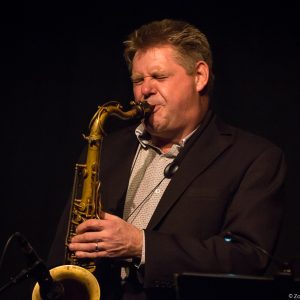
Livestream Jazz from the Boileroom, Guildford, Wednesday 10 March 2021
In collaboration with Guildford Jazz
Derek Nash saxophones, Graham Harvey keyboard, Marianne Windham bass, George Double drums
Watch out! By his own high standards, Derek Nash may not be totally ‘match fit’ after twelve months of Covid-enforced lay out, but back in the company of ‘real’ musicians, he’s an explosive force to be reckoned with; the perfect guest to ignite the ‘Boileroom’ for its latest livestream in celebration of ten years of Guildford Jazz.
He hit the deck running with ‘Water Jug’, a Frank Wess dedication to another hard-swinging tenor man, Gene ‘Jug’ Ammons. The full tone of Nash’s tenor set up a beautiful contrast with the elegant touch of Graham Harvey on the keyboard, all propelled by George Double’s animated drumming and Marianne Windham’s rock-steady bass.
Putting aside his muscular tenor saxophone for the lyrical tones of his near one-hundred-year-old Buescher curved soprano saxophone, Nash illuminated the darkest recesses of the Boileroom with the joyful ‘Blue House Samba’. Inspired by the Mexican artist, Frida Kahlo, it was the first of four pieces from ‘Down on Frenchman Street’, Derek’s latest album, dedicated to the area which has now become the centre of jazz in the birthplace of the music, New Orleans.
The Merriam-Webster dictionary describes a ladies’ man ‘as a man who shows a marked fondness for the company of women or is especially attentive to women’. Who else could that be but Duke Ellington? His most favoured and successful ‘chat-up line, ‘My, But You Make That Dress Look Lovely’ (another track from the new album), inspired a sumptuous outing for the Nash baritone saxophone, in which the blues-tinged piano of Graham Harvey and the walking bass of Marianne Windham were two further highlights.
Pianist and composer Thelonious Monk was a man of few words and more often than not, no words at all, preferring to communicate more directly through his music. I guess that the classic Monkism, ‘You Got to Dig It To Dig It, You Dig’, stands on a par to the question once levelled at Fats Waller; ‘Mr Waller what is swing?’ To which he replied, ‘Lady, if you gotta ask, you ain’t got it!’ As if to make the point, Derek Nash now on wailing alto, hit a funky groove and swung like the clappers on ‘You Got to Dig It To Dig It, You Dig’, title track for another recent album.
Neal Hefti famously contributed ‘Li’l Darlin’’ and ‘Cute’ to the Count Basie pad, one an object lesson in how to swing at the slowest pace imaginable, and the other a medium paced outing to feature the wire-brush work of the band’s drummers. In this case, Derek Nash, reverting to tenor, upped the tempo and ingeniously intertwined the two tunes with a deft opening salvo by driving drummer George Double on brushes.
Readers of a certain age may well remember the BBC Northern Dance Orchestra (NDO) which broadcast regularly from Manchester for many years. Derek Nash’s father, Pat, was an arranger for the band for 35 years, hence Derek was immersed in music and the world of musicians from his earliest years, counting legendary sidemen like Syd Lawrence and Gary Cox as part of his extended family. The delightful, spring-like, ‘Waltz for My Father’, with a gorgeous bass solo from Marianne Windham, paid a fitting tribute to Pat Nash.
The notoriously snobbish Broadway and Hollywood composer, Jerome Kern, regarded all jazz interpretations of his melodies as ‘fraudulent imitations’. Was he squirming in his grave I wonder as Messrs. Nash and Harvey took their lead from the 1962 collaboration between jazz giants Gerry Mulligan and Paul Desmond, to perform an absolutely sublime arrangement of ‘All the Things You Are’? He would surely have been impressed by the near telepathic understanding between the two protagonists and their breathtaking interplay, not to mention the sensitive support of Marianne Windham on bass and George Double on drums. As the saying goes, ‘This number alone was worth the cost of the entrance ticket!’
Two more titles from ‘Down on Frenchman Street’ rounded off the evening; ‘October’, gorgeous ballad with Nash on tenor, and a spirited finale, ‘Gmail Special’ which expressed all the ‘vim-and-vigour’ of Benny Goodman’s classic 1941 Sextet recording ‘Air Mail Special’ but managed to deliver its message in a fraction of the time. A great ending to a great evening!
No Livestream from the Boileroom would be complete without the Question & Answer Session, with Marianne Windham leading the discussion from questions submitted during the course of the evening by members of the online audience. As ever, the topics ranged far and wide, drawing a number of fascinating insights from each of the musicians and several memorable anecdotes. Notable amongst these was George Double’s recollection of American vocal legend Jack Jones mispronouncing his name to the audience at the end of a concert so that it rhymed with Bublé and then thanked him for playing ‘concussion’.
The session also provided the opportunity for Derek Nash to introduce each member of his saxophone family – a 1926 Buescher soprano, a Selmer Mark VI alto, a Selmer Super balanced action tenor (the same model played by John Coltrane) and a Conn Crossbar baritone (the same model played by Gerry Mulligan).
I have remarked in earlier reviews that Livestreams from the Boileroom are the next best thing to a live gig. This evening’s concert took a step closer to complete authenticity with the appearance of a selection of Derek’s CDs discreetly tucked away under a sidelight behind George Double’s drums.
The full range of Derek’s albums are available here
Our thanks to Marianne Windham, the driving force behind the Boileroom project, which now numbers eight organisations in its association, Fleet Jazz, Frinton Jazz, Scarborough Jazz and Southwold Jazz, having joined the founding members of Guildford Jazz, Berkshamsted Jazz, Chichester Jazz and Jazz in Reading, and which on this occasion attracted an online audience of 329!
Our thanks also to the Boileroom team of Beth and Dom, and Steve Helliker of Ultimate Stream, for the outstanding technical quality of the livestreams and the overall presentation which advances with every performance.
And finally, please raise a glass to Guildford Jazz on reaching its tenth Anniversary. Many congratulations!
Review posted here by kind permission of Trevor Bannister
Freddie Gavita Quartet

Livestream Jazz from the Boileroom, Guildford, Wednesday 10 February 2021
In collaboration with Guildford Jazz
Freddie Gavita trumpet/flugelhorn, Tom Cawley keyboard, Tom Farmer bass, Chris Higginbottom drums
Leaving aside the excellent quality of the music and the gold standards of presentation, sound and lighting, the informal post-gig ‘Q & A’ sessions have proved to be one of the key, and certainly most enjoyable elements of the recent Livestream concerts from the Boileroom, Guildford. There has been no lack of questions, each submitted online during the gig, and the musicians have responded warmly to Marianne Windham’s infectious enthusiasm in her role as interviewer.
In the case of the Freddie Gavita Quartet, it was fascinating to learn that three of the players began their musical careers at an early age with the piano; Tom Cawley stuck with the instrument, while Freddie later switched to trumpet and Tom Farmer to bass (though not until he was eighteen and one night was forced to dep for an absent bass player). Chris Higginbottom’s career began in a church choir, before he became firmly hooked on the sound of drums. When the musicians named their principal influences, you couldn’t help but imagine what a band comprised of Miles Davis on trumpet, Phineas Newborn Jnr piano, Larry Grenadier bass and Roy Haynes on drums, might sound like. Roy Haynes, I’m delighted to say, is still with us at the remarkable age of 95, as is Larry, at a very active 55. Great fun!
The most searching question came from a gentleman who enquired about what advice could the members of the quartet offer to an aspiring jazz musician. ‘Listen to players better than yourself,’ came Freddie’s instant reply, to the unanimous agreement of his colleagues. ‘Listen,’ echoed Chris Higginbottom, adding ‘try to transcribe what people are doing.’ ‘Join a band,’ offered Tom Farmer, ‘and if you can’t find one, form one!’
Freddie Gavita summed it up by saying, ‘It’s about finding a way to express the individual voice you can hear in your head.’
The spellbinding quality of Freddie’s individual voice was immediately obvious in the opening bars of his own composition ‘Yearning’; understated, flawlessly executed, beautifully articulated and warm in tone. He allows the music space to breathe and to grow in its own way. Tom Cawley added inventive momentum and demonstrated why he is such a highly regarded and much sought-after pianist. The singing bass of Tom Farmer and a subtle change of pace and time opened the horizon for further exploration and better trained ears than mine would have noticed that the band had segued seamlessly into Wayne Shorter’s ‘Yes and No’ from his classic Blue Note album, ‘JuJu’.
Herbie Hancock originally conceived ‘One Finger Snap’ as a dance of such complexity that it could only be performed in the ‘glittering fantasies’ of the inhabitants of the mythical ‘Empyrean Isle’. Freddie’s interpretation captured that vision in perfect detail and climaxed with a solo from Chris Higginbottom on drums, no mere technical workout, but a dazzling kaleidoscope of sound.
Freddie switched to the mellow tones of his flugelhorn for the gently paced ‘Big Guy’, a dedication to the late and much-lamented Michael Brecker, featuring the good humoured piano of Tom Cawley and the delightful walking bass of Tom Farmer.
Remaining in reflective mood, Freddie followed up with the exquisite ‘Infant Eyes’. Livestreaming may have its limitations, but it could not constrain the tender emotions and sense of stillness expressed in this most beautiful of Wayne Shorter compositions.
As Freddie explained, ‘Sprezzatura’ is a word that sounds authentically Italian but is actually something he made up as a suitable title for a straight-ahead blast of bebop, which in turn would segue into the white heat of McCoy Tyner’s ‘Passion Dance’. The solos from each of the band members simply took the breath away, prompting a cheer and round of applause of such force from the ‘live’ audience of three – Marianne Windham and the Boileroom technical team of Dom and Beth, that it no doubt resonated throughout the 231 households of those viewing the gig across the UK and as far afield as Germany and Switzerland!
The gig came to a close with a heartfelt dedication to saxophonist Steve Main, who had passed away only that morning and the late Richard Turner. ‘They were happy guys,’ Freddie said, ‘so this is a happy tune.’ Full of warmth, good humour and audacious spirit, ‘Turneround’ was a fitting tribute to two much-missed friends and a perfect end to an enthralling evening of jazz.
Our thanks to the guys in the band and to Marianne Windham, Beth and Dom of the Boileroom and the combined support of Guildford Jazz, Berkhamsted Jazz, Chichester Jazz and Jazz in Reading for making the gig possible. Brilliant!
Some of the titles Freddie played during the evening can be heard on his latest album, ‘Transient’ which is available as a download from https://freddiegavita.bandcamp.com/
Review posted here by kind permission of Trevor Bannister
Trish Clowes and My Iris
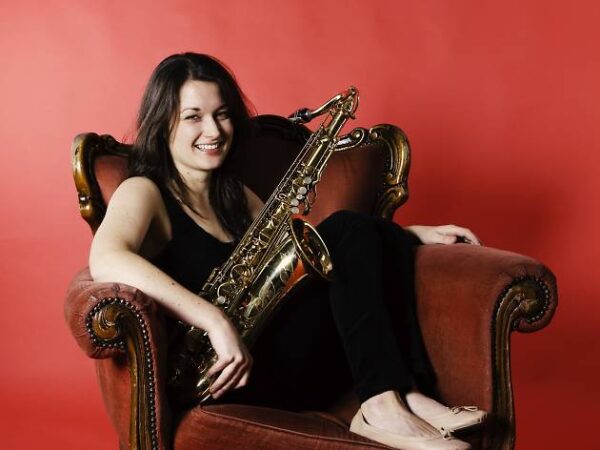
Livestream Jazz from the Boileroom, Guildford, Tuesday 26 January 2021
In collaboration with Guildford Jazz
Trish Clowes saxophone, Ross Stanley Rhodes keyboard, Chris Montague guitar, James Maddren drums
American writer Whitney Balliett coined the phrase ‘the sound of surprise’ more than sixty years ago. It’s served as an apt epithet for jazz ever since, never more so than today when surprises of any kind are in such short supply and so desperately needed to break the tedium of lockdown. Thankfully, Trish Clowes presented surprises in abundance with a ninety-minute livestream of original compositions, some newly minted, with her band My Iris from the Boilieroom in Guildford on Tuesday 26 January, the second such event promoted by Guildford Jazz in collaboration with Jazz in Reading.
The opening number took shape from a gentle, ‘round-the-houses’ meander before James Maddren hit the groove. Once in motion, ‘Lightning Les’ simply grew from the subtle interplay between the individual musicians and the varying depths of texture and sound colour they drew from their respective instruments. As if in defiance of its title, this tune was full of space and in no particular hurry. There was a lovely, very brief, moment when Trish used the ‘slap-tongue’ technique to perfect effect.
‘A View With a Room’, a product of the most recent Lockdown and here receiving its ‘World Premiere’ instantly grabbed the attention and set the toes tapping with an insistent bass line from Ross Stanley’s Rhodes keyboard. Chris Montague added to the fun with his funky edged guitar. It was the sort of number that you felt could go on for ever with endless possibilities for invention.
I loved the reflective opening to ‘Time’, another new piece, and given that it received its first outing during the brief sound check ahead of the gig, it worked surprisingly well – testimony to the musicianship of all the guys in the band!
In the absence of any other thoughts, Trish may have felt obliged to settle for ‘No Idea’ as the title for her next piece. But, in fact, exactly the opposite proved to be the case. A veritable stream of Ideas bounced back and forth across the bandstand, blasting away the constraints of Lockdown. Great fun!
‘Abbott & Costello’, inspired, not as you might expect, by the comedy duo of Hollywood renown, but two characters in Denis Villeneuve’s science fiction film ‘Arrival’, was without doubt, the highlight of the evening for me. Though Trish names Wayne Shorter as a key influence on her sound and approach to music, this haunting piece and her sparse, achingly beautiful tenor, reminded me of the late Bobby Wellins and his classic collaboration with Stan Tracey, ‘Starless and Bible Black’. Sheer perfection!
‘Amber’, brought a distinct change of mood, with a sound portrait of Amber Bauer, the founder of the charity Donate4Refugees, that captured the energy and dynamism that Trish so clearly admires in this particular lady.
‘Free to Fall’ brought the gig to a thrilling close. After a delicate, hymn-like introduction, it gathered pace, soon reaching a ‘free for all’ of intensity propelled by James Maddren’s drums and cymbals, before turning full circle and ending with a run of barely discernible staccato notes from Trish’s tenor … and silence.
Marianne Windham, the guiding light of Guildford Jazz, rounded off the evening with an entertaining Q & A session, based on questions submitted by viewers during the livestream – the sort of things fans like to ask musicians after the gig in the bar, though in this instance without a pint in hand. With a microphone a-piece, everyone was able to join in, talking about their introduction to jazz, key influences, the characteristics of their instruments and the range of activities that have occupied their time during lockdown – baking, gardening, composing, teaching, recording, DIY and model making for young sons etc. etc.
Trish also explained how My Iris came to be the band name – why not simply ‘The Trish Clowes Quartet? It was one of those seemingly chance coming-togethers of her grandmother’s name and the variety of shades, tones and textures of colours one might find in the iris of the eye and she seeks to express through her music; an aim in which she succeeds brilliantly.
Having been required to wear a mask throughout the performance, James Maddren made a telling comment, which neatly summed up the evening. ‘Behind this mask,’ he said, ‘there’s a very happy face!’
Hear, Hear! Livestreaming, is indeed, a welcome innovation, and given the production values of the Guildford team, it is the next best thing to a live performance. All praise to Marianne Windham and her technical colleagues Dom and Beth of the Boileroom.
Trish Clowes’ most recent recorded offering is available as a download via https://trishclowes.bandcamp.com/album/my-iris
Review posted here by kind permission of Trevor Bannister
Alan Barnes & Dave Newton Quartet

Livestream from The Boileroom, Guildford, Tuesday 12 January 2021
In collaboration with Guildford Jazz
Alan Barnes saxes | Dave Newton piano | Marianne Windham bass | Matt Home drums
Even in the best of times promoting a jazz concert is a risky business. As a seasoned hand once remarked, ‘Running your own airline, football club or jazz club, are the best ways I know of losing money.” So, what would motivate anyone to promote a concert in the middle of a pandemic, the world’s worst health crisis in living memory? Someone, I would suggest, who is either mad, or an individual possessed of such personal qualities, that obstacles are swept aside by a tide of infectious enthusiasm, grit and determination, not to mention a love for the music that transcends the constraints of bureaucracy and perceived wisdom.
We are fortunate beyond belief in that Marianne Windham, the dynamo at the hub of Guildford Jazz, is such an individual and that her vision came to fruition on Tuesday 12 January with the livestreaming of the Alan Barnes & Dave Newton Quartet from the Boileroom, Guildford. In the process she enlisted the help of Berkhamsted Jazz, Chichester Jazz and Jazz in Reading to spread the word, with the result that 356 jazz-starved fans, spread as far afield as Portugal, tuned into the respective devices to enjoy a magnificent evening of jazz.
That said, I endured a faltering start to my first encounter with the world of livestreaming (Did anyone else have a problem locating the minute ‘play’ button?). My patience was repaid by the eventual appearance of Alan Barnes on my PC screen and the exquisite sounds of his alto saxophone. I had of course, missed the introduction, but the tune sounded like an interpretation of Dave Brubeck’s ‘In Your Own Sweet Way’.
As Alan swapped his alto for his clarinet, I settled back to enjoy the gently swinging ‘Estate’, from the pen of the late Bruno Martino, and to ‘embrace’ the new experience of livestreaming. I have to say that it was the nearest thing I can imagine to a live gig. Even allowing for the on-stage social distancing, the atmosphere came close to capturing the late-night intimacy that we like to think inspires great jazz. With no need for the cameras to cut to the audience for their reactions, often so distracting on televised concert performances, you could focus entirely on the musicians. I would like to have seen Marianne on bass and her rhythm partner, drummer Matt Home, favoured with a little more light and sound, but was knocked out by the over-the-shoulder close ups of Dave Newton in action at the piano – a feast, I am sure for afficionados of the instrument. Dave really is an orchestra in his own right; an amazing player with a magic touch, who combines elegance and subtle invention with powerful swing!
Alan’s baritone sax enjoyed its first outing of the evening and filled the Boileroom with its huge sound on ‘Ellingtonian’ Johnny Hodges’ ‘First Klass’, a tightly-grooved number with the sparkling effervescence of the Swedish beer it was named after. The wonderfully atmospheric ‘Chelsea Bridge’ paid tribute to, and bore the spirit of two other Ellingtonians, composer Billy Strayhorn and tenor saxophonist Ben Webster, whose breathy solo graced the original recording of the number.
Next up, came the surprise item of the evening – a Dave Newton inspired re-working of the jazz standard ‘Out of Nowhere’. Based around the merest hint of the familiar James Bond theme tune and underpinned by the rich tones of Marianne Windham’s bass, its gentle humour proved to be an absolute delight.
By contrast, switching back to alto, Alan expressed the heartfelt melancholy of ‘Spring Can Really Hang You Up The Most’ to great effect, before taking flight on Art Pepper’s scorching ‘Chili Pepper’, complete with a powerhouse drum solo by Matt Home, to bring the gig to a close.
Marianne rounded of the evening with a short Q & A session from a bank of questions submitted by text and email during the course of the evening. We learnt that Alan had been busy writing throughout Lockdown and that his ‘David Copperfield Suite’ was near completion. With Dave Newton assuming the role of Mr Murdstone and Bruce Adams as Mr Micawber, this will be something to look forward to. Dave Newton had been walking his dog and had composed two tunes, while Matt Home had spent time gardening and cooking. When asked, ‘Has Lockdown revealed any positives?’ Matt quickly responded by saying, ‘Yes, I don’t have to fight with the audience to get my drums out at the end of a gig!’
Asked to nominate a musician deserving of wider recognition, Alan replied without hesitation. ‘Mark Nightingale,’ he declared. And what would be the first tune that he would play once we emerge from Lockdown – what else but, ‘Happy Days are Here Again’.
And on that optimistic note, a brilliant evening drew to a close and the musicians could retreat to the bar for a well-deserved pint. All praise to them and Marianne Windham and her technical team for keeping the spirit of jazz alive in these uncertain and troubled times. The audience response spoke for itself in sheer numbers, a few technical glitches to overcome for next time, but otherwise this was truly an event to savour. When’s the next livestream?.
Review posted here by kind permission of Trevor Bannister
Finding Home: Kate Williams’ Four plus Three meets Georgia Mancio
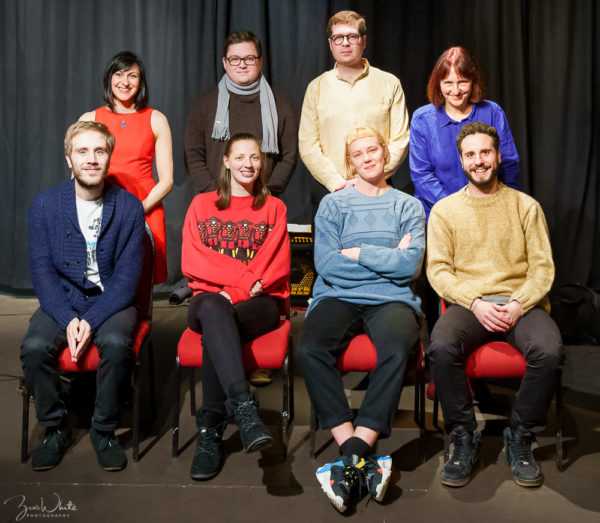
Progress Theatre, Reading, Friday 6 March 2020
Kate Williams piano/composer, Georgia Mancio vocals/lyrics, Conor Chaplin bass, David Ingamells drums, John Garner and Marie Schreer violins, Jenny Ames viola, Sergio Serra cello
Let’s shout it from the rooftops, ‘Finding Home’, the fruit of a long-standing creative partnership between the kindred spirits of pianist/composer Kate Williams and vocalist/lyricist Georgia Mancio, is an absolute triumph. “We wanted to take a concept,” Mancio explained, “that deals with the brutal realities or our world and through a collection of songs, old and newly written, turn it into something positive.” The alchemy of the performance at Reading’s Progress Theatre on Friday 6 March achieved exactly that: an affirmation of the inextinguishable light of the human spirit.
‘Finding Home’ tackles a theme of universal proportions with candour and sensitivity and succeeds magnificently in its appeal to the heart, the mind and the spirit. One member of the audience spoke afterwards of how he relished the atmosphere of peace and relaxation that the combination of instruments engendered: the perfect antidote to weeks of stressful activity at work. Another spoke of how “beautiful and moving” she found the performance and “how wonderful and refreshing to see women represented in jazz. And even better – leading the show.” Applause, I noted, was muted throughout the evening. Not for any lack of enthusiasm, but rather in respect for the performers and perhaps a fear that such exuberance might break the spell that held us all in its trance. The emotional release came fittingly after the final number, when a storm of applause threatened to lift the roof off the Progress.
The superb acoustic of the theatre, enhanced with a minimum of amplification for Conor Chaplin’s bass and Georgia Mancio’s voice, meant that we could hear each instrument with perfect clarity and a natural balance. What a joy to hear Kate Williams’ moonlight touch on a ‘real’ piano, and to sense the empathy between her trio members – the heartbeat of Chaplin’s bass and the uncluttered swing of David Ingamells’ percussion. And I thrilled to see the string section at work at such close quarters and to share their sense of repose in the passages when they were ‘laying out’ from Williams’ exquisite arrangements.
Georgia Mancio proved to be the ideal travelling companion as she led the journey to explore the illusive nature of ‘Finding Home’. The crystal-clear diction and the light, airy qualities of her voice which so impressed the Progress audience on a memorable evening four years ago, have grown in expressive maturity, while her remarkably subtle gifts as a lyricist lent themselves perfectly to the quest.
Lest anyone think that this was an evening of po-faced intensity, I should say that it began with a moment of confusion and great hilarity. The band mistook their entry cue and midway into his introduction, a surprised MC, Jim Wade, found himself surrounded on stage. ‘We should rename the band,’ he suggested. ‘Kate Williams’s Four plus Three add one, meets Georgia Mancio.’
Georgia Mancio’s warm vocal tones and the comforting embrace of the strings plus trio provided the reassurance of a safe passage on the opening number ‘The Journey Home’, a beautiful composition and one of two written in a collaboration between Mancio and the American based/New Zealand born pianist Alan Broadbent and recorded on their ‘Songbook ‘album.
‘Moon and Sand’, once a hit in the 1940s for the ‘King of the Rhumba’ Xavier Cugat, presented a bitter/sweet reflection on the magic of love, a sentiment captured to perfection in Mancio’s whistled chorus which brought the tune to wistful close. Antonio Carlos Jobin’s ‘No More Blues’ (Chega de Saudade), reputedly the very first bossa nova, sustained the mood of gentle nostalgia and rumination. The highlights – Kate Williams’ coruscating piano and the propulsive organ-like string passage.
‘Tell the River’, also from the Mancio/Broadbent ‘Songbook’ explored the darker territory of the ‘real world’; how a chain of events following an alleged traffic violation inexorably combined and led to the death in police custody of Sandra Bland, a young African-American woman of 28, in Waller County, Texas in 2015. Set against a bleak background, Mancio’s emotionally charged lyrics, dared to imagine how Bland’s life, cut short in brutal circumstances, might have been.
By contrast, the instrumental excursion ‘Walking Up’, a Bill Evans composition from his 1962 album ‘How My Heart Sings’, simply oozed with good spirits, while ‘Finding Home’ achieved a remarkable sense of tranquility, enhanced by Marie Schreer’s wondrous violin solo. ‘One for the Bees’, an electrifying Williams/Mancio composition, brought the first set to an electrifying close, a timely reminder of how these small creatures are essential to our world and wellbeing.
The intensely moving ‘Don’t Go to Strangers’ opened the second set with Georgia Mancio accompanied by Jenny Ames on viola, and Sergio Serra, the cello. There followed the most amazing monologue one could imagine; Mancio’s vivid description of a dream journey. It begins as a gentle morning walk in familiar territory, but quickly assumes a different mantle – one footstep follows another in endless repetition to where? No destination is ever in sight. The import of what she is saying takes a while to sink in. Then the penny drops. We are listening to the voice of the multitude, those, who for varied reasons, many way-beyond their control, deep, seek a new home and refuge far from the place where they were born – sometimes with family members, more often than not, alone.
This disquieting prelude led to the core of ‘Finding Home’; three songs by Williams/Mancio – ‘The Last Boy on Earth’, ‘Halfway’ and ‘Walk’, brilliantly arranged and performed with heartbreaking authenticity, using the full resources of the lyrics and ensemble to depict the harrowing, yet awe-inspiring personal testimony of three child refugees.
‘How Deep is the Ocean’ followed, its lyrics affirming the enduring power of love in a way that Irving Berlin could never have envisaged. And so finally to ‘Play’, an elegy by Williams/Mancio for those loved ones we have lost – a fitting and beautiful ending to a unique and unforgettable evening. WOW!
Readers may like to find out more about Safe Passage child refugee charity on www.safepassage.org.uk
As ever, thanks to the Progress House Team for their warm hospitality, the excellent quality of sound and lighting and for ensuring that the event ran so smoothly.
Review posted here by kind permission of Trevor Bannister
Photo by Zoë White Photography
Xhosa Cole Quartet
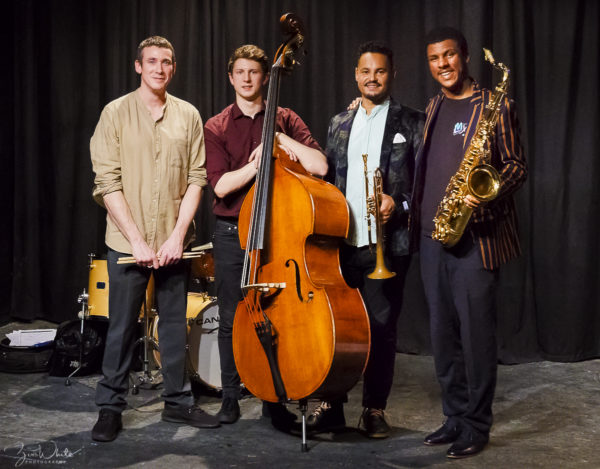
Progress Theatre, Reading, Friday 31 January 2020
Xhosa Cole tenor saxophone, Jay Phelps trumpet, James Owston bass, Jim Bashford drums
The full house generated a palpable sense of anticipation. Tickets for the first Progress gig of the year, and indeed, a new decade, had sold out a week in advance and on the night, we bore witness to that rare phenomenon, a queue waiting in vain at the box office for returns. Such was the interest in Xhosa Cole, 2018 BBC Young Jazz Musician of the Year, winner of the 2019 Parliamentary Jazz Award for Newcomer of the Year and a high scoring nominee in the 2019 British Jazz Awards and his appearance on the Reading leg of a national tour.
To our delight we soon discovered that Xhosa’s astonishing musical talents are matched by his ebullient spirits, engaging personality and sartorial elegance. Aided and abetted by the dazzling assurance of Jay Phelps on trumpet and the brilliant rhythm team of James Owston on bass and drummer Jim Bashford, he set the audience alight with a perfectly balanced programme, breathing fresh life into the genius of past creations undeservedly consigned, through either chance or changes in fashion, to the furthest recesses of the jazz vaults. How often do we hear titles from Woody Shaw, Fats Navarro, Dexter Gordon or Ben Webster, or even, for that matter, Thelonious Monk or Dizzy Gillespie? Add to the mix an original from James Owston and Cole’s own highly idiosyncratic arrangements of two standards and all the ingredients were in place for a great evening.
What’s more, the absence of a chordal instrument meant that there could be no hiding places in this band. Needless to say, everyone stepped up to the mark and the band sparkled with the remarkable interplay between the respective musicians, an immediately impressive feature of the opening number ‘Moontrane’, composed by the late and much lamented Woody Shaw and the title track on his third album recorded in 1974. The jubilant unison tones of Cole’s tenor and Phelps’ trumpet, over the clean-cut rhythms of Owston and Bashford, lifted the hairs-on-the-back-of one’s-neck. Rather than following the theme with a string of solos in the conventional manner, the band adopted a more conversational approach with the lead bouncing back and forth between the players. An array of interjections and subtle prompts kept the music in motion, and the musicians firmly on their toes as things headed-off in unexpected directions. To borrow a phrase from American writer Whitney Balliett, we were enthralled by ‘the sound of surprise’.
‘Moontrane’ segued seamlessly into the straight ahead swing of ‘Salute to the Bandbox’, another memorable Woody Shaw composition, underpinned by James Owston’s gorgeous walking bass.
Tragically, Woody Shaw’s light shone but briefly in the jazz firmament. The career of John Birks ‘Dizzy’ Gillespie, on the other hand, grew in stature over the course of seven decades from the ‘enfant-terrible’ pioneer of bebop to an elder statesman of jazz revered across the world. He loved exotic rhythms and surely would have taken delight in Jim Bashford’s irresistible drum conflagration that kept toes tapping and heads nodding throughout ‘And Then She Stopped’. Pure magic!
Fats Navarro rivalled Gillespie as the ace bebop trumpeter of the late 1940s, but like Woody Shaw thirty years later, the ravages of drug addiction brought his life to an early close. Jay Phelps paid tribute to Fats with a beautiful interpretation of ‘Nostalgia’, a Savoy recording from 1947. Taken much more slowly than the original, and with the sensitive support of Owston and Bashford, Jay used his incredible range to draw every ounce of emotion from Navarro’s composition, leaving wistful thoughts of what might have been.
James Owston shared what Xhosa described as the ‘fun and games’ of the ‘Great British Bake Off’. In other words, he was also a finalist in the 2018 BBC Young Jazz Musician competition. And rightly so. He is a fine writer as well as brilliant bassist. His composition, ‘Deep Blue’ provided the launching pad for a wonderfully inventive flight of ‘free’ collective improvisation. Isn’t it amazing how today’s young musicians, not only express themselves with such breath-taking technical ability, but dip into all the genres of jazz music without batting an eye lid; a welcome far cry from the fiercely contested days of ‘Mouldy Fygges’ and ‘Modernists’. As if to affirm this openness of spirit, Xhosa rounded off the first set with ‘Cheesecake’, a nicely laid-back swinger from tenor giant Dexter Gordon recorded for Blue Note in 1962.
Jim Bashford’s parade ground drum rolls summoned the band back into action for the second set with a final offering from the pen of Woody Shaw – ‘Zalta’; an exhilarating outing, bursting with rhythmic complexity before turning full circle to close on the gradually fading march-like figures of Bashford’s snare drum.
The show-tune ‘Manhattan’, the first hit for the song-writing team of Rodgers and Hart, instantly brings to mind the melodic splendour of the ‘Queen of Song’ Ella Fitzgerald. Xhosa, on the other hand, chose a very different path in which to interpret the song; in paring it down to a bare skeleton he was perhaps closer to the sardonic sentiments of its lyrics than Ella’s celebrated recording. The ‘paradoxical beauty’ of Thelonious Monk’s ‘Reflections’ offered a similar challenge, while shed of its Disney sentimentality ‘When You Wish Upon a Star’ emerged in a completely new light and an apt dedication to the plight of the homeless, whose cause, Xhosa is proud to espouse.
It hardly seems possible that 29th August 2020 will mark the centenary of Charlie Parker’s birth and that on 12th March sixty-five years will have passed since his death. He packed a lot of music and lots of largely self-destructive living into his all-too-short time on earth, but such was his genius that his legacy lives on with enduring power. The delightful ‘My Little Suede Shoes’, first recorded for Norman Granz in 1951, proved to a be a perfect tribute to Bird, expressing the wit and charming appeal of his personality all too often obscured by the ugly features of his life.
Ben Webster’s hard-swinging blues ‘Better Go’ rounded things off as the encore to an exhilarating evening. And should there be any naysayers who doubt the future of jazz, catch this band while you can on the remainder of its tour or at this summer’s Swanage Festival. You won’t be disappointed! We wish Xhosa every success for the future with the quartet and varied other projects and look forward to him soon cutting an album with this exciting band.
As ever, thanks to the Progress House Team for their warm hospitality and for the excellent quality of the sound and lighting.
Review posted here by kind permission of Trevor Bannister
Photo by Zoë White Photography
Alan Barnes Octet: “A Jazz Christmas Carol”
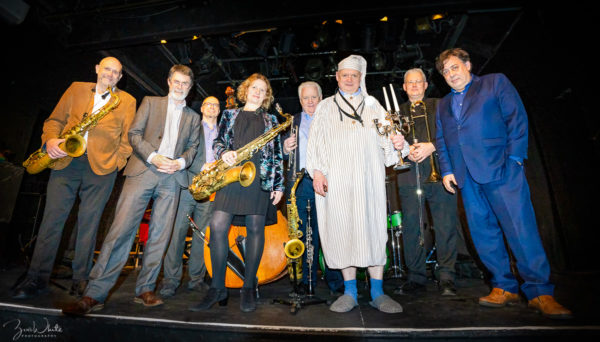
Progress Theatre, Reading, Friday 20 December 2019
Alan Barnes alto saxophone, clarinet, bass clarinet, composer, arranger
Bruce Adams trumpet, flugelhorn
Mark Nightingale trombone, arranger
Karen Sharp tenor saxophone, baritone saxophone, clarinet
Robert Fowler tenor saxophone, baritone saxophone, clarinet
David Newton keyboard
Simon Thorpe bass
Clark Tracey drums
Literature has often inspired jazz composers – John Dankworth brought us ‘What the Dickens!’, Ellington wrote ‘Such Sweet Thunder’ to commemorate Shakespeare. Many compositions evoke characters – real or imagined; Benny Golson’s ‘Killer Joe’ adds a spoken description of that ‘hip-cat’ on the original Jazztet recording. Alan Barnes added to the tradition with ‘A Jazz Christmas Carol’.
Jazz in Reading offered a seasonal delight with his version of Dickens famous story (with a bonus – jazz versions of carols and traditional holiday songs). A prolific composer, arranger, and performer, Barnes narrated extracts of the tale before each section of the suite ( but with his trademark gags and contemporary comments on the text).
In Dickensian nightshirt and cap, Barnes entered the stage for the curtain raiser, a medium tempo ‘God Rest Ye Merry Gentlemen’, featuring a dazzling solo from Bruce Adams on trumpet.
Opening the suite itself, ‘The Start of It’ was a slow minor theme in an attractive arrangement. Clarinets alternated with trumpet and trombone, and the piece was introduced by bowed bass.
Scrooge’s verdict on Christmas provides the theme for ‘Bah Humbug’. Karen Sharp’s baritone voiced the quote, at times in unison with Simon Thorpe’s bass. The first piece with several solos, we heard Robert Fowler on tenor, Bruce Adams’ trumpet, and Alan Barnes on clarinet. (Switching between swing and latin, the arrangement recalled another Ellington work, the Latin American Suite).
Clark Tracey’s drum intro to ‘Marley’s Ghost’ conjured up the rattling of chains. The band created a menacing mood, as Mark Nightingale on muted trombone played a fine solo.
Scrooge’s next visitation, ‘The Ghost of Christmas Past (Portrait of Belle)’ was dedicated to his one time fiancee. Karen Sharp joined the narration as Belle, before atmospheric solos from tenor, trombone and alto. Alan Barnes’ alto solo included Hodges-like portamento, while the scoring for baritone sounded as expressive as Harry Carney.
‘The Ghost of Christmas Present’ materialised as a calypso, the distinctive rhythm introduced on drums. We heard an ingenious arrangement with key changes, call and response, changes of mood, as well as superb solo work. The sinister grandfather clock of the story rang out from David Newton’s piano.
After a nod to ‘Tiptoe Through the Tulips’ (a hit for his namesake), we met ‘Tiny Tim’: a lovely, memorable melody, with a ‘wrong’ note. Karen Sharp played the poor child in this jazz waltz. A change of metre led into a solo from David Newton, then an ensemble with trumpet lead.
As Scrooge visits the graveyard to see the future, ‘The Ghost of Christmas Yet to Come’ saw the first outing of the evening for Alan Barnes sonorous bass clarinet. In an appropriately melancholy mood, the varied textures (bass clarinet with either bass, two clarinets, or drums) reminded us of Ellington’s New Orleans Suite.
‘The End of It’ reprised the suite’s themes through a ‘redemptive’ brass sound, echoing Scrooge’s own change of heart. The baritone sax quoted ‘Bah Humbug’ to complete the medley.
Short solos from each of the band completed the suite’s final selection, ‘God Bless Everyone!’, an upbeat, medium tempo number. Clark Tracey soloed with a ‘Jingle Bells’ quote, before the optimistic mood of key changes in the final choruses.
The Progress audience clearly much enjoyed Mark Nightingale’s extended solo on his feature ‘The Christmas Song’. We were also treated once more to Alan Barnes bass clarinet, both in scoring with two clarinets and muted trumpet, and reprising the theme.
A reading from the Bible – perhaps a first for Jazz in Reading – set the scene for ‘We Three Kings’ . Alan Barnes interpreted the gift of gold, Karen Sharp frankincense (or, according to the narrator, Frankenstein), and Robert Fowler myrrh. Over an arrangement in the spirit of Coltrane’s ‘My Favourite Things’, a virtuoso alto solo segued into Karen Sharp’s tenor, then Robert Fowler’s baritone.
Following Charles Mingus’ tradition of interpolating one song with another, the band’s version of ‘Santa Claus is Coming to Town’ sneaked in ‘Blue Monk’ (surprisingly, a close fit).
Although Jazz in Reading has given us big and medium size bands before, rarely have we heard a band with such a variety of textures (exploiting of course, the band’s multi-instrumentalists). Clarinets can sometimes sound awkward in a ‘modern jazz’ context, but here they worked as beautifully as they do in Ellington. Many combinations of brass and woodwind, as well as superb solos, vividly recreated the varied moods of Dickens’ story.
Sincere thanks to the Progress Theatre for hosting, to all the Progress team for sound, lighting, and front of house, to our Jazz in Reading team, and the appreciative audience.
Review posted here by kind permission of Clive Downs
Photo by Zoë White Photography
Stuart Henderson Quintet celebrates Blue Note
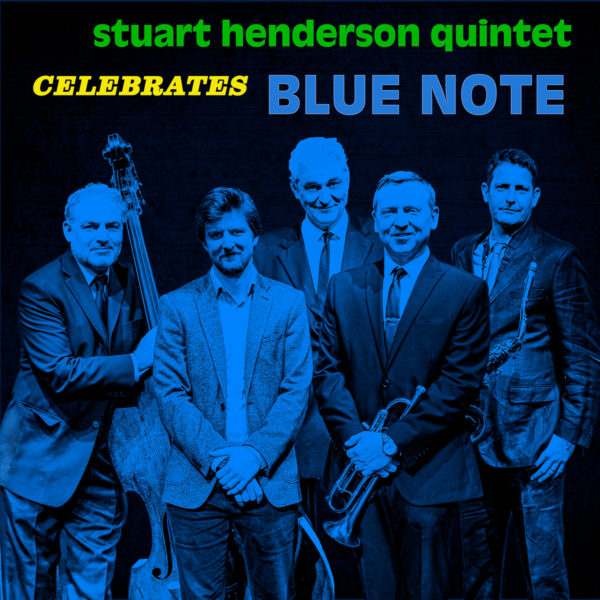
Progress Theatre Reading, Friday 22 November 2019
Stuart Henderson Quintet: Stuart Henderson trumpet & flugelhorn, Ollie Weston tenor saxophone; Tom Berge keyboards, Raph Mizraki bass, Simon Price drums
‘Blue Note: A Modern Jazz Story’ Written & Directed by Julian Benedikt
Like a classic Blue Note album cover, Zoë White’s accompanying image (see above) beautifully encapsulates the spirit and atmosphere of the Jazz at Progress double-headed tribute to mark the 80th anniversary of the Blue Note record label; an amalgam of the label’s distinctive sound as presented by Stuart Henderson’s Quintet and the visual images and voices of the label’s glorious roster of protagonists depicted in Julian Benendikt’s documentary. Above all, the evening paid homage to the enduring genius of Alfred Lion, a Jewish émigré from Germany who founded the label in 1938 as a practical expression of his love for the blues. He presided over every Blue Note session until the label was sold to Liberty Records in 1966. Musician after musician recounted in the film that Lion could neither dance or keep time, but they marvelled at his innate sense of ‘Schwing’ and when a beaming smile lit up his face, they knew they had hit the groove. He just knew when things were right.
He was quick to pick up on innovative talent and to encourage original writing, providing both Thelonious Monk and Bud Powell with their first recording opportunities as leaders. When 22-year-old Herbie Hancock arrived in New York in 1963 to meet Lion at his office, armed with two blues and a standard as an offering for a prospective debut album, Lion dispatched him to come up with some original material. The result – ‘Takin’ Off’ and a hit title in ‘Watermelon Man’.
By 1954 Alfred Lion had aligned a team of supreme talents to work the alchemy of producing jazz records: photographer and business partner Francis Wolf, the fastidious New Jersey based recording engineer Rudy Van Gelder, who had transformed his parents home into a recording studio, and the remarkable graphic designer Reid Miles, who designed the most outstanding of album covers but had absolutely no interest in the contents; he exchanged the records for classical albums. Blue Note had entered its classic period – cutting edge music that honestly expressed the identity of African-American society at that time. It was firmly rooted in the jazz heritage of blues and gospel, and at Alfred Lion’s insistence would always ‘schwing’, but so challenging that it veered towards the avant-garde.
Lion paid his musicians well. Trumpeter Freddie Hubbard used his first pay cheque to buy two new suits and a car. Perhaps, even more importantly, unlike most other record labels, he paid them to rehearse, so that the music was perfectly prepared in advance of the recording.
The same might be said of Stuart Henderson’s brilliant quintet which enthralled the near sell-out audience for the first half of the evening, presenting an astonishing 11 numbers drawn from the ‘golden era’ of Blue Note between 1954 and 1966. Make no mistake, this was no pale imitation of the ‘real’ thing, this was the ‘real’ thing. Music of the first order, played with impeccable musicianship and charged with an explosive force of emotional power and creative energy. There were times when, if you closed your eyes, you could have been listening to an original recording rather than a live band.
No tribute to Blue Note would be complete without Bobby Timmons’ ‘Moanin’’ and the faithful anthem, mainstay of a thousand jazz compilations opened the set, albeit as a short statement rather than the full- blown tune. Brief it may have been, but Simon Price’s Blakey-ish backbeat couldn’t fail to impress. The band moved quickly on to ‘Blue Minor’ a number by the sadly short-lived pianist Sonny Clark. It bore all the qualities of great ‘hard bop’; an attention-grabbing theme, searing solos and hard driving ‘schwing’. Horace Silver’s ‘Split Kick’, once a feature for Clifford Brown and Lou Donaldson on ‘The Live at Birdland’ album of 1954, set off at an even faster rate of knots and left one in no doubt about the expressive skills of Stuart Henderson on trumpet and Ollie Weston on tenor or the deft support of the rhythm section.
Horace Silver was a composer of tremendous versatility and his pioneering contribution to ‘Fusion’, the funky cocktail of jazz, blues and Latin rhythms is perhaps under-rated. ‘Cape Verdean Blues’ helped to set the record straight, and simply burst with the joyous vigour of a carnival parade. In complete contrast, the brooding combination of Raph Mizraki’s bass and Tom Berge’s keyboard painted an unbearably desolate landscape of loss and regret in their introduction to ‘Autumn Leaves’, from the Cannonball Adderley/Miles Davis 1958 collaboration ‘Something Else’. Stuart Henderson sustained the mood to brilliant effect with his closely miked muted solo, while Berge’s coda, echoed by a final cymbal toll by Simon Price, was full of the pathos of what ‘might have been’.
The introverted tenor style of Hank Mobley was a great favourite of Alfred Lion, another case of him sensing something special about a player that escaped the attention of other listeners. Ollie Weston’s warm toned tenor paid a tribute to Mobley on ‘This I Dig for You’, a fine example of understated swing complemented by a tremendous and deservedly well received solo by Raph Mizraki.
In contrast to Mobley’s seemingly straightforward approach, Wayne Shorter expressed his ideas in a much more angular and abstract manner. Someone was heard to mutter ‘Good luck’ before the band embarked on the tricky configuration of ‘Witch Hunt’. They needn’t have worried. They completed the opening theme in masterful fashion and opened up the number to a string of fabulous solos – Henderson’s incisive trumpet, Weston’s haunting tenor and the economic ‘make every note count’ Fender/Rhodes effect of Tom Berge’s keyboard. And all this, firmly underpinned by Mizraki’s bass and the propulsive drums of Simon Price.
Like Horace Silver, Herbie Hancock could (and still does) operate across the full spectrum of styles from funk to the most extreme avant-garde without ever losing his identity or musical integrity. ‘Dolphin Dance’, from the 1965 album ‘Maiden Voyage’ is one of his most lyrical compositions. The band, with Henderson on flugelhorn, captured the reflective mood to perfection.
‘Moment’s Notice’, from ‘Blue Train’, John Coltrane’s only outing on Blue Note, is that unique thing; a tune of incredible complexity that remains firmly fixed in your mind as the soloists work through all its possible variations. The band, with Ollie Weston to the fore, rose to the challenge magnificently, generating nail-biting excitement in the process.
Alfred Lion’s role in launching the career of organist Jimmy Smith, and in the process setting up a completely new style of jazz expression, was amongst Alfred Lion’s greatest achievements. With Tom Berge switching his keyboard to Hammond Organ mode, he set the groove for one of Smith’s biggest Blue Note hits, ‘Minor Chant’, a soulful number originally recorded with tenorist Stanley Turrentine on ‘Back at the Chicken Shack’.
And so, to the final number of a fantastic set. What else but Lee Morgan’s ‘The Sidewinder’, Blue Note’s greatest hit, and the success of which inadvertently almost bankrupted the company (the dreaded problem of cash flow).
***
As the band cleared the stage and the audience retired for an interval drink, the question came to mind ‘How do you follow that?’ It’s true, nothing could quite match the excitement of the first set, but that shouldn’t diminish the excellence of Julian Benedikt’s 2015 documentary film, ‘Blue Note: A Modern Jazz Story’, screened by kind permission of EuroArts. Presented as a sharply edited montage of archive film clips, with startling visual images of the Blue Note stars at work on the recording sessions captured in perfect detail by the lens of Francis Wolf’s camera, and personal interviews, riding over a soundtrack of Blue Note recordings. It offered fresh insight into the life of Alfred Lion, especially his formative years in inter-war Berlin, where his imagination was first inspired by the posters for Sam Wooding’s All-Black ‘Chocolate Kiddies’ review and later darkened by the growing menace of Nazism.
If at times, the clips were tantalisingly brief, there were wonderful compensations; a full length cut of Albert Ammons and Pete Johnson in a dazzling display of boogie-woogie piano (a reminder that long before he lent an ear to Be Bop, Lion’s passion for jazz and inspiration for making records grew from his affinity with the blues); Freddie Hubbard’s astonishing breath control as he took flight he on ‘Water Melon Man’ on a live date with Herbie Hancock; Tommy Turrentine, Bob Cranshaw and Al Harewood – three stalwarts of the Blue Note label, laughing and joking about Alfred’s inability to dance and his practise of paying by cheque, leaving them with the problem with where to cash it; shots of the label’s pressing plant – witness to the care that went into the production and packaging of each individual record; Lorraine Gordon’s wistful memories of life as Alfred’s first wife as she promised the ‘best seat in the house’ to a prospective customer in the chaos of her office at New York’s ‘Village Vanguard’ jazz club (clearly filmed long before the advent of TicketSource and their like…). She didn’t elaborate on the reasons for the marriage break-up. She didn’t need to. It was clear from the repeated testimony of musicians, jazz writers and his widow alike, that in ‘Alfred’s life, the music always came first’. ‘He wasn’t interested in making hit records or money,’ they would say. ‘Only great jazz.’ In an ocean infested with sharks, Alfred Lion stood out as a true gentleman.
The glorious chapter in the story of jazz documented in ‘Blue Note: A Modern Jazz Story’, may now be fading into the recesses of history, but the music lives on. The indefatigable figures of Sonny Rollins, Wayne Shorter and Herbie Hancock remain active and as creative as ever and its possible to easily download those once elusive albums to a mobile phone at the touch of a button. No doubt you could store the entire Blue Note catalogue on one device? And for those with deeper pockets, there’s always the thrill of seeking an original album and to feast the senses on its sound, the touch of its cover, the visual splendour of the graphics and sleeve notes and the scent of finest vinyl. Blue Note heaven!
Meanwhile, let’s look forward to the Stuart Henderson Quintet cutting an album of Blue Note tracks and making a return visit to Progress for a full gig in the not too distant future. Club promoters and festival organisers please note: the Stuart Henderson Quintet is as tightly organised, exciting and profound as any band operating on the UK scene … Book them now!!!!
***
Thanks are due to EuroArts, the Progress Theatre for making it possible to stage this unique double-headed event and the House Team for the excellent quality of sound and lighting and for the provision and operation of the projection facilities. And of course, special thanks to the audience for such generous and enthusiastic support.
Review posted here by kind permission of Trevor Bannister.
Photo by Zoë White Photography
The Quentin Collins Sextet ‘Road Warrior’ Tour
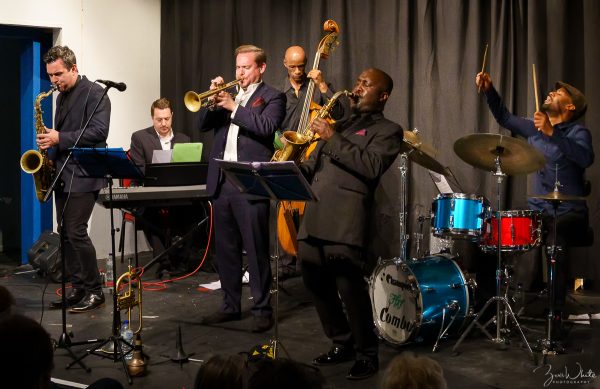
Progress Theatre, Reading Friday 18 October 2019
Quentin Collins trumpet & flugelhorn, Tony Kofi alto saxophone, Branden Allen tenor saxophone, Steve Hamilton keyboard, Larry Bartley bass, Shane Forbes drums
There’s something special about the shoe-box shape of Reading’s Progress Theatre and the intimacy of its stage to the steeply ranked 96-seats of the auditorium that casts its own magical spell and makes it a marvellous venue for jazz. There’s no need for amplification, except for announcements, as each instrument finds its own balance and is perfectly audible within the natural acoustic. The audience can listen in comfort and there are no tinkling glasses or irritating conversations to distract the musicians. In short, the Progress has inspired many great performances throughout its seven-year association with Jazz in Reading, none more so than the breath-taking and utterly compelling visit by the Quentin Collins Sextet on Friday 18 October as part of its national ‘Road Warrior’ tour.
To describe Quentin Collins as a virtuoso is almost a disservice, but I can’ think of another superlative to adequately describe his astonishing technical skill, musicianship and feel for the music. He is the complete trumpet player with a gorgeously burnished tone and an incredible range. He plays with unbelievable accuracy, expresses himself with a true sense of narrative, drawing on a seemingly infinite fund of ideas and can conjure the widest spectrum of sounds imaginable from his instrument without ever having to resort to a mute; a resonant growl at one end of the scale to an almost imperceptible wisp of sound at the other. And as if that wasn’t enough, like a latter-day Art Blakey, he leads his band with such strength and bravura, that his fellow musicians can’t fail to rise to the challenges of the music.
Add to the mix, writing of superb quality – more or less equally shared between Collins himself and his close compatriot Tom Harrison, plus a measure of blues from the great Oliver Nelson and a couple of standards; stir-in the tightest arrangements you’re likely to hear anywhere, honed to perfection on the early legs of the band’s tour and you arrive at a formula that burst into life on ‘Road Warrior’, the title track from Collins’ recently issued 5-star rated album. If the opening number impressed with its scorching solos and explosive ensemble sound, the tortuous ‘Float Flitter Flutter’, a dedication to the late Sonny Fortune, took the breath away with its knife-edge precision. ‘How do they know when to come in?’ asked one member of the audience in wide-eyed amazement during the interval. I guess the only simple answer is to say, ‘That’s the marvel of jazz at its very best!’
The mellow tones of Collins’ flugelhorn over drummer Shane Forbes’ tom-toms and cymbals opened ‘Jasmine Breeze’, its gentle mood sustained by the perfect support of Steve Hamilton on keyboard and Larry Bartley on bass and the haunting solos of Brandon Allen on tenor and Tony Kofi’s alto.
The joyful ‘Look Ahead (What Do You See?)’ took its inspiration from father-and-son conversations in the Collins’ household, and brilliantly evoked a vision of the infinite possibilities that might lay ahead for a ten-year-old boy, with perhaps just a touch of caution on the part of the father, and an ‘Oh, dad’ shrug of the shoulders from the son.
The 12-bar bebop blues ‘Butch and Butch’, from Oliver Nelson’s classic 1961 album ‘Blues and the Abstract Truth’, closed the first set in storming fashion; a pattern of full-blooded riffs building the tension and driving along a string of free-flowing and perfectly executed solos, rounded off by a tour-de-force outing for Shane Forbes on drums. If Steve Hamilton succeeded in reducing the temperature at times, it was never at the expense of excitement. All this, I should add, was underpinned by the rich tones and immaculate bass of Larry Bartley.
The angular ‘Do You Know the Way?’, featuring the soaring alto saxophone of Tony Kofi, got the second set under way, while ‘The Hill’, Tom Harrison’s emotionally charged tribute to the abiding influence of the great saxophonist, composer and educator Jean Toussaint, also served to trace a musical line of descent via Jean from the incomparable Art Blakey – whose ‘message’ is still a potent force today!
Despite its menacing undertones Art would have loved ‘El Farolito’, a high-octane impression of a fight that Tom Harrison had the misfortune to witness on a visit to San Francisco – scorching solos from Brandon Allen and Tony Kofi, while Collins’ provided the automatic gun-fire. A melee of sounds brought the piece to what we hope was a peaceful conclusion.
In complete contrast ‘Wide Horizons’ explored reflective territory with Collins on flugelhorn to a gorgeous background of choral effects which drew to a beautiful ending with the repetition of a sub-theme over Shane Forbes’s drums.
In an evening of surprises there was none greater than the inclusion of ‘Oh, Look at Me Now’, written by pianist Joe Bushkin in 1941 and a huge hit for the Tommy Dorsey Orchestra with a certain Mr. Frank Sinatra on vocal duties. This polished and swinging, medium-tempo arrangement expressed all the feeling of the original and featured the poised and lyrical playing of Tony Kofi on alto and the ‘booting’ tenor of Brandon Allen, as well as brass fireworks from the leader. Shane Forbes’ perfectly timed cymbal chime brought the piece to a close.
Like ‘Oh, Look at Me Now’, Victor Young’s ‘Stella by Starlight’ began life in the 1940s as the main theme for the now long-forgotten movie ‘The Uninvited’. The song, on the other hand, which has always seemed to me perilously difficult to successfully negotiate, has lived on as a favourite for jazz players across the years. In that respect Quentin Collins paid tribute to such legends as Harry James, Charlie Parker, Dizzy Gillespie and Miles Davis amongst many others, to bring an exhilarating evening of music to a fitting close amid the rapturous applause of the near sell-out audience.
As ever, thanks to the Progress ‘House Team’ for their warm hospitality and attention to detail, which all helped to make the music ‘really happen’!
Review posted here by kind permission of Trevor Bannister.
Photo by Zoë White Photography
Mark Lockheart ‘Days on Earth’ – a Jazz In Reading / Bracknell Jazz presentation
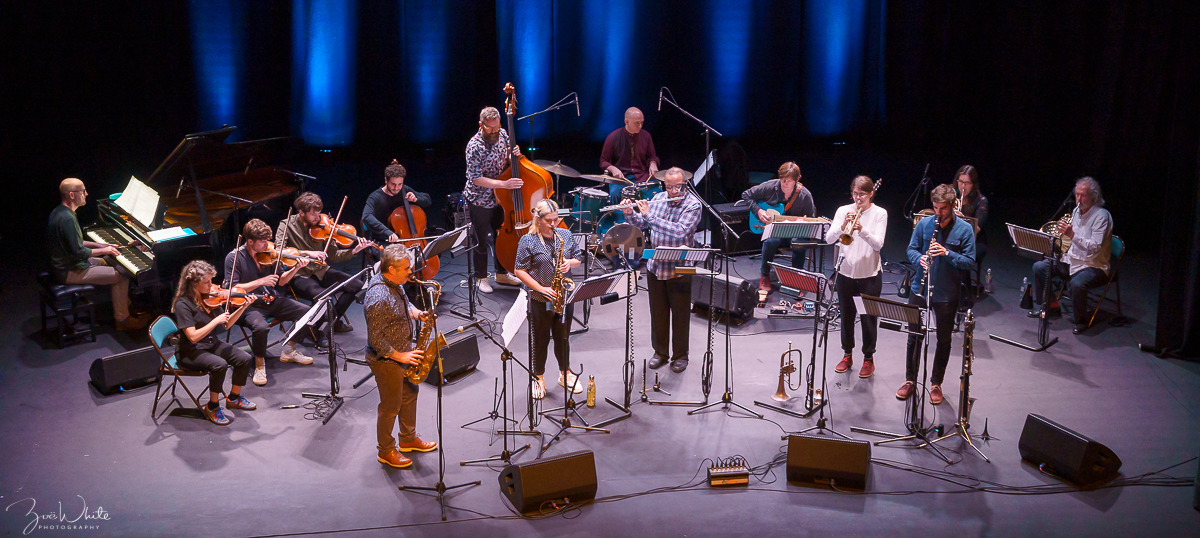
Wilde Theatre, Bracknell, Friday 27 September
Mark Lockheart tenor saxophone, Alice Leggett alto, Laura Jurd trumpet & flugelhorn, Rowland Sutherland flute & piccolo, Sam Rapley clarinet & bass clarinet, Liam Noble piano, Mike Outram guitar, Tom Herbert bass, Sebastian Rochford drums, Jim Rattigan, Anna Drysdale French horns, Emma Smith, Phil Granell, Richard Jones violins, Sergio Serra cello
Finding a performance outlet for any new music, albeit jazz or classical, is notoriously difficult; staging something of the scale and ambition of Mark Lockheart’s ‘Days on Earth’ comprising seven movements, a jazz ensemble, plus a 30-piece orchestra, which first began to take shape in his imagination in 2016, must at times have seemed nigh on impossible. By December 2017, when Lockheart took ‘Days on Earth’ into Mark Knopfler’s British Grove Studio to be recorded in its entirety under the baton of John Ashton Thomas, the project was gaining in momentum. It reached fruition on 9 January 2019 with the launch of the album and a live performance at London’s Milton Court Concert Hall with the Guildhall Studio Orchestra. There remained just one more thing to complete the project … to take ‘Days on Earth’ on the road.
At this moment providence played its hand. Jazz in Reading and Bracknell Jazz had already decided to combine their resources to present a ‘magnum opus’ at the Wilde Theatre, Bracknell; something which would stand apart from the usual gigs they promoted in their respective towns. What better choice than ‘Days on Earth’! But these things are never straightforward. Now faced with the daunting challenge of reducing the size of his orchestra to suit a smaller venue and a reduced budget, would Lockheart succeed in retaining the aural splendour and emotional impact of his original work? We would have to wait until the second half of the concert for that question to be answered.
Meanwhile, as a foretaste to ‘Days on Earth’, Lockheart presented five original numbers with his octet, opening with the intriguing ‘Surfacing’. The first ever performance of ‘Flourescences’ perfectly mirrored the subtle variations in colour and quality of light as it reflects on cut glass, the sharp edges of Liam Noble’s crystalline piano, Rowland Sutherland’s flute and Laura Jurd’s trumpet, contrasting beautifully with the dark shadows cast by Tom Herbert’s bass.
One was simply bowled over by the purity of the sound, especially from the lyrical alto of Alice Leggett, on the John Zorn inspired ‘Dreamers’; another composition making its public debut.
Wraith-like, violinist Emma Smith and bass clarinetist Sam Rapley appeared on stage to augment the octet for ‘Beautiful Man’, inspired by Geoff Dyer’s book about jazz and jazz musicians, ‘But Beautiful’ and the first of two pieces dedicated to Duke Ellington. One could picture Duke and Harry Carney on a road-trip in the depths of the night travelling across America between gigs; Carney at the wheel and Duke lost in thought with a pencil and manuscript paper at hand. Emma Smith’s exquisite violin and the resonant tones of Rapley’s bass clarinet evoked Ellington at his most reflective. ‘My Caravan’, eschewed the hell-for-leather fury of many arrangements for a subtle and gentle re-working of this Juan Tizol classic, much more in keeping with the original recording by the pre-war Ellington orchestra. However, the juxtaposition of old and new interpretations made for a thrilling climax to the first set.
The long-awaited presentation of ‘Days on Earth’ in the second half did not disappoint. I was not alone in declaring that it was an absolute musical triumph, rich in colour, texture, emotional depth and the vitality of the human spirit. Surely, Mark Lockheart now warrants a place in the Pantheon of British jazz composers alongside great figures such as Sir John Dankworth, Graham Collier, the Mikes’ Gibbs, Garrick and Westbrook, Kenny Wheeler and Stan Tracey. This remarkably open and free-flowing piece presented contemporary music at its very finest. It held one’s attention so completely that the 60 minutes of its duration seemed to flash by in the blink of an eyelid.
Lockheart used the addition of clarinet, strings and French horns to generate even more power to the already formidable ensemble, and to weave an ever more intricate tapestry of beautifully blended sounds and rhythms to support individual solo voices, amongst which, Mark Lockheart’s own contributions on tenor sax were outstanding. It was a joyous, and often deeply moving, melting pot of different styles and influences with the metallic blues-soaked guitar of Mike Outram sitting comfortably with the formality of Sam Rapley’s clarinet and the wonderfully inventive rhythmic patterns laid down by Messrs. Noble, Herbert and Rochford. The sound of Laura Jurd’s trumpet briefly muted with her hand, was alone worth the price of the admission ticket.
Lockheart gave away few verbal clues as to what inspired him to write ‘Days on Earth’, but as the titles unfolded, seemingly to emerge spontaneously from one another, we began to form some idea of his motivation – ‘A View from Above’, ‘Brave World’, ‘This Much is True’, ‘Party Animal’, ‘Believers’, ‘Triana’, and ‘Long Way Gone’. In other words, to borrow a sentence from Lockheart’s album sleeve notes, ‘Music is intrinsically linked to life, love, joy, frustration, acceptance and peace and all those feelings are here in this music for me.’
‘Long Way Gone’ stands out for me above all the other movements in ‘Days on Earth’. Born from the pages of Ishmail Beah’s harrowing account of his life as a child soldier in the civil war of Sierra Leone, its joyful optimism left one with the belief that even in the bleakest of moments there is a reason to find hope and to seek peace and reconciliation. Magnificent!
All praise to the technical team at the Wilde Theatre for the excellent quality of sound and lighting and to Jazz in Reading and Bracknell Jazz whose imaginative enterprise made possible this outstanding and unique performance of Mark Lockheart’s ‘Days on Earth’.
The album recording of ‘Days on Earth’ is available on Edition EDN 1120. For more information visit www.editionrecords.com
Review posted here by kind permission of Trevor Bannister.
Photo by Zoë White Photography
The Scott Willcox Ten-Piece Big Band
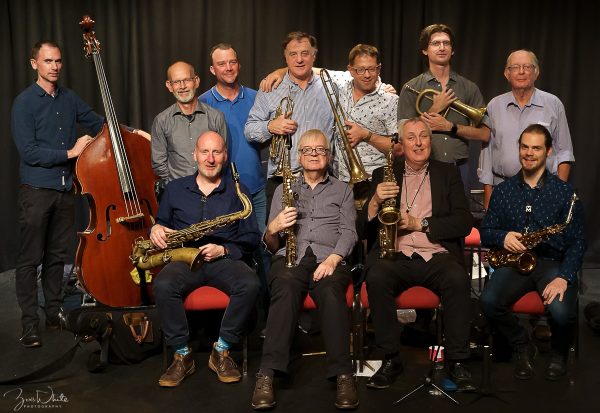
Friday 20 September Progress Theatre, Reading
Scott Willcox directing, Andy Gibson trumpet & flugelhorn, Gabriel Garrick trumpet, flugelhorn & trombone, Martin Gladdish trombone, Julian Costello tenor saxophone, Pete Hurt tenor saxophone & flute, Bob McKay soprano, alto and baritone saxophones & clarinet, Samuel Eagles alto saxophone, Dave Frankel keyboards, Marcus Penrose bass & bass guitar, Gary Willcox drums
Scott Willcox and his ten-piece big band made a welcome return to Reading on Friday 20 September, after an interval of three years, to open a new season of Jazz at Progress with a jaunty arrangement of Carol King’s smash hit ‘I’m Into Something Good’, featuring the rolling piano of Dave Frankel and the dazzling brass of Andy Gibson and Martin Gladdish. Though best known for his exuberant humour, risqué lyrics and hard driving stride piano, Fats Waller could also be a composer of great sensitivity as the band demonstrated to perfect effect with perhaps his most engaging composition, ‘Jitterbug Waltz’, drawing on all the instruments of the ensemble to produce a wonderful cascade of sound.
While ‘Jitterbug Waltz’ paid tribute to an early inspiration in Scott Willcox’s musical career, the atmospheric ‘La Gomera’, a Canary Island dear to his heart, introduced us to a source of his own creative impulses. His writing evoked the stunning contrast between the tranquillity of the island, its black-sanded beaches washed by the Atlantic Ocean and the potential violence of its volcanic origins. Great work here from Gary Willcox on percussion, the plaintive saxophones of Julian Costello and Bob McKay, and the fiery trumpets of Andy Gibson and Gabriel Garrick.
The continent of Africa on the other hand, is not a location that Scott has visited and so the brilliantly conceived ‘African Dance’ was very much an impression of how he imagined it might be. Rich in colour and rhythm, and with each instrument clamouring for attention, it was full of the joyful spirit that gave birth to jazz in the first place.
Dave Frankel’s piano transported us from the vivid sunlight of Africa to the gentle breeze of Brazil in his elegant introduction to the delightful ‘Ask me in Latin (Nolite a me)’, in which the tonal variety achieved by using different instruments in combination was particularly effective.
Wilcox used a similar device in the intriguing ‘Thinking About It’ to create a seemingly infinite number of subtle variations on a basic theme.
‘Song for a Special Friend’ brought a complete change of mood with a deeply moving solo by Bob McKay on soprano saxophone and a coda of heart-wrenching emotion expressed by the trumpets of Andy Gibson and Gabriel Garrick. Brilliant!
‘Slane’, introduced by Marcus Penrose on bass and based on a traditional Irish folk song using the familiar hymnal tune of ‘Lord of All Faithfulness’, maintained the air of reflection. Bob McKay’s soulful playing was once again to the fore, while Gabriel Garrick rounded things off beautifully on flugelhorn.
Gary Willcox’s powerhouse drums set the pace for ‘Bouncing Back’, a challenging number in 5/4 time, featuring a wailing solo from Sam Eagles, which built to a glorious climax to bring the first set to an exhilarating close.
Gabriel Garrick took up the trombone, a new arrival in his instrumental armoury, to join forces with Martin Gladdish and the baritone sax of Bob McKay (transposing ‘on sight’ the original part written for a third trombone!) to open the second set with ‘Can’t Complain’; a number that builds and builds in gripping intensity and leaves you slightly breathless when it reaches its sudden conclusion.
Scott’s approach to music is a far cry from that of Count Basie and yet ‘Second Thoughts’ had the feel of “Li’l Darlin’”, a Neal Hefti arrangement from the classic album ‘The Atomic Mr Basie’, described by one writer as ‘an object lesson in how to swing at a slow tempo’ and by another as ‘an exercise in how to play slow without falling apart’. The Willcox band held its nerve to successfully negotiate the tightrope walk thanks to the languid tenor of Pete Hurt, muted brass and delicate brushwork of Gary Willcox, only giving way to a shout of triumph with a spectacular flurry of high notes from Gabriel Garrick on the final step.
Playing both muted and open horn, trombonist Martin Gladdish took the solo spotlight on the Scott Willcox arrangement of ‘Come Rain or Come Shine’. He held the audience enthralled as he drew every ounce of emotion from the Harold Arlen classic.
‘Regular Fries’ has proved to be a popular item on the menu since the earliest days of the Willcox Big Band, while Irving Berlin’s ‘Puttin’ On the Ritz’’, a number forever associated with the impeccable footwork of Fred Astaire, provided scope for plenty of musical high-jinks – piano a la Les Dawson from Dave Frankel, slurring saxophones, the earthiest growl trumpet you’re likely to hear this side of New Orleans from Gabriel Garrick and a cheeky contribution from Pete Hurt on flute. ‘Make Mine Mambo’ with a declamatory statement from Martin Gladdish and searing alto solo from Sam Eagles, kept up the spirit of good fun, even if the title sounded as if it had been taken from a 1950’s Hollywood ‘B’ movie.
The penultimate number ‘Mixed Feelings’ proved to be exactly that; a haunting and enigmatic composition that perfectly balanced the tension between uninhibited free expression and beautiful lyricism.
‘All Change’, the title track of Scott’s most recent album, brought the evening to a showstopping close and literally brought each member of the band to the tip of his toes in order to meet the challenge of its rapid changes in pace and time. One could only gaze in awe and wonder at the fantastic quality of the musicianship. As one player said afterwards, ‘Great music, but it’s exhausting reading all those charts!’
The Scott Willcox Ten-Piece Big Band opened the new season of Jazz at Progress in splendid fashion and the theatre itself provided the perfect platform in terms of space, atmosphere and acoustics for the originality of Scott Willcox’s writing, brought to life with jazz spirit by world-class jazz musicians.
As ever, our thanks to the Progress ‘house team’ whose warm hospitality and attention to detail ensure that the gigs always run so smoothly.
Review posted here by kind permission of Trevor Bannister.
Photo by Zoë White Photography
